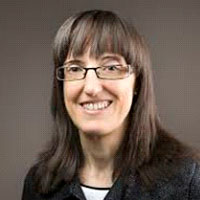Master's Degree in Teacher Training for Compulsory Secondary Education and Baccalaureate, Vocational Training and Language Teaching
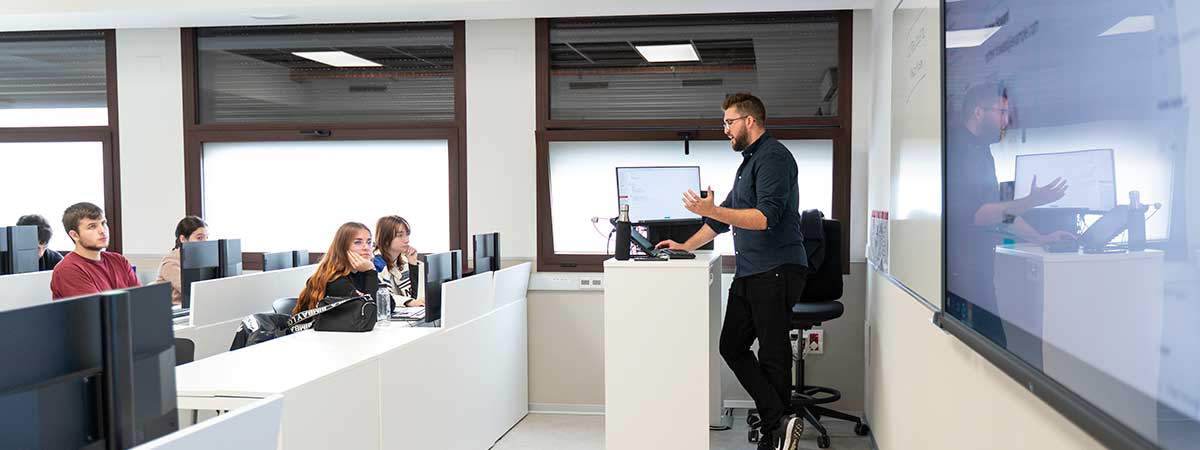
We train future teachers committed to personalized education and innovative methodologies
Official master's degree that qualifies students for the exercise of the professions of teacher of Compulsory Secondary Education and Baccalaureate, Vocational Training and Language Teaching. This Master's degree is aimed at all graduates, architects, engineers interested in teaching in Compulsory Secondary Education, Baccalaureate, Vocational Training or Language Teaching. Our students, future educators, will acquire the pedagogical, scientific and professional skills necessary to work professionally.
The program will be taught in a Blended/Hybrid modality, combining face-to-face teaching with online teaching, supported by the use of ICT, which will support collaborative work (forums, chat, videoconference meeting), to the teacher's presentations (calendar, bulletin board, document folder, links) and to the submission of assignments (task mailbox and assignment tool).
The Master's degree is based on the scientific, academic and professional experience of the Department's teaching staff, and their participation, as visiting professors, in teacher training programs at universities and institutions in various countries.
Read +Nebrija offers you the possibility of choosing between 14 specialties, depending on your degree of origin:
- Mathematics, aimed at the pedagogical training of the Mathematics teaching specialty, which is fundamental due to being an essential instrumental subject in Secondary Education and Vocational Training.
- Experimental Sciences: Physics and Chemistry, specialty aimed at pedagogical training of the Physics and Chemistry teaching specialty.
- Experimental Sciences: Biology and Geology, with a strong presence and demand in Secondary Education and Vocational Training.
- Technology and Information Technology, aimed at pedagogical training of specialties linked to the world of Engineering and Information Technology, present in Vocational Training and Baccalaureate.
- Economics, Business and Commerce, a specialty aimed at training those teaching specialties linked to administrative and business management, with a high presence in Vocational Training and Baccalaureate.
- Hospitality and tourism, aimed at training those teaching specialties linked to the service sector, basically aimed at training teachers who will teach in Vocational Training.
- Health Processes, a specialty aimed at training those teaching specialties linked to the world of health, present, with a highly specialized nature, in Vocational Training.
- Industrial technologies, a specialty aimed at training those teaching specialties linked to the world of Engineering and Architecture, widely present in Vocational Training and Baccalaureate.
- Social Sciences, Geography and History, Specialty aimed at training the teaching specialty of Geography and History, with presence in Compulsory Secondary Education and Baccalaureate.
- Foreign Language-English, a specialty aimed at training the teaching specialties of Language Teaching, specifically English. It is essential, as it is an instrumental subject in Compulsory Secondary Education, Baccalaureate and Vocational Training and Official Languages School.
- Spanish Language and Literature, aimed at training the teaching specialty of Spanish Language and Literature, essential as it is an instrumental subject in Secondary Education and Vocational Training.
- Plastic and Visual Arts, a specialty aimed at the training of drawing teaching specialties, with a great presence in Compulsory Secondary Education and in Baccalaureate.
- Physical Education, a specialty aimed at pedagogical training of the Physical Education teaching specialty, with a large presence in Compulsory Secondary Education and in Baccalaureate.
- Educational Guidance, a specialty aimed at pedagogical training of the teaching specialty of Educational Guidance, which is basic in the work of supporting students and attention to diversity.
Throughout the course, students will participate in 3 workshops and will be invited to different activities organized by the School of Languages and Education, with the aim of reinforcing the abilities, skills and tools for their incorporation into the world of teaching. We train future teachers committed to personalized education, innovative methodologies and the acquisition and development of competences.
Read LessThe meeting featured different professionals who explained their experience and discussed the current situation of the sector and the new challenges that must be faced.
Perfil del alumno:
The preferred admission profile is that of university graduates who develop or want to develop their activity in the field of Secondary education, Baccalaureate, Vocational Training and Language Teaching, and are interested in applying for the vacancies offered in the national public network, or in private educational centers, and with the ability for dialogue, an open mind, a willingness to share and actively participate in the development of the course, as well as the ability to complete the tasks and work indicated on the indicated deadlines.
The University Master's Degree in Teacher Training for Compulsory Secondary Education and Baccalaureate, Vocational Training and Language Teaching will be open to all those applicants who meet the requirements imposed by current legislation, with an associate's or bachelor's degree, who are interested in acquiring specialized training in the field of teaching any discipline or subject taught at the different educational levels and that also meets the requirements of the Admission Test and the basic Skills that are valued therein (described below).
Official Degree:Master's Degree in Teacher Training for Compulsory Secondary Education and Baccalaureate, Vocational Training and Language Teaching
Center responsible:School of Language and Education
Branch of knowledge:Social and Legal Sciences
Openings available: 800
Total Credits 60 credits.
. Minimum of 12 ECTS credits and maximum of 60 ECTS credits per enrollment and academic period.
Academic year in which it was implemented: 2013-2014
Duration: 1 year.
Type of Education: Blended
Academic Regulations: General student’s regulations. Credit transfer and recognition. Regulation of student participation. Common procedures for carrying out the Final Research Project
University Services: [+info]
Internal Quality Assurance System System managers Incidents, Suggestions and Complaints Job placement report and assessment of training received
Collaboration agreement with the Trilema Foundation to participate in teaching innovation projects
Curriculum
All our degrees and curricula have been prepared in accordance with the new guidelines set by current legislation, having already been verified by the National Agency for Quality Assessment.
The student must take 60 credits
Generic Module Subjects according to the areas of knowledge in the academic program
Module subjects 16 ECTS
First semester16 ECTS- 4 ECTS | Educational processes and school reality
- 4 ECTS | Communicative approach and task learning
- 4 ECTS | Psychology and adolescent education
- 4 ECTS | Education, society and educational policy
Practicum Module Subjects of Internships and Final Research Project
Module subjects 18 ECTS
- 3 ECTS | Practicum I
Second semester- 9 ECTS | Practicum II
- 6 ECTS | Final Research Project
Specific Module Subjects of the specialty in which the student is enrolled
Mathematics 26 ECTS
First semester8 ECTS- 4 ECTS | Science and its methodology
- 4 ECTS | Mathematics for teachers of Secondary education, Baccalaureate and VT
Second semester18 ECTS- 6 ECTS | Didactics of Arithmetic and Algebra
- 6 ECTS | Didactics of Geometry, Measurement of Magnitudes, and Statistics
- 6 ECTS | Design of didactic proposals in Mathematics
Physics and Chemistry 26 ECTS
First semester8 ECTS- 4 ECTS | Science and its methodology
- 4 ECTS | Physics and Chemistry for Secondary education , Baccalaureate and VT teachers
Second semester18 ECTS- 6 ECTS | Didactics of Physics
- 6 ECTS | Didactics of Chemistry
- 6 ECTS | Design of didactic proposals in Physics and Chemistry
Biology and Geology 26 ECTS
First semester8 ECTS- 4 ECTS | Science and its methodology
- 4 ECTS | Biology and Geology for Secondary education, Baccalaureate and VT teachers
Second semester18 ECTS- 6 ECTS | Didactics of Biology
- 6 ECTS | Didactics of Geology
- 6 ECTS | Design of didactic proposals in Biology and Geology
Technology and Computer Science 26 ECTS
First semester8 ECTS- 4 ECTS | Science and its methodology
- 4 ECTS | Technology and Computer Science for Secondary education, Baccalaureate and VT teachers
Second semester18 ECTS- 6 ECTS | Didactics of Technology and Computer Science
- 6 ECTS | Didactics of Computer Science
- 6 ECTS | Design of didactic proposals in Technology and Computer Science
Geography and History 26 ECTS
First semester8 ECTS- 4 ECTS | Social Sciences and Education I
- 4 ECTS | Social Sciences and Education II
Second semester18 ECTS- 6 ECTS | Didactics of Geography
- 6 ECTS | Didactics of History
- 6 ECTS | Design of didactic proposals in Social Sciences: Geography and History
Economy, Business and Commerce 26 ECTS
First semester8 ECTS- 4 ECTS | Vocational training in Economics, Business and Commerce
- 4 ECTS | Professional orientation
Second semester18 ECTS- 6 ECTS | Didactics of the Economics
- 6 ECTS | Didactics of the Company and its environment
- 6 ECTS | Design of didactic proposals in Economy, Business and Commerce
Hospitality and Tourism 26 ECTS
First semester8 ECTS- 4 ECTS | Vocational training in Hospitality and Tourism
- 4 ECTS | Professional orientation
Second semester18 ECTS- 6 ECTS | Fundamental aspects of Didactics in Hospitality and Tourism
- 6 ECTS | Learning and Teaching subjects in Hospitality and Tourism
- 6 ECTS | Design of didactic proposals n Hospitality and Tourism
Industrial Technologies 26 ECTS
First semester8 ECTS- 4 ECTS | Vocational training in Industrial Technology
- 4 ECTS | Professional orientation
Second semester18 ECTS- 6 ECTS | Technology and Industrial Processes I
- 6 ECTS | Technology and Industrial Processes II
- 6 ECTS | Design of didactic proposals in Industrial Technology
Health Processes 26 ECTS
First semester8 ECTS- 4 ECTS | Vocational training in Health Processes
- 4 ECTS | Professional orientation
Second semester18 ECTS- 6 ECTS | Aprendizaje y Enseñanza de los Procesos Sanitarios I
- 6 ECTS | Aprendizaje y Enseñanza de los Procesos Sanitarios II
- 6 ECTS | Diseño de Propuestas didácticas en Procesos Sanitarios
Foreign language (English)26 ECTS
First semester8 ECTS- 4 ECTS | Language Teaching and Learning

- 4 ECTS | Educational research and innovation and change management

Second semester18 ECTS- 6 ECTS | Didactics of English Language

- 6 ECTS | Didactics of English Culture

- 6 ECTS | Design of Didactic Language Proposals

Spanish language and literature 26 ECTS
First semester8 ECTS- 4 ECTS | Language Teaching and Learning
- 4 ECTS | Communicative Approach and Task Learning
Second semester18 ECTS- 6 ECTS | Didactics of the Spanish Language
- 6 ECTS | Didactics of Spanish Literature
- 6 ECTS | Design of didactic proposals in Spanish language and literature
Visual and plastic arts 26 ECTS
First semester8 ECTS- 4 ECTS | Theory of Movement
- 4 ECTS | Visual education
Second semester18 ECTS- 6 ECTS | Didactics of artistic education: strategies and methodology
- 6 ECTS | Graphic design and digital art
- 6 ECTS | Design of didactic proposals in Plastic arts
Physical education 26 ECTS
First semester8 ECTS- 4 ECTS | Theory of Movement
- 4 ECTS | Didactics of Physical Education
Second semester18 ECTS- 6 ECTS | Planning and organization of sports activities
- 6 ECTS | Group dynamics and diversity
- 6 ECTS | Design of didactic proposals in Physical Education
Educational orientation 26 ECTS
First semester8 ECTS- 4 ECTS | Personal, academic and professional orientation
- 4 ECTS | Early attention, diagnosis and psychopedagogical intervention
Second semester18 ECTS- 4 ECTS | Educational research and innovation and change management
- 4 ECTS | Tutoring support in the center
- 6 ECTS | Inclusive education and attention to diversity
- 4 ECTS | Educational intervention in learning problems and coexistence
Information of the Subjects
Professors
| Profesores Professors | Porcentaje de Doctores Percentage of PhD holders |
| 148 | 72% |
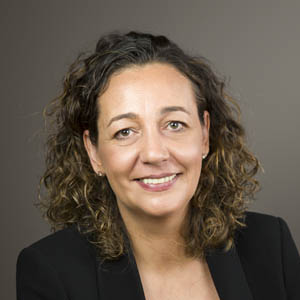 Nuria Camuñas Sánchez-Paulete
Directora del Departamento de Educación
Director of the Department of Education
Doctora en Psicología por la UCM. Acreditada. Máster en Intervención en la Ansiedad y el Estrés (UCM). Licenciada con grado en Psicología (UCM). Directora del Departamento de Educación, Facultad de Lenguas y Educación. Profesora de grado y postgrado en esa misma facultad. Docente de distintos cursos de formación y máster, sobre ansiedad, emociones y educación, estrés, modificación de conducta y dificultades del aprendizaje. Autora de distintas publicaciones y presentaciones en congresos relacionadas con procesos cognitivos, emoción y educación, prevención y control del estrés, etc. Miembro del grupo de investigación CEDI (Cognición, Educación y Diferencias Individuales). Otras líneas de investigación: Cognición, Emoción, Salud y Educación.
Nuria Camuñas Sánchez-Paulete
Directora del Departamento de Educación
Director of the Department of Education
Doctora en Psicología por la UCM. Acreditada. Máster en Intervención en la Ansiedad y el Estrés (UCM). Licenciada con grado en Psicología (UCM). Directora del Departamento de Educación, Facultad de Lenguas y Educación. Profesora de grado y postgrado en esa misma facultad. Docente de distintos cursos de formación y máster, sobre ansiedad, emociones y educación, estrés, modificación de conducta y dificultades del aprendizaje. Autora de distintas publicaciones y presentaciones en congresos relacionadas con procesos cognitivos, emoción y educación, prevención y control del estrés, etc. Miembro del grupo de investigación CEDI (Cognición, Educación y Diferencias Individuales). Otras líneas de investigación: Cognición, Emoción, Salud y Educación.
ncamunas@nebrija.es
 María-Cruz La Chica Delgado
Directora Académica y Profesora de “Enseñanza y Aprendizaje de Lenguas”
Academic Director and Professor of "Language Teaching and Learning"
Doctora Acreditada (ANECA) en Filología Hispánica por la Universidad Complutense de Madrid, Máster en Derechos Humanos por la Universidad Carlos III de Madrid. Es autora del libro Narrativa de tradición oral maya tojolabal (Marcial Pons, 2017), cuenta con siete años de investigación en el extranjero, dos estancias posdoctorales, catorce publicaciones académicas, veintiuna publicaciones literarias y más de veinte conferencias en congresos internacionales. Ha sido profesora de Lengua Castellana y Literatura en ESO y Bachillerato. Sus temas de investigación se sitúan entre el campo de la educación, la literatura (especialmente de la tradición oral) y la antropología, aunque también ha explorado las fronteras entre la antropología y los derechos humanos.
María-Cruz La Chica Delgado
Directora Académica y Profesora de “Enseñanza y Aprendizaje de Lenguas”
Academic Director and Professor of "Language Teaching and Learning"
Doctora Acreditada (ANECA) en Filología Hispánica por la Universidad Complutense de Madrid, Máster en Derechos Humanos por la Universidad Carlos III de Madrid. Es autora del libro Narrativa de tradición oral maya tojolabal (Marcial Pons, 2017), cuenta con siete años de investigación en el extranjero, dos estancias posdoctorales, catorce publicaciones académicas, veintiuna publicaciones literarias y más de veinte conferencias en congresos internacionales. Ha sido profesora de Lengua Castellana y Literatura en ESO y Bachillerato. Sus temas de investigación se sitúan entre el campo de la educación, la literatura (especialmente de la tradición oral) y la antropología, aunque también ha explorado las fronteras entre la antropología y los derechos humanos.
mailto:mlachica@nebrija.es
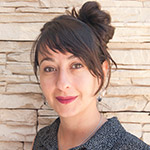 Mónica Méndez de la Calle
Coordinadora de Alumnos y Profesora de “Educación Inclusiva y Atención a la Diversidad”
Student Coordinator and Professor of "Inclusive Education and Attention to Diversity"
Doctora en pedagogía a través del diseño de un plan de intervención para el profesorado de educación infantil con las familias, en favor del desarrollo personal de los niños durante el periodo de educación infantil.
Amplia experiencia en intervención familiar y programas de intervención infanto-juvenil dentro del ámbito social en centro de acogida para menores en la ciudad de Madrid.
Experta en trastornos del neurodesarrollo y programas de intervención en niños y adolescentes dentro del marco de la intervención neurocognitiva y de los problemas de conducta y convivencia derivados.
Experiencia de docencia en los grados de educación infantil y primaria, mención de especialista en audición y lenguaje, mención de especialista en pedagogía terapéutica, máster de necesidades educativas especiales.
Participación en investigación pedagógica en grupo interdisciplinar desde el año 2019 en lo relativo a la acción docente universitaria.
Mónica Méndez de la Calle
Coordinadora de Alumnos y Profesora de “Educación Inclusiva y Atención a la Diversidad”
Student Coordinator and Professor of "Inclusive Education and Attention to Diversity"
Doctora en pedagogía a través del diseño de un plan de intervención para el profesorado de educación infantil con las familias, en favor del desarrollo personal de los niños durante el periodo de educación infantil.
Amplia experiencia en intervención familiar y programas de intervención infanto-juvenil dentro del ámbito social en centro de acogida para menores en la ciudad de Madrid.
Experta en trastornos del neurodesarrollo y programas de intervención en niños y adolescentes dentro del marco de la intervención neurocognitiva y de los problemas de conducta y convivencia derivados.
Experiencia de docencia en los grados de educación infantil y primaria, mención de especialista en audición y lenguaje, mención de especialista en pedagogía terapéutica, máster de necesidades educativas especiales.
Participación en investigación pedagógica en grupo interdisciplinar desde el año 2019 en lo relativo a la acción docente universitaria.
mmendez@nebrija.es
 Manuela Pedregal Valle
Coordinadora Académica de Prácticas y Profesora de “Didáctica de la Geología”
Academic Coordinator of Internships and Professor of "Didactics of Geology"
Doctora en Ciencias de la Educación por la Universidad Autónoma de Madrid. Máster de Formación de Profesorado en Educación Secundaria por la Universidad Alfonso X el Sabio. Licenciada en Ciencias Geológicas por la Universidad Complutense de Madrid con especialidad en Paleontología. Su línea de investigación se centra en la Pedagogía de la muerte en el contexto educativo. Miembro del Grupo de Investigación P.F.C. (Pedagogía, Formación y Conciencia) de la Universidad Autónoma de Madrid. Ha sido investigadora en Proyectos i+D+I (Ministerio de Ciencia, Economía y Competitividad de España). Autora de diversos trabajos y presentaciones en congresos y seminarios, ha combinado su faceta investigadora con la docencia en la etapa de Educación Secundaria y Bachillerato. Actualmente también es profesora en los Grados de Educación Infantil.
Manuela Pedregal Valle
Coordinadora Académica de Prácticas y Profesora de “Didáctica de la Geología”
Academic Coordinator of Internships and Professor of "Didactics of Geology"
Doctora en Ciencias de la Educación por la Universidad Autónoma de Madrid. Máster de Formación de Profesorado en Educación Secundaria por la Universidad Alfonso X el Sabio. Licenciada en Ciencias Geológicas por la Universidad Complutense de Madrid con especialidad en Paleontología. Su línea de investigación se centra en la Pedagogía de la muerte en el contexto educativo. Miembro del Grupo de Investigación P.F.C. (Pedagogía, Formación y Conciencia) de la Universidad Autónoma de Madrid. Ha sido investigadora en Proyectos i+D+I (Ministerio de Ciencia, Economía y Competitividad de España). Autora de diversos trabajos y presentaciones en congresos y seminarios, ha combinado su faceta investigadora con la docencia en la etapa de Educación Secundaria y Bachillerato. Actualmente también es profesora en los Grados de Educación Infantil.
mpedregal@nebrija.es
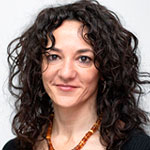 Paz Peña García
Coordinadora del Máster en Formación del Profesorado de ESO, Bachillerato, FP e Idiomas
Master's Thesis Coordinator
Doctora acreditada (ANECA) en Antropología y Trabajo Social y Licenciada en Pedagogía por la Universidad de Granada. Su investigación se enfoca en temas de Educación Intercultural, mediación, etnicidad, identidades, interseccionalidad y género, así como en la investigación e implementación de metodologías activas y emergentes para la inclusión. Es miembro activo del Grupo de Investigación Social Media y Educación Mediática Inclusiva y Ubicua (SMEMIU) en Madrid, así como del grupo de investigación “Innovación y mejora de la educación en Andalucía (HUM126)”. Además, ha participado como investigadora en varios proyectos europeos y de I+D, incluyendo el proyecto Knowledge Building Andalucía. También es autora de diversos artículos y capítulos de libros publicados en revistas y libros reconocidos en los campos de estudio.
Paz Peña García
Coordinadora del Máster en Formación del Profesorado de ESO, Bachillerato, FP e Idiomas
Master's Thesis Coordinator
Doctora acreditada (ANECA) en Antropología y Trabajo Social y Licenciada en Pedagogía por la Universidad de Granada. Su investigación se enfoca en temas de Educación Intercultural, mediación, etnicidad, identidades, interseccionalidad y género, así como en la investigación e implementación de metodologías activas y emergentes para la inclusión. Es miembro activo del Grupo de Investigación Social Media y Educación Mediática Inclusiva y Ubicua (SMEMIU) en Madrid, así como del grupo de investigación “Innovación y mejora de la educación en Andalucía (HUM126)”. Además, ha participado como investigadora en varios proyectos europeos y de I+D, incluyendo el proyecto Knowledge Building Andalucía. También es autora de diversos artículos y capítulos de libros publicados en revistas y libros reconocidos en los campos de estudio.
mpenaga@nebrija.es
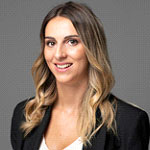 María Lucas Sánchez
Coordinadora
Coordinator
Máster en Tecnologías Aplicadas a la Práctica Docente (UCJC) y Grado de educación infantil (Universidad de Murcia). Cuenta con formación especializada en el ámbito de la Educación y con experiencia en gestión de títulos de postgrado en diferentes universidades (UFV y UCJC). Su experiencia profesional está vinculada a diferentes puestos de gestión, siempre relacionados en ámbito educativo.
María Lucas Sánchez
Coordinadora
Coordinator
Máster en Tecnologías Aplicadas a la Práctica Docente (UCJC) y Grado de educación infantil (Universidad de Murcia). Cuenta con formación especializada en el ámbito de la Educación y con experiencia en gestión de títulos de postgrado en diferentes universidades (UFV y UCJC). Su experiencia profesional está vinculada a diferentes puestos de gestión, siempre relacionados en ámbito educativo.
mlucass@nebrija.es
 Adolfo Alvaro Martín
Tutor de “Trabajo Fin de Máster”
End of Master's Project Tutor
Doctor en Educación. Profesor de la UCJC, Madrid. Miembro del Grupo de Investigación sobre Nuevas Tecnologías y Democracia de la Universidad Complutense, Madrid, España. Ha centrado su actividad investigadora en el uso de las TIC por parte de los jóvenes, habiendo codirigido entre otros Generación 2.0 2011, Hábitos de uso de las redes sociales en los adolescentes de España y América Latina. Autor de Revoluciones Horizontales: Ciberactivismo y Movilizaciones Ciudadanas en América Latina y España.
Adolfo Alvaro Martín
Tutor de “Trabajo Fin de Máster”
End of Master's Project Tutor
Doctor en Educación. Profesor de la UCJC, Madrid. Miembro del Grupo de Investigación sobre Nuevas Tecnologías y Democracia de la Universidad Complutense, Madrid, España. Ha centrado su actividad investigadora en el uso de las TIC por parte de los jóvenes, habiendo codirigido entre otros Generación 2.0 2011, Hábitos de uso de las redes sociales en los adolescentes de España y América Latina. Autor de Revoluciones Horizontales: Ciberactivismo y Movilizaciones Ciudadanas en América Latina y España.
aalvaro@nebrija.es
 Jaime Angulo Zevallos
Tutor de “Trabajos Fin de Máster”
End of Master's Project Tutor
Jaime Angulo Zevallos
Tutor de “Trabajos Fin de Máster”
End of Master's Project Tutor
jangulo@nebrija.es
 Rubén Darío Alvés López
Profesor de “Enfoque comunicativo y aprendizaje por tareas”
Professor of "Communicative approach and learning by tasks"
Licenciado en Filología Inglesa y diplomado en Magisterio por la Universidad de Vigo. Máster en Lingüística Aplicada a la Enseñanza de Español como Lengua Extranjera y Máster en Enseñanza Bilingüe por la Universidad Antonio de Nebrija. Actualmente escribe su tesis doctoral sobre las nuevas tecnologías de la información y la comunicación aplicadas en el ámbito educativo.
Cuenta con una amplia experiencia en el ámbito docente de lenguas. Es profesor de idiomas, competencias profesionales y nuevas tecnologías en campos tales como la Lingüística Aplicada o el uso de las TIC en educación desde el 2004. Ejerce su labor docente en universidades como Antonio de Nebrija, San Pablo CEU, CEA Global Campus (UNH – University of New Haven), Universidad Atlántica (Lisboa), Università Telematica Pegaso (Nápoles) y Carlos III (Madrid). Al estar tan involucrado en el sistema universitario, ha participado en numerosos congresos y publicados artículos relacionados con la enseñanza de lenguas extranjeras así como los procesos de implementación de las herramientas TIC en el ámbito educativo.
Rubén Darío Alvés López
Profesor de “Enfoque comunicativo y aprendizaje por tareas”
Professor of "Communicative approach and learning by tasks"
Licenciado en Filología Inglesa y diplomado en Magisterio por la Universidad de Vigo. Máster en Lingüística Aplicada a la Enseñanza de Español como Lengua Extranjera y Máster en Enseñanza Bilingüe por la Universidad Antonio de Nebrija. Actualmente escribe su tesis doctoral sobre las nuevas tecnologías de la información y la comunicación aplicadas en el ámbito educativo.
Cuenta con una amplia experiencia en el ámbito docente de lenguas. Es profesor de idiomas, competencias profesionales y nuevas tecnologías en campos tales como la Lingüística Aplicada o el uso de las TIC en educación desde el 2004. Ejerce su labor docente en universidades como Antonio de Nebrija, San Pablo CEU, CEA Global Campus (UNH – University of New Haven), Universidad Atlántica (Lisboa), Università Telematica Pegaso (Nápoles) y Carlos III (Madrid). Al estar tan involucrado en el sistema universitario, ha participado en numerosos congresos y publicados artículos relacionados con la enseñanza de lenguas extranjeras así como los procesos de implementación de las herramientas TIC en el ámbito educativo.
ralves@nebrija.es
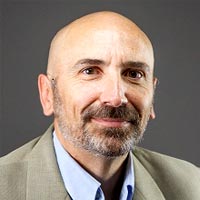 Francisco Javier Benítez Verguizas
Profesor de “Diseño de propuestas didácticas de Biología y Geología”, “Didáctica de la química” y “Aprendizaje y enseñanza de los procesos sanitarios I”
Professor of "Design of didactic proposals of Biology and Geology", "Didactics of chemistry" and "Learning and teaching of health processes I"
Doctor en Ciencias Biológicas por la Universidad Complutense de Madrid y Experto Universitario en Planificación y Gestión Empresarial por la UNED. Ha recibido varias becas y premios por su labor investigadora. Nivel C1 de inglés. Profesor de los Grados en Educación Infantil y Primaria en inglés, y del Máster en Formación del Profesorado en la Universidad Antonio de Nebrija, así como tutor de Trabajos de Fin de Grado y Fin de Máster.
Francisco Javier Benítez Verguizas
Profesor de “Diseño de propuestas didácticas de Biología y Geología”, “Didáctica de la química” y “Aprendizaje y enseñanza de los procesos sanitarios I”
Professor of "Design of didactic proposals of Biology and Geology", "Didactics of chemistry" and "Learning and teaching of health processes I"
Doctor en Ciencias Biológicas por la Universidad Complutense de Madrid y Experto Universitario en Planificación y Gestión Empresarial por la UNED. Ha recibido varias becas y premios por su labor investigadora. Nivel C1 de inglés. Profesor de los Grados en Educación Infantil y Primaria en inglés, y del Máster en Formación del Profesorado en la Universidad Antonio de Nebrija, así como tutor de Trabajos de Fin de Grado y Fin de Máster.
fbenitez@nebrija.es
 Víctor Berrocal Plaza
Tutor de “Trabajos Fin de Máster”
End of Master's Project Tutor
Doctor acreditado en Tecnologías Informáticas y Comunicaciones por la Universidad de Extremadura (2016). Premio Extraordinario de Doctorado 2017. Máster en Investigación en Ingeniería y Arquitectura por la Universidad de Extremadura (2011). Ingeniero de Telecomunicación por la Universidad de Sevilla (2010) e Ingeniero Técnico de Telecomunicación especialidad en Imagen y Sonido por la Universidad de Extremadura (2007). Autor de más de 25 publicaciones científicas en revistas internacionales indexadas en JCR, capítulos de libro y congresos. Además, ha sido miembro del comité científico en varios congresos internacionales y ha sido revisor en varias revistas internacionales indexadas en el JCR. Desde 2016 trabaja como investigador posdoctoral en Galgus. Sus líneas de investigación se centran en la investigación y desarrollo de técnicas de Inteligencia Artificial y Machine Learning para optimizar el funcionamiento de las redes de comunicaciones inalámbricas.
Víctor Berrocal Plaza
Tutor de “Trabajos Fin de Máster”
End of Master's Project Tutor
Doctor acreditado en Tecnologías Informáticas y Comunicaciones por la Universidad de Extremadura (2016). Premio Extraordinario de Doctorado 2017. Máster en Investigación en Ingeniería y Arquitectura por la Universidad de Extremadura (2011). Ingeniero de Telecomunicación por la Universidad de Sevilla (2010) e Ingeniero Técnico de Telecomunicación especialidad en Imagen y Sonido por la Universidad de Extremadura (2007). Autor de más de 25 publicaciones científicas en revistas internacionales indexadas en JCR, capítulos de libro y congresos. Además, ha sido miembro del comité científico en varios congresos internacionales y ha sido revisor en varias revistas internacionales indexadas en el JCR. Desde 2016 trabaja como investigador posdoctoral en Galgus. Sus líneas de investigación se centran en la investigación y desarrollo de técnicas de Inteligencia Artificial y Machine Learning para optimizar el funcionamiento de las redes de comunicaciones inalámbricas.
vberrocal@nebrija.es
 María Isabel Blanca Luna
Profesora de “La Formación Profesional en Economía, Empresa y Comercio”, “Prácticum I” y “Prácticum II”.
Professor of "Vocational Training in Economics, Business and Commerce", "Practicum I" and "Practicum II".
María Isabel Blanca Luna
Profesora de “La Formación Profesional en Economía, Empresa y Comercio”, “Prácticum I” y “Prácticum II”.
Professor of "Vocational Training in Economics, Business and Commerce", "Practicum I" and "Practicum II".
mblanca@nebrija.es
 Manuel Pedro Blázquez Merino
Profesor de “Diseño de propuestas didácticas de Tecnología e Informática” y “La ciencia y su metodología”
Professor of "Design of educational proposals for Technology and Informatics" and "Science and its methodology"
Ingeniero industrial en Electricidad (1990) de la Universidad Pontificia de Comillas ICAI (España), e Ingeniería Industrial en Electrónica y Automática (2008) de la Universidad Nacional de Educación a Distancia - UNED (España). Actualmente, está finalizando su tesis de doctoral en Aplicaciones Industriales, específicamente en Ingeniería y Educación por la UNED.
Manuel Pedro Blázquez Merino
Profesor de “Diseño de propuestas didácticas de Tecnología e Informática” y “La ciencia y su metodología”
Professor of "Design of educational proposals for Technology and Informatics" and "Science and its methodology"
Ingeniero industrial en Electricidad (1990) de la Universidad Pontificia de Comillas ICAI (España), e Ingeniería Industrial en Electrónica y Automática (2008) de la Universidad Nacional de Educación a Distancia - UNED (España). Actualmente, está finalizando su tesis de doctoral en Aplicaciones Industriales, específicamente en Ingeniería y Educación por la UNED.
mblazque@nebrija.es
 Miguel Martín Bordoy Serra
Profesor de “Enfoque Comunicativo y Aprendizaje por Tareas”
Professor of "Communicative Approach and Learning by Tasks"
Funcionario de carrera tanto del Cuerpo de Profesores de Enseñanza Secundaria como del Cuerpo de Maestros. Experiencia como miembro en tribunales de acceso a la función pública docente y de trabajos de fin de máster. Profesor ponente de cursos de formación permanente del profesorado de la Comunidad de Madrid y profesor ponente del Máster COPE de Radio. Tutor de prácticas del Grado de Maestro en la Universidad Camilo José Cela y en la Universidad Rey Juan Carlos. Coordinador docente en diversos CEIP, maestro de Educación Primaria y profesor de Lengua Castellana y Literatura en Educación Secundaria. Licenciado en Periodismo por la Universidad Carlos III de Madrid y diplomado como Maestro por la Universidad de las Islas Baleares.
Miguel Martín Bordoy Serra
Profesor de “Enfoque Comunicativo y Aprendizaje por Tareas”
Professor of "Communicative Approach and Learning by Tasks"
Funcionario de carrera tanto del Cuerpo de Profesores de Enseñanza Secundaria como del Cuerpo de Maestros. Experiencia como miembro en tribunales de acceso a la función pública docente y de trabajos de fin de máster. Profesor ponente de cursos de formación permanente del profesorado de la Comunidad de Madrid y profesor ponente del Máster COPE de Radio. Tutor de prácticas del Grado de Maestro en la Universidad Camilo José Cela y en la Universidad Rey Juan Carlos. Coordinador docente en diversos CEIP, maestro de Educación Primaria y profesor de Lengua Castellana y Literatura en Educación Secundaria. Licenciado en Periodismo por la Universidad Carlos III de Madrid y diplomado como Maestro por la Universidad de las Islas Baleares.
mbordoy@nebrija.es
 Irene Campos García
Profesora de “Didáctica de la Empresa”
Professor of "Business Didactics"
Irene Campos García
Profesora de “Didáctica de la Empresa”
Professor of "Business Didactics"
icampos@nebrija.es
 Juan Antonio Chamorro Hinojosa
Tutor de “Trabajo Fin de Máster”
End of Master's Project Tutor
Juan Antonio Chamorro Hinojosa
Tutor de “Trabajo Fin de Máster”
End of Master's Project Tutor
jchamorroh@nebrija.es
 Patricia Jara Calaforra
Tutora de “Trabajo Fin de Máster”
Master's Final Project Tutor
Doctora en Psicología por la Universidad Complutense de Madrid. Pedagoga, Maestra de Educación Primaria y maestra de Audición y Lenguaje en colegios y gabinetes psicopedagógicos.
Ha trabajado como profesora en los grados de Educación infantil y Primaria, en las menciones de audición y Lenguaje y Pedagogía Terapéutica en la Universidad Internacional de la Rioja, así como profesora de Psicología Básica en la Universidad Complutense de Madrid. Miembro del equipo del Proyecto: Utilización de códigos QR para la evaluación continua en alumnos de Psicología Básica (prácticas), aprobado en la convocatoria de “Proyectos de Innovación y Mejora de la Calidad Docente” del año 2014.
Diversas publicaciones sobre estrategias metacognitivas en escritura y códigos QR. Ponente en el Congreso Internacional en Contextos Psicológicos, Educativos y de la Salud.
Patricia Jara Calaforra
Tutora de “Trabajo Fin de Máster”
Master's Final Project Tutor
Doctora en Psicología por la Universidad Complutense de Madrid. Pedagoga, Maestra de Educación Primaria y maestra de Audición y Lenguaje en colegios y gabinetes psicopedagógicos.
Ha trabajado como profesora en los grados de Educación infantil y Primaria, en las menciones de audición y Lenguaje y Pedagogía Terapéutica en la Universidad Internacional de la Rioja, así como profesora de Psicología Básica en la Universidad Complutense de Madrid. Miembro del equipo del Proyecto: Utilización de códigos QR para la evaluación continua en alumnos de Psicología Básica (prácticas), aprobado en la convocatoria de “Proyectos de Innovación y Mejora de la Calidad Docente” del año 2014.
Diversas publicaciones sobre estrategias metacognitivas en escritura y códigos QR. Ponente en el Congreso Internacional en Contextos Psicológicos, Educativos y de la Salud.
pcalaforra@nebrija.es
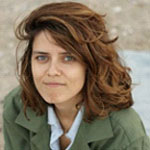 Laura Camas Garrido
Profesora de “Educación, Sociedad y Política Educativa”
Professor of "Education, Society and Educational Policy"
Grado en Educación Primaria (2010-2014) y Máster en Psicología de la Educación (2014-2015) con Premio Extraordinario en la Universidad de Sevilla. Inició su formación como investigadora en educación en la Universidad Complutense de Madrid a través del Máster en Investigación en Educación (2016-2017) y el Doctorado en Educación con mención internacional (2017-2022) con la tesis "Juego, educación y pragmatismo: Del playground de Jane Addams a los playworkers de Neva Boyd". Ha sido investigadora visitante en la Facultad de Educación de la Queen's University (Ontario, Canadá), en el Teachers College de la Columbia University (Nueva York, Estados Unidos) y en la Universidad de Barcelona (España). Sus principales líneas de investigación se centran en el estudio de la intersección entre la educación, el juego, la experiencia estética, la democracia y el cosmopolitismo en una perspectiva pragmatista a partir de las obras de Jane Addams (1860-1935) y Neva Boyd (1976-1963). Ha publicado en revistas como International Journal of Play, European Journal of Pragmatism y American Philosophy o en editoriales como Springer.
Laura Camas Garrido
Profesora de “Educación, Sociedad y Política Educativa”
Professor of "Education, Society and Educational Policy"
Grado en Educación Primaria (2010-2014) y Máster en Psicología de la Educación (2014-2015) con Premio Extraordinario en la Universidad de Sevilla. Inició su formación como investigadora en educación en la Universidad Complutense de Madrid a través del Máster en Investigación en Educación (2016-2017) y el Doctorado en Educación con mención internacional (2017-2022) con la tesis "Juego, educación y pragmatismo: Del playground de Jane Addams a los playworkers de Neva Boyd". Ha sido investigadora visitante en la Facultad de Educación de la Queen's University (Ontario, Canadá), en el Teachers College de la Columbia University (Nueva York, Estados Unidos) y en la Universidad de Barcelona (España). Sus principales líneas de investigación se centran en el estudio de la intersección entre la educación, el juego, la experiencia estética, la democracia y el cosmopolitismo en una perspectiva pragmatista a partir de las obras de Jane Addams (1860-1935) y Neva Boyd (1976-1963). Ha publicado en revistas como International Journal of Play, European Journal of Pragmatism y American Philosophy o en editoriales como Springer.
lcamas@nebrija.es
 Manuel Chaves Maza
Tutor de “Trabajo Fin de Máster”
End of Master's Project Tutor
Profesor durante 14 años en la Universidad Pablo de OIavide, Universidad de Sevilla, además de 5 años de experiencia en secundaria y fp en centros privados y concertados. Doctor en Administración y Dirección de Empresas con tesis cuyo título es “El apoyo institucional a Emprendores: Mejora de la tasa de rendimiento mediante técnicas de Inteligencia Artificial”, miembro del Grupo de Investigación PAIDI orientado a métodos cuantitativos para la empresa. 12 años de experiencia en consultoría internacional, formación y desarrollo territorial con más de 175 proyectos elaborados. Premio de innovación con un proyecto docente, mejor proyecto empresarial spin-off por la Universidad Pablo de Olavide. Coautor de artículos como Ways to support entrepreneurship after the Covid-19 crisis (Journal of SSI, 2020). Structural Equation Models on the Satisfaction and Motivation for Retirement of Spanish University Professors (Social Science 2020). Factores relevantes para optimizar los servicios públicos de apoyo a los emprendedores y la tasa de supervivencia de las empresas (Innovar, 2018).
Manuel Chaves Maza
Tutor de “Trabajo Fin de Máster”
End of Master's Project Tutor
Profesor durante 14 años en la Universidad Pablo de OIavide, Universidad de Sevilla, además de 5 años de experiencia en secundaria y fp en centros privados y concertados. Doctor en Administración y Dirección de Empresas con tesis cuyo título es “El apoyo institucional a Emprendores: Mejora de la tasa de rendimiento mediante técnicas de Inteligencia Artificial”, miembro del Grupo de Investigación PAIDI orientado a métodos cuantitativos para la empresa. 12 años de experiencia en consultoría internacional, formación y desarrollo territorial con más de 175 proyectos elaborados. Premio de innovación con un proyecto docente, mejor proyecto empresarial spin-off por la Universidad Pablo de Olavide. Coautor de artículos como Ways to support entrepreneurship after the Covid-19 crisis (Journal of SSI, 2020). Structural Equation Models on the Satisfaction and Motivation for Retirement of Spanish University Professors (Social Science 2020). Factores relevantes para optimizar los servicios públicos de apoyo a los emprendedores y la tasa de supervivencia de las empresas (Innovar, 2018).
mchaves@nebrija.es
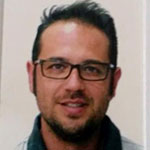 Leopoldo Alonso Callealta Oña
Profesor de “Educación, sociedad y política educativa”
Professor of "Education, society and educational policy"
Licenciado en Pedagogía por la Universidad de Sevilla. Diplomado en Magisterio de Educación Física en la Universidad de Cádiz. Máster Experto en Resolución de Conflictos (especialidad en Mediación educativa, social y familiar) por Divulgación Dinámica S.L. Actualmente realiza su tesis doctoral enfocada a las competencias profesionales docentes y el perfil de los profesores de secundaria (Universidad Camilo José Cela). Premiado con el mejor expediente académico de su promoción en Pedagogía. De igual modo, obtuvo el Premio Ilustración del Ateneo Literario, Artístico y Científico de Cádiz y del Casino Gaditano por el expediente académico de la Diplomatura de Magisterio. NOMINADO A LOS PREMIOS EDUCA ABANCA AL MEJOR DOCENTE DE ESPAÑA 2019, en la categoría de Universidad.
Actualmente es miembro investigador del grupo HUM794 Música y movimiento en educación y terapias. (MET).
Leopoldo Alonso Callealta Oña
Profesor de “Educación, sociedad y política educativa”
Professor of "Education, society and educational policy"
Licenciado en Pedagogía por la Universidad de Sevilla. Diplomado en Magisterio de Educación Física en la Universidad de Cádiz. Máster Experto en Resolución de Conflictos (especialidad en Mediación educativa, social y familiar) por Divulgación Dinámica S.L. Actualmente realiza su tesis doctoral enfocada a las competencias profesionales docentes y el perfil de los profesores de secundaria (Universidad Camilo José Cela). Premiado con el mejor expediente académico de su promoción en Pedagogía. De igual modo, obtuvo el Premio Ilustración del Ateneo Literario, Artístico y Científico de Cádiz y del Casino Gaditano por el expediente académico de la Diplomatura de Magisterio. NOMINADO A LOS PREMIOS EDUCA ABANCA AL MEJOR DOCENTE DE ESPAÑA 2019, en la categoría de Universidad.
Actualmente es miembro investigador del grupo HUM794 Música y movimiento en educación y terapias. (MET).
lcallealta@nebrija.es
 Fernando Carrasco Martín
Profesor de “Procesos Educativos y Realidad Escolar”, “Prácticum I” y “Prácticum II”.
Professor of "Educational Processes and School Reality", "Practicum I" and "Practicum II".
Fernando Carrasco Martín, experto en liderazgo y gestión, ha sido director en del Colegio Salesianos Alcalá, así como miembro del equipo de titularidad de centros educativos en la provincia de Sevilla. Actualmente compagina la docencia universitaria con la asesoría educativa a equipos directivos. Es graduado en Lengua Extranjera y cuenta con estudios superiores en Neuropsicología.
Fernando Carrasco Martín
Profesor de “Procesos Educativos y Realidad Escolar”, “Prácticum I” y “Prácticum II”.
Professor of "Educational Processes and School Reality", "Practicum I" and "Practicum II".
Fernando Carrasco Martín, experto en liderazgo y gestión, ha sido director en del Colegio Salesianos Alcalá, así como miembro del equipo de titularidad de centros educativos en la provincia de Sevilla. Actualmente compagina la docencia universitaria con la asesoría educativa a equipos directivos. Es graduado en Lengua Extranjera y cuenta con estudios superiores en Neuropsicología.
fcarrasc@nebrija.es
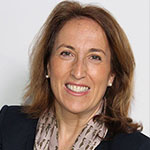 Silvia Carrascal Domínguez
Tutora de “Trabajo de Fin de Máster”
End of Master's Project Tutor
Silvia Carrascal es Doctora en Bellas Artes por la Universidad Complutense de Madrid. Experta en Educación Artística, Creatividad y en Gestión de Políticas Sociales, Culturales y Educativas. Ha estado dedicada a tareas docentes en diversos centros educativos de la Consejería de Educación de la Comunidad de Madrid, en la Escuela de Magisterio ESCUNI, institución educativa adscrita a la Universidad Complutense de Madrid -desde septiembre de 1999-; y en los Grados de Educación Infantil y Primaria de la Universidad Internacional de la Rioja (UNIR). Directora de Investigación, Doctorado y Postgrados en la Facultad de Ciencias Sociales y de la Educación, en la Universidad Camilo José Cela (UCJC), entre 2012 y 2015. Asumió la Dirección del Master de Formación del Profesorado en Educación Secundaria, Bachillerato y Formación Profesional de la UCJC entre 2014 y 2015.
Silvia Carrascal Domínguez
Tutora de “Trabajo de Fin de Máster”
End of Master's Project Tutor
Silvia Carrascal es Doctora en Bellas Artes por la Universidad Complutense de Madrid. Experta en Educación Artística, Creatividad y en Gestión de Políticas Sociales, Culturales y Educativas. Ha estado dedicada a tareas docentes en diversos centros educativos de la Consejería de Educación de la Comunidad de Madrid, en la Escuela de Magisterio ESCUNI, institución educativa adscrita a la Universidad Complutense de Madrid -desde septiembre de 1999-; y en los Grados de Educación Infantil y Primaria de la Universidad Internacional de la Rioja (UNIR). Directora de Investigación, Doctorado y Postgrados en la Facultad de Ciencias Sociales y de la Educación, en la Universidad Camilo José Cela (UCJC), entre 2012 y 2015. Asumió la Dirección del Master de Formación del Profesorado en Educación Secundaria, Bachillerato y Formación Profesional de la UCJC entre 2014 y 2015.
scarrascal@nebrija.es
 Pablo Casado Calle
Profesor de “Aspectos Fundamentales de la Didáctica en Hostelería y Turismo”
Professor of "Fundamental Aspects of Didactics in Hospitality and Tourism"
Graduado en Turismo por la Universidad de Granada especializado en Dirección y Gestión de Empresas Hoteleras por la Universidad Complutense de Madrid y Dirección de Marketing por Constanza Business & Protocol School. Máster en Formación de Profesorado en la especialidad de Economía, Empresa y Comercio por la Universidad de Granada. Colaborador en los Proyectos de innovación educativa - Innova Docencia (ediciones 2020, 2021 y 2022) en Facultad de Comercio y Turismo de la Universidad Complutense de Madrid. Profesor titular de Publicidad en Internet, Design Thinking y Aspectos Legales y Privacidad en Escuela Arte Granada en la etapa educativa de Formación Profesional. Doctorando en el Programa de Ciencias Económicas y Empresariales de la Universidad de Granada y profesor a tiempo parcial de la asignatura Aspectos fundamentales de la didáctica en Hostelería y Turismo y tutor de Trabajo Final de Máster en Universidad Nebrija. Actualmente investigador de mercados y promoción turística en la Consejería de Turismo de la Embajada de España en el exterior.
Pablo Casado Calle
Profesor de “Aspectos Fundamentales de la Didáctica en Hostelería y Turismo”
Professor of "Fundamental Aspects of Didactics in Hospitality and Tourism"
Graduado en Turismo por la Universidad de Granada especializado en Dirección y Gestión de Empresas Hoteleras por la Universidad Complutense de Madrid y Dirección de Marketing por Constanza Business & Protocol School. Máster en Formación de Profesorado en la especialidad de Economía, Empresa y Comercio por la Universidad de Granada. Colaborador en los Proyectos de innovación educativa - Innova Docencia (ediciones 2020, 2021 y 2022) en Facultad de Comercio y Turismo de la Universidad Complutense de Madrid. Profesor titular de Publicidad en Internet, Design Thinking y Aspectos Legales y Privacidad en Escuela Arte Granada en la etapa educativa de Formación Profesional. Doctorando en el Programa de Ciencias Económicas y Empresariales de la Universidad de Granada y profesor a tiempo parcial de la asignatura Aspectos fundamentales de la didáctica en Hostelería y Turismo y tutor de Trabajo Final de Máster en Universidad Nebrija. Actualmente investigador de mercados y promoción turística en la Consejería de Turismo de la Embajada de España en el exterior.
pcasado@nebrija.es
 Andrea Cereto Urdiales
Profesora de “Ciencias sociales y Educación I”, “Prácticum I” y “Prácticum II”
Professor of "Social Sciences and Education I", "Practicum I" and "Practicum II"
Ha impartido la asignatura de Ciencias Sociales y Educación I: Geografía. Tutora de prácticas, así como tutora y tribunal de Trabajos de Fin de Máster en el Máster Universitario e Formación del Profesorado de Universidad Antonio de Nebrija.
Imparte docencia en Programas de Apoyo para el primer ciclo de Educación Secundaria Obligatoria a colectivos de riesgo en la Comunidad de Madrid.
Trabaja actualmente en centros de educación para adultos del Ayuntamiento de Madrid.
Andrea Cereto Urdiales
Profesora de “Ciencias sociales y Educación I”, “Prácticum I” y “Prácticum II”
Professor of "Social Sciences and Education I", "Practicum I" and "Practicum II"
Ha impartido la asignatura de Ciencias Sociales y Educación I: Geografía. Tutora de prácticas, así como tutora y tribunal de Trabajos de Fin de Máster en el Máster Universitario e Formación del Profesorado de Universidad Antonio de Nebrija.
Imparte docencia en Programas de Apoyo para el primer ciclo de Educación Secundaria Obligatoria a colectivos de riesgo en la Comunidad de Madrid.
Trabaja actualmente en centros de educación para adultos del Ayuntamiento de Madrid.
acereto@nebrija.es
 Paula Contesse Carvacho
Tutora de “Trabajo Fin de Máster”
End of Master's Project Tutor
Paula Contesse Carvacho
Tutora de “Trabajo Fin de Máster”
End of Master's Project Tutor
pcontess@nebrija.es
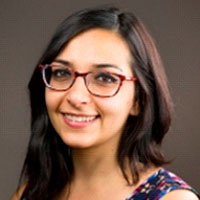 Zeina F D Alhmoud
Tutora de “Trabajo Fin de Máster”
End of Master's Project Tutor
Doctora en Lingüística Aplicada a la enseñanza de lenguas por la Universidad de Granada (2016). Licenciada en Lenguas Modernas (español e inglés) por la Universidad de Jordania (2006). Tiene más de cuatro años de experiencia como profesora de inglés como lengua extranjera. Ha hecho varios trabajos de ilustración y elaboración de presentaciones didácticas, entre ellos el proyecto de investigación, financiado por el Ministerio de Educación y Ciencia de España, “Gramática avanzada de español lengua” extranjera (FFI2009-13107). Universidad de Granada (Investigador Principal Alejandro Castañeda Castro). Actualmente es profesora del Departamento de Lenguas aplicadas de la Universidad Nebrija. Es miembro del grupo de investigación LAELE de la Universidad Nebrija y participa en el proyecto de investigación del Plan Regional (IN.MIGRA2-CM). Su área de investigación se centra en la lingüística cognitiva y su aplicación a la enseñanza de segundas lenguas, y el uso de las imágenes y animaciones en el aula de L2. Tiene especial interés en el diseño de ilustraciones y materiales didácticos.
Zeina F D Alhmoud
Tutora de “Trabajo Fin de Máster”
End of Master's Project Tutor
Doctora en Lingüística Aplicada a la enseñanza de lenguas por la Universidad de Granada (2016). Licenciada en Lenguas Modernas (español e inglés) por la Universidad de Jordania (2006). Tiene más de cuatro años de experiencia como profesora de inglés como lengua extranjera. Ha hecho varios trabajos de ilustración y elaboración de presentaciones didácticas, entre ellos el proyecto de investigación, financiado por el Ministerio de Educación y Ciencia de España, “Gramática avanzada de español lengua” extranjera (FFI2009-13107). Universidad de Granada (Investigador Principal Alejandro Castañeda Castro). Actualmente es profesora del Departamento de Lenguas aplicadas de la Universidad Nebrija. Es miembro del grupo de investigación LAELE de la Universidad Nebrija y participa en el proyecto de investigación del Plan Regional (IN.MIGRA2-CM). Su área de investigación se centra en la lingüística cognitiva y su aplicación a la enseñanza de segundas lenguas, y el uso de las imágenes y animaciones en el aula de L2. Tiene especial interés en el diseño de ilustraciones y materiales didácticos.
zdalhmoud@nebrija.es
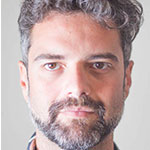 Salvador Delgado Aguilar
Profesor de “Ciencias Sociales y Educación II”, “Didáctica de la Historia”, “Prácticum I” y “Prácticum II”
Professor of "Social Sciences and Education II", "Didactics of History", "Practicum I" and "Practicum II"
Doctor en Arqueología en 2016 y Ldo. en Historia por la Universidad de Huelva. Profesor en la misma impartiendo diferentes asignaturas de Arqueología, así como porfesor en el Master de Profesorado en la Universidad Antonio Nebrija, donde he impartido la asignatura Educación y Ciencias Sociales II: Historia, así como la tutorización de trabajos de fin de Máster adscritos al mismo Máster. Ha impartido docencia en Secundaria en el Colegio Juan Luis Vives de Huelva a cargo de las clases de Historia y Geografía en los cursos de 3º y 4º de ESO, también realizó actividades como monitor/interprete del patrimonio histórico en la empresa Platalea en Huelva, dinamizando grupos de los distintos ciclos educativos, y participado como director así como técnico arqueólogo en distintas actividades arqueológicas en la provincia de Huelva así como la participación en diversos proyectos nacionales e internacionales. Estancia formativa e investigadora en Roma acogido por la Escuela Española de Arqueología e Historia (CSIC). Asimismo, ha publicado más de una veintena de artículos y capítulos de libros en distintas revistas científicas de impacto en Humanidades.
Salvador Delgado Aguilar
Profesor de “Ciencias Sociales y Educación II”, “Didáctica de la Historia”, “Prácticum I” y “Prácticum II”
Professor of "Social Sciences and Education II", "Didactics of History", "Practicum I" and "Practicum II"
Doctor en Arqueología en 2016 y Ldo. en Historia por la Universidad de Huelva. Profesor en la misma impartiendo diferentes asignaturas de Arqueología, así como porfesor en el Master de Profesorado en la Universidad Antonio Nebrija, donde he impartido la asignatura Educación y Ciencias Sociales II: Historia, así como la tutorización de trabajos de fin de Máster adscritos al mismo Máster. Ha impartido docencia en Secundaria en el Colegio Juan Luis Vives de Huelva a cargo de las clases de Historia y Geografía en los cursos de 3º y 4º de ESO, también realizó actividades como monitor/interprete del patrimonio histórico en la empresa Platalea en Huelva, dinamizando grupos de los distintos ciclos educativos, y participado como director así como técnico arqueólogo en distintas actividades arqueológicas en la provincia de Huelva así como la participación en diversos proyectos nacionales e internacionales. Estancia formativa e investigadora en Roma acogido por la Escuela Española de Arqueología e Historia (CSIC). Asimismo, ha publicado más de una veintena de artículos y capítulos de libros en distintas revistas científicas de impacto en Humanidades.
sdelgado@nebrija.es
 Luis Eduardo Díaz Zazo
Profesor de “Tecnología y procesos industriales II”
Professor of "Technology and industrial processes II"
Ingeniero Superior Telecomunicación (UPM), Máster Administración Empresas (U. Comillas), Máster Educación (U. Comillas). Profesor de Robótica Industrial, Sistemas de Telecomunicación y Electrónica. Responsable de Ingeniería y Consultor en Unión Fenosa, Gas Natural, Tecnocom, INT (Francia). Certificado ATM, DVB, DWDM, ICT, MPLS, SCE, SDH, TCP/IP, UMTS, VoFR, VoIP, VSAT.
Luis Eduardo Díaz Zazo
Profesor de “Tecnología y procesos industriales II”
Professor of "Technology and industrial processes II"
Ingeniero Superior Telecomunicación (UPM), Máster Administración Empresas (U. Comillas), Máster Educación (U. Comillas). Profesor de Robótica Industrial, Sistemas de Telecomunicación y Electrónica. Responsable de Ingeniería y Consultor en Unión Fenosa, Gas Natural, Tecnocom, INT (Francia). Certificado ATM, DVB, DWDM, ICT, MPLS, SCE, SDH, TCP/IP, UMTS, VoFR, VoIP, VSAT.
ldiazz@nebrija.es
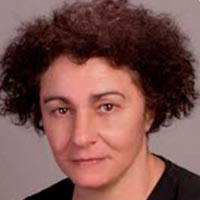 Miguela Domingo Centeno
Tutora de Trabajo Fin de Máster
End of Master's Project Tutor
Doctora en Ciencias de la Educación y Filosofía; doctorada en Derecho (UCM). Acreditada. Doctora en Chile, diplomada en psicología y máster de Especialización con mención de honor en necesidades especiales de apoyo educativo. Máster de excelencia pedagógica, máster de actividad investigadora, desde 2001 varios en la universidad de MÜNSTER (Westfallen) entre ellos alto diploma de estudios sociales. Actualmente y en curso doble titulación en máster en psicología infanto-juvenil+máster en intervención psicopedagógica. Miembro honorífico de la UCM Derecho. Decana del centro universitario de la salle, adscrito a la UAM. Continua con sus colaboraciones en Alemania.
Miguela Domingo Centeno
Tutora de Trabajo Fin de Máster
End of Master's Project Tutor
Doctora en Ciencias de la Educación y Filosofía; doctorada en Derecho (UCM). Acreditada. Doctora en Chile, diplomada en psicología y máster de Especialización con mención de honor en necesidades especiales de apoyo educativo. Máster de excelencia pedagógica, máster de actividad investigadora, desde 2001 varios en la universidad de MÜNSTER (Westfallen) entre ellos alto diploma de estudios sociales. Actualmente y en curso doble titulación en máster en psicología infanto-juvenil+máster en intervención psicopedagógica. Miembro honorífico de la UCM Derecho. Decana del centro universitario de la salle, adscrito a la UAM. Continua con sus colaboraciones en Alemania.
mdomingo@nebrija.es
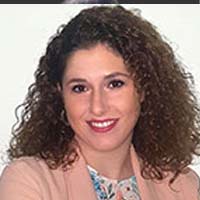 María del Carmen Domínguez Fernández de Bobadilla
Profesora de “Educación, sociedad y política educativa” y “Orientación personal, académica y profesional”
Professor of "Education, society and educational policy" and "Personal, academic and professional guidance"
Profesora Asociada en el Máster Universitario en Formación del Profesorado de Enseñanza Secundaria Obligatoria y Bachillerato, Formación Profesional y Enseñanza de Idiomas de Universidad Nebrija.
Posee amplia experiencia en el campo de la orientación académica y profesional como Técnico de Formación en la Administración Pública, desarrollando proyectos educativos tanto en niveles de Educación Primaria como IES de temática variada: habilidades sociales, Técnicas de Trabajo Intelectual, PIH en alumnado de ESO, etc.
Cuenta con formación específica en Necesidades Educativas Especiales y la rama Clínica de la Psicopedagogía.
Es tutora de Trabajos Fin de Máster y Profesora Asociada desde el curso 2017/18.
María del Carmen Domínguez Fernández de Bobadilla
Profesora de “Educación, sociedad y política educativa” y “Orientación personal, académica y profesional”
Professor of "Education, society and educational policy" and "Personal, academic and professional guidance"
Profesora Asociada en el Máster Universitario en Formación del Profesorado de Enseñanza Secundaria Obligatoria y Bachillerato, Formación Profesional y Enseñanza de Idiomas de Universidad Nebrija.
Posee amplia experiencia en el campo de la orientación académica y profesional como Técnico de Formación en la Administración Pública, desarrollando proyectos educativos tanto en niveles de Educación Primaria como IES de temática variada: habilidades sociales, Técnicas de Trabajo Intelectual, PIH en alumnado de ESO, etc.
Cuenta con formación específica en Necesidades Educativas Especiales y la rama Clínica de la Psicopedagogía.
Es tutora de Trabajos Fin de Máster y Profesora Asociada desde el curso 2017/18.
mdominguezf@nebrija.es
 María Pilar Ester Mariñoso
Profesora de “Psicología y Educación del Adolescente”
Professor of "Adolescent Psychology and Education"
Doctora en Psicología. Especialista en Psicología evolutiva y en el desarrollo del pensamiento matemático en la primera infancia. Investigadora en la línea de didáctica de las matemáticas en pensamiento numérico y resolución de problemas. Autora de distintas publicaciones y presentaciones a congresos relacionados con la enseñanza de las matemáticas en Educación Infantil y Primaria, así como procesos cognitivos implicados en el aprendizaje de las mismas. Actualmente colaboradora de la Universidad de Arizona.
María Pilar Ester Mariñoso
Profesora de “Psicología y Educación del Adolescente”
Professor of "Adolescent Psychology and Education"
Doctora en Psicología. Especialista en Psicología evolutiva y en el desarrollo del pensamiento matemático en la primera infancia. Investigadora en la línea de didáctica de las matemáticas en pensamiento numérico y resolución de problemas. Autora de distintas publicaciones y presentaciones a congresos relacionados con la enseñanza de las matemáticas en Educación Infantil y Primaria, así como procesos cognitivos implicados en el aprendizaje de las mismas. Actualmente colaboradora de la Universidad de Arizona.
mester@nebrija.es
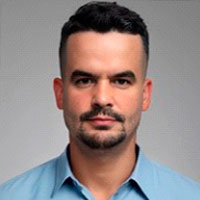 Alién García Hernández
Tutor de “Trabajo Fin de Máster”
End of Master's Project Tutor
Doctor Cum Laude en Educación, Máster en la Investigación y el Aprendizaje de las Ciencias Sociales, Experimentales y las Matemáticas, Ingeniero Informático. Ha trabajado como profesor investigador y como Director de Departamento en la Universidad de las Ciencias Informáticas de Cuba en la línea de la Tecnología Educativa. Actualmente es investigador en el Grupo de investigación, Evaluación y Tecnología Educativa de la Universidad de Sevilla.
Alién García Hernández
Tutor de “Trabajo Fin de Máster”
End of Master's Project Tutor
Doctor Cum Laude en Educación, Máster en la Investigación y el Aprendizaje de las Ciencias Sociales, Experimentales y las Matemáticas, Ingeniero Informático. Ha trabajado como profesor investigador y como Director de Departamento en la Universidad de las Ciencias Informáticas de Cuba en la línea de la Tecnología Educativa. Actualmente es investigador en el Grupo de investigación, Evaluación y Tecnología Educativa de la Universidad de Sevilla.
agarciahe@nebrija.es
 Carolina Gonzalo Llera
Profesora de "Procesos educativos y realidad escolar"
Professor of "Educational processes and school reality"
Doctora cum laude en Lingüística Hispánica Aplicada por la Universidad Complutense de Madrid, Máster en Lingüística Hispánica Aplicada por la Western Michigan University. Licenciada en Psicopedagogía y Profesora de Ed. Infantil. Posee el certificado de inglés TOEFL (Advanced English).
Ha trabajado como profesora durante 19 años en todos los niveles educativos, desde Infantil hasta Universitario en Argentina, Estados Unidos y España. Es profesora de la Facultad de Lenguas y Educación en la Universidad Nebrija en los Grados Bilingües de Ed. Infantil y Primaria, así como en el Máster de Formación del Profesorado.
Asimismo, es formadora de profesores de inglés en Oxford University Press.
Carolina Gonzalo Llera
Profesora de "Procesos educativos y realidad escolar"
Professor of "Educational processes and school reality"
Doctora cum laude en Lingüística Hispánica Aplicada por la Universidad Complutense de Madrid, Máster en Lingüística Hispánica Aplicada por la Western Michigan University. Licenciada en Psicopedagogía y Profesora de Ed. Infantil. Posee el certificado de inglés TOEFL (Advanced English).
Ha trabajado como profesora durante 19 años en todos los niveles educativos, desde Infantil hasta Universitario en Argentina, Estados Unidos y España. Es profesora de la Facultad de Lenguas y Educación en la Universidad Nebrija en los Grados Bilingües de Ed. Infantil y Primaria, así como en el Máster de Formación del Profesorado.
Asimismo, es formadora de profesores de inglés en Oxford University Press.
cgonzalo@nebrija.es
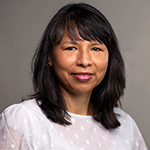 Sulma Farfán Rossa
Tutora de “Trabajo Fin de Máster”
End of Master's Project Tutor
Doctora Cum laude en Educación con Premio Extraordinario de Doctorado por la Universidad Nacional de Educación a Distancia (UNED). Licenciada en Informática por la Universidad Mayor de San Andrés-Bolivia. Cuenta con acreditación de la ANECA. Ha cursado los siguientes Maestrias: Ingénierie des Médias pour l’Education-Université de Poitiers-Francia, Ciencias de la Educación. Especialidad Tecnología Educativa-Universidad Técnica de Lisboa-Portugal, Informática Educativa-UNED-España, Ingeniería Informática-Universidad Autónoma Juan Misael Saracho (UAJMS)-Bolivia. Ha sido directora de diversos proyectos de innovación universitaria basados en las TIC y organizadora de diversos congresos y seminarios internacionales relacionados con TIC, Educación y Ciberdelitos.
Sulma Farfán Rossa
Tutora de “Trabajo Fin de Máster”
End of Master's Project Tutor
Doctora Cum laude en Educación con Premio Extraordinario de Doctorado por la Universidad Nacional de Educación a Distancia (UNED). Licenciada en Informática por la Universidad Mayor de San Andrés-Bolivia. Cuenta con acreditación de la ANECA. Ha cursado los siguientes Maestrias: Ingénierie des Médias pour l’Education-Université de Poitiers-Francia, Ciencias de la Educación. Especialidad Tecnología Educativa-Universidad Técnica de Lisboa-Portugal, Informática Educativa-UNED-España, Ingeniería Informática-Universidad Autónoma Juan Misael Saracho (UAJMS)-Bolivia. Ha sido directora de diversos proyectos de innovación universitaria basados en las TIC y organizadora de diversos congresos y seminarios internacionales relacionados con TIC, Educación y Ciberdelitos.
sfarfan@nebrija.es
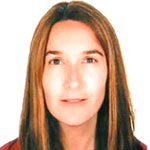 Laura Fernández Bardisa
Profesora de “Didáctica de la Lengua Inglesa”
Professor of "English Language Didactics"
Filóloga inglesa con amplia experiencia en educación. Cuatro años trabajando en Estados Unidos, uno como becaria Fulbright, otro como profesora visitante de secundaria y dos como profesora del Ministerio de Asuntos Exteriores de España (AECID). He trabajado en institutos y Universidades tanto en España como en Estados Unidos. Tengo experiencia en docencia online y habilidades, así como habilidades interpersonales y de comunicación.
Laura Fernández Bardisa
Profesora de “Didáctica de la Lengua Inglesa”
Professor of "English Language Didactics"
Filóloga inglesa con amplia experiencia en educación. Cuatro años trabajando en Estados Unidos, uno como becaria Fulbright, otro como profesora visitante de secundaria y dos como profesora del Ministerio de Asuntos Exteriores de España (AECID). He trabajado en institutos y Universidades tanto en España como en Estados Unidos. Tengo experiencia en docencia online y habilidades, así como habilidades interpersonales y de comunicación.
lfernanb@nebrija.es
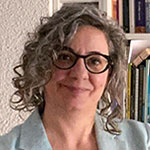 Maria Cristina Fernández Laso
Tutora de “Trabajos Fin de Máster”
End of Master's Project Tutor
Doctora por la Universidad Rovira i Virgili, se formó en el equipo de investigación de los yacimientos de la Sierra de Atapuerca (Burgos). Acreditada como profesor contratado doctor en la actualidad trabaja como profesor asociado en la Universidad Rey Juan Carlos. Compagina la docencia con investigaciones en el ámbito de la Educación Patrimonial y las Tecnologías de la Información y la Comunicación (TIC). Ha participado en Congresos nacionales e internacionales, así como publicado en libros y revistas científicas. También ha colaborado en numerosas excavaciones de yacimientos tan relevantes como Pompeya (Nápoles, Italia)
Maria Cristina Fernández Laso
Tutora de “Trabajos Fin de Máster”
End of Master's Project Tutor
Doctora por la Universidad Rovira i Virgili, se formó en el equipo de investigación de los yacimientos de la Sierra de Atapuerca (Burgos). Acreditada como profesor contratado doctor en la actualidad trabaja como profesor asociado en la Universidad Rey Juan Carlos. Compagina la docencia con investigaciones en el ámbito de la Educación Patrimonial y las Tecnologías de la Información y la Comunicación (TIC). Ha participado en Congresos nacionales e internacionales, así como publicado en libros y revistas científicas. También ha colaborado en numerosas excavaciones de yacimientos tan relevantes como Pompeya (Nápoles, Italia)
mfernandezla@nebrija.es
 Javier Freijo Martín
Profesor de “Física y Química para profesores de Secundaria, Bachillerato y FP”
Professor of "Physics and Chemistry for Secondary, Baccalaureate and FP teachers"
Profesor Asociado de La Universidad Antonio de Nebrija
Doctor en Farmacia por la Universidad de Navarra y Máster en Investigación y Desarrollo de Medicamentos. En el pasado ha desarrollado proyectos de investigación en el diseño y síntesis de nuevas moléculas con actividad terapéutica y desde el año 1999 ha centrado su actividad en la docencia universitaria.
Javier Freijo Martín
Profesor de “Física y Química para profesores de Secundaria, Bachillerato y FP”
Professor of "Physics and Chemistry for Secondary, Baccalaureate and FP teachers"
Profesor Asociado de La Universidad Antonio de Nebrija
Doctor en Farmacia por la Universidad de Navarra y Máster en Investigación y Desarrollo de Medicamentos. En el pasado ha desarrollado proyectos de investigación en el diseño y síntesis de nuevas moléculas con actividad terapéutica y desde el año 1999 ha centrado su actividad en la docencia universitaria.
jfreijo@nebrija.es
 Ángel Gabarrón Pérez
Profesor de “Diseño de Propuestas Didácticas en Legua y Cultura Inglesas”
Professor of "Design of Didactic Proposals in English Language and Culture"
Licenciado en Filología Inglesa por la Universidad de Granada, graduado en Pedagogía, Educación Social, Trabajo Social y Ciencia Política y de la Administración por la Universidad Nacional de Educación a Distancia, Máster Universitario Oficial (EEES) en Nuevas Tecnologías aplicadas a la Enseñanza y el Tratamiento de Lenguas por la Universidad Nacional de Educación a Distancia. Premio del Consejo Social de la UNED a la Excelencia Académica por el mejor expediente nacional en la Facultad de Educación durante los cursos 2012-13, 2013-14 y 2014-15. Premio del Consejo Social de la UNED a la Excelencia Académica 2018 por el mejor expediente nacional en el Grado de Trabajo Social. Profesor de inglés de Enseñanza Secundaria desde el año 1992, profesor tutor de la UNED del grado de Estudios Ingleses y los Cursos Universitarios de Educación a Distancia desde el año 2003 hasta el año 2017, y profesor asociado de la Facultad de Educación, Economía y Tecnología de la UGR, Campus Universitario de Ceuta, perteneciente al departamento de Didáctica de la Lengua y la Literatura.
Ángel Gabarrón Pérez
Profesor de “Diseño de Propuestas Didácticas en Legua y Cultura Inglesas”
Professor of "Design of Didactic Proposals in English Language and Culture"
Licenciado en Filología Inglesa por la Universidad de Granada, graduado en Pedagogía, Educación Social, Trabajo Social y Ciencia Política y de la Administración por la Universidad Nacional de Educación a Distancia, Máster Universitario Oficial (EEES) en Nuevas Tecnologías aplicadas a la Enseñanza y el Tratamiento de Lenguas por la Universidad Nacional de Educación a Distancia. Premio del Consejo Social de la UNED a la Excelencia Académica por el mejor expediente nacional en la Facultad de Educación durante los cursos 2012-13, 2013-14 y 2014-15. Premio del Consejo Social de la UNED a la Excelencia Académica 2018 por el mejor expediente nacional en el Grado de Trabajo Social. Profesor de inglés de Enseñanza Secundaria desde el año 1992, profesor tutor de la UNED del grado de Estudios Ingleses y los Cursos Universitarios de Educación a Distancia desde el año 2003 hasta el año 2017, y profesor asociado de la Facultad de Educación, Economía y Tecnología de la UGR, Campus Universitario de Ceuta, perteneciente al departamento de Didáctica de la Lengua y la Literatura.
agabarro@nebrija.es
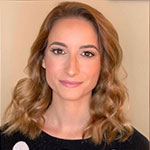 Carmen Gallego Domínguez
Profesora de “Procesos educativos y realidad escolar” y “Lengua extranjera para profesores de Educación Secundaria, Bachillerato y FP”
Professor of "Educational processes and school reality" and "Foreign language for teachers of Secondary Education, Baccalaureate and FP"
Doctora en Educación con mención internacional por la Universidad de Sevilla y Texas A&M University (Estados Unidos). Acreditada. Con estancias de investigación en República Dominicana, Texas e Israel durante su formación doctoral. Así mismo posee másteres en dirección de instituciones educativas y E-Learning (aprendizaje a través de Internet). Su formación previa es diplomada en educación primaria y licenciada en psicopedagogía. Docente en Grados de Educación Primaria, Infantil, Pedagogía; Máster en Tecnología y en Orientación Educativa. Directora de Trabajos Fin de Máster y orientadora en tesis doctorales de estudiantes internacionales. Investigadora en colaboración con universidades como Texas A&M o Coastal Carolina (Estados Unidos) y Univesity of Haifa (Israel), entre otras. Algunos de los grupos de investigación en los que forma parte como colaboradora e investigadora son el Grupo IDEA; International Study Association on Teachers and Teaching-ISATT; American Educational Research Association; Teaching, Learning and Culture in the College of Education and Human Development; entre otros. Las publicaciones versan sobre profesorado principiante, mentoría, mejora escolar y tecnologías en educación, teniendo más de ochenta publicaciones en total.
Carmen Gallego Domínguez
Profesora de “Procesos educativos y realidad escolar” y “Lengua extranjera para profesores de Educación Secundaria, Bachillerato y FP”
Professor of "Educational processes and school reality" and "Foreign language for teachers of Secondary Education, Baccalaureate and FP"
Doctora en Educación con mención internacional por la Universidad de Sevilla y Texas A&M University (Estados Unidos). Acreditada. Con estancias de investigación en República Dominicana, Texas e Israel durante su formación doctoral. Así mismo posee másteres en dirección de instituciones educativas y E-Learning (aprendizaje a través de Internet). Su formación previa es diplomada en educación primaria y licenciada en psicopedagogía. Docente en Grados de Educación Primaria, Infantil, Pedagogía; Máster en Tecnología y en Orientación Educativa. Directora de Trabajos Fin de Máster y orientadora en tesis doctorales de estudiantes internacionales. Investigadora en colaboración con universidades como Texas A&M o Coastal Carolina (Estados Unidos) y Univesity of Haifa (Israel), entre otras. Algunos de los grupos de investigación en los que forma parte como colaboradora e investigadora son el Grupo IDEA; International Study Association on Teachers and Teaching-ISATT; American Educational Research Association; Teaching, Learning and Culture in the College of Education and Human Development; entre otros. Las publicaciones versan sobre profesorado principiante, mentoría, mejora escolar y tecnologías en educación, teniendo más de ochenta publicaciones en total.
cgallego@nebrija.es
 Francisco Javier Gamo Aranda
Profesor de “Didáctica de la Física”
Professor of "Didactics of Physics"
Doctor en Ciencias Físicas (UPM, 200) y Doctor por la UNED en Innovación e Investigación en Didáctica (UNED, 2015). Acreditado. Jefe de Área en el Departamento de Investigación y Desarrollo de la FNMT. Imparte docencia en diversas asignaturas de física e informática para ingenieros de diversas universidades. Tema principal de investigación: laboratorios virtuales y remotos para la enseñanza de la Óptica y la Fotónica. Miembro de la Sociedad Española de Óptica. Revisor y miembro del consejo editorial de varias publicaciones científicas Amante de la divulgación científica (La Voz de la Ciencia, NANODYF). Licenciatario y organizador de TEDxSaintLouisUniversityMadrid.
Francisco Javier Gamo Aranda
Profesor de “Didáctica de la Física”
Professor of "Didactics of Physics"
Doctor en Ciencias Físicas (UPM, 200) y Doctor por la UNED en Innovación e Investigación en Didáctica (UNED, 2015). Acreditado. Jefe de Área en el Departamento de Investigación y Desarrollo de la FNMT. Imparte docencia en diversas asignaturas de física e informática para ingenieros de diversas universidades. Tema principal de investigación: laboratorios virtuales y remotos para la enseñanza de la Óptica y la Fotónica. Miembro de la Sociedad Española de Óptica. Revisor y miembro del consejo editorial de varias publicaciones científicas Amante de la divulgación científica (La Voz de la Ciencia, NANODYF). Licenciatario y organizador de TEDxSaintLouisUniversityMadrid.
fgamo@nebrija.es
 Claudia Liliana Gandía
Tutora de “Trabajos Fin de Máster”
End of Master's Project Tutor
Doctora Cum laude en Nuevos Lenguajes de la Comunicación por la Universidad de La Laguna, con la tesis: "TIC, género e investigación científica: uso y percepciones de las investigadoras sobre las tecnologías de la información y la comunicación". Licenciada en Psicología por la Universidad Nacional de Córdoba (Argentina). Posgrado en Docencia Universitaria en el marco de la Maestría en Docencia Universitaria (Universidad Tecnológica Nacional). Se ha desempeñado como Profesora e investigadora en la Universidad Nacional de Villa María (UNVM), Argentina. Líneas de investigación: Métodos y técnicas de investigación social-TIC-Sociología de los cuerpos y emociones. Ha ejercido el cargo de Directora de GESSYCO (Grupo de estudios Sociales sobre Subjetividades y Conflicto), ha dirigido y codirigido múltiples Proyectos de investigación y de Transferencia. Como así también el de Editora y Coordinadora general de los Documentos de Trabajo del CIES (Centro de Investigaciones y Estudios Sociológicos). Colabora como revisora externa de artículos científicos en la Revista de Estilos de Aprendizaje. Autora de libros y capítulos de libros sobre métodos y técnicas de investigación social e investigación, expresividad, creatividad, cuerpos y emociones. Directora de TFM en las líneas temáticas: TIC, Género, Tecnologías educativas y competencias digitales, Neuropsicología y educación y Gamificación.
Claudia Liliana Gandía
Tutora de “Trabajos Fin de Máster”
End of Master's Project Tutor
Doctora Cum laude en Nuevos Lenguajes de la Comunicación por la Universidad de La Laguna, con la tesis: "TIC, género e investigación científica: uso y percepciones de las investigadoras sobre las tecnologías de la información y la comunicación". Licenciada en Psicología por la Universidad Nacional de Córdoba (Argentina). Posgrado en Docencia Universitaria en el marco de la Maestría en Docencia Universitaria (Universidad Tecnológica Nacional). Se ha desempeñado como Profesora e investigadora en la Universidad Nacional de Villa María (UNVM), Argentina. Líneas de investigación: Métodos y técnicas de investigación social-TIC-Sociología de los cuerpos y emociones. Ha ejercido el cargo de Directora de GESSYCO (Grupo de estudios Sociales sobre Subjetividades y Conflicto), ha dirigido y codirigido múltiples Proyectos de investigación y de Transferencia. Como así también el de Editora y Coordinadora general de los Documentos de Trabajo del CIES (Centro de Investigaciones y Estudios Sociológicos). Colabora como revisora externa de artículos científicos en la Revista de Estilos de Aprendizaje. Autora de libros y capítulos de libros sobre métodos y técnicas de investigación social e investigación, expresividad, creatividad, cuerpos y emociones. Directora de TFM en las líneas temáticas: TIC, Género, Tecnologías educativas y competencias digitales, Neuropsicología y educación y Gamificación.
cgandia@nebrija.es
 Felipe García Gaitero
Profesor de “Matemáticas para profesores de Educación Secundaria, Bachillerato y FP”, “Didáctica de la Informática”.
Professor of "Mathematics for teachers of Secondary Education, Baccalaureate and FP", "Didactics of Informatics".
Doctor en Ciencias de la Educación por la Universidad Camilo José Cela con una tesis centrada en el uso de la Gamificación en los procesos de Enseñanza y Aprendizaje. Máster en Formación del Profesorado en la especialidad de Matemáticas. Graduado en Ingeniería Informática por la Universidad Católica de Murcia. Ingeniero Informático en la especialidad de Gestión Empresarial por la Universidad Pontificia de Salamanca.
Docente en diversos Másteres y Grados Universitarios orientados a la enseñanza en asignaturas relacionadas con STEM. Profesor en CFGS (Desarrollo de aplicaciones multiplataforma). Ha desarrollado una larga trayectoria profesional en Consultoría Informática colaborando en proyectos de importantes firmas y sectores como Banca, Delivery y Formación entre otros. Emprendedor e introductor en España de los primeros vehiculos eléctricos de movilidad personal.
Felipe García Gaitero
Profesor de “Matemáticas para profesores de Educación Secundaria, Bachillerato y FP”, “Didáctica de la Informática”.
Professor of "Mathematics for teachers of Secondary Education, Baccalaureate and FP", "Didactics of Informatics".
Doctor en Ciencias de la Educación por la Universidad Camilo José Cela con una tesis centrada en el uso de la Gamificación en los procesos de Enseñanza y Aprendizaje. Máster en Formación del Profesorado en la especialidad de Matemáticas. Graduado en Ingeniería Informática por la Universidad Católica de Murcia. Ingeniero Informático en la especialidad de Gestión Empresarial por la Universidad Pontificia de Salamanca.
Docente en diversos Másteres y Grados Universitarios orientados a la enseñanza en asignaturas relacionadas con STEM. Profesor en CFGS (Desarrollo de aplicaciones multiplataforma). Ha desarrollado una larga trayectoria profesional en Consultoría Informática colaborando en proyectos de importantes firmas y sectores como Banca, Delivery y Formación entre otros. Emprendedor e introductor en España de los primeros vehiculos eléctricos de movilidad personal.
fgarciaga@nebrija.es
 Óscar García Gaitero
Tutor de “Trabajos Fin de Máster”
End of Master's Project Tutor
Doctor en Psicología de la Educación ( Cum Laude ) por la Universidad Complutense de Madrid.
Licenciado/Grado en Psicología, Magisterio lengua extrajera y pedagogía terapéutica y en Turismo (especialidad: dirección y gestión hotelera)
Coach oficial acreditado por ASESCO ( Asociación Española de Coaching) e ICF ( International Coach Federation). Máster en Programación Neurolingüística ( PNL) formado por Frank Pucelik (co-creador de la PNL). Practitioner en INNER GAME formado por Timothy Gallway ( creador del coaching europeo). Experto en Microgestos, Análisis de la verdad y Habilidades Emocionales ( formado por Paul Ekman)
Óscar García Gaitero
Tutor de “Trabajos Fin de Máster”
End of Master's Project Tutor
Doctor en Psicología de la Educación ( Cum Laude ) por la Universidad Complutense de Madrid.
Licenciado/Grado en Psicología, Magisterio lengua extrajera y pedagogía terapéutica y en Turismo (especialidad: dirección y gestión hotelera)
Coach oficial acreditado por ASESCO ( Asociación Española de Coaching) e ICF ( International Coach Federation). Máster en Programación Neurolingüística ( PNL) formado por Frank Pucelik (co-creador de la PNL). Practitioner en INNER GAME formado por Timothy Gallway ( creador del coaching europeo). Experto en Microgestos, Análisis de la verdad y Habilidades Emocionales ( formado por Paul Ekman)
ogarciaga@nebrija.es
 Lourdes García Moreno
Profesora de “Prácticum I” y “Prácticum II”
Professor of "Practicum I" and "Practicum II"
Doctora en Ingeniería Química, acreditada, Máster en Recursos Renovables e Ingeniería Energética, Máster en Gestión Integrada de los sistemas de calidad, medioambiente y prevención de riesgos laborales, Máster en Formación del Profesorado de Educación Secundaria y Bachillerato, Formación Profesional y Enseñanza de Idiomas, Ingeniera Química. Profesora de Secundaria en Centro Pedagógico de Mérida, Profesora en la Universidad Internacional de la Rioja, Profesora de Física y química en educación secundaria en el colegio Salesianos Ramón Izquierdo de Badajoz y Profesora del módulo científico-tecnológico en el Aula de Educación para Adultos de Losar de la Vera, Cáceres.
Lourdes García Moreno
Profesora de “Prácticum I” y “Prácticum II”
Professor of "Practicum I" and "Practicum II"
Doctora en Ingeniería Química, acreditada, Máster en Recursos Renovables e Ingeniería Energética, Máster en Gestión Integrada de los sistemas de calidad, medioambiente y prevención de riesgos laborales, Máster en Formación del Profesorado de Educación Secundaria y Bachillerato, Formación Profesional y Enseñanza de Idiomas, Ingeniera Química. Profesora de Secundaria en Centro Pedagógico de Mérida, Profesora en la Universidad Internacional de la Rioja, Profesora de Física y química en educación secundaria en el colegio Salesianos Ramón Izquierdo de Badajoz y Profesora del módulo científico-tecnológico en el Aula de Educación para Adultos de Losar de la Vera, Cáceres.
lgarciamo@nebrija.es
 Patricia González Collado
Profesora de “Procesos Educativos y Realidad Escolar”, “Prácticum I” y “Prácticum II”
Professor of "Educational Processes and School Reality", "Practicum I" and "Practicum II"
Doctora en Educación por la Universidad Autónoma de Madrid con mención Cum Laude. Graduada en Pedagogía por la Universidad de Oviedo y Máster en Calidad y mejora de la Educación por la Universidad Autónoma de Madrid. Su principal línea de investigación está centrada en la Pedagogía de la Muerte en el contexto educativo y hospitalario. Es investigadora en proyectos I+D+I como “Innovación e Inclusión de la Muerte en Educación” y “Pedagogía, Pandemia y Mejora de la Educación” (Ministerio de Ciencia e Innovación). Co-autora de los libros “La práctica de la pedagogía de la muerte: Guía Educativa y Plan Lector”. Ha presentado diversas comunicaciones y ponencias en Congresos Educativos. Actualmente, es Directora del Máster en Dirección y Transformación Digital de Centros Educativos y del Máster en Gobernanza Educativa en la Universidad Antonio de Nebrija. También es docente en el Máster Universitario en Formación del Profesorado de ESO y Bachillerato, FP y Enseñanza de Idiomas (Universidad Antonio de Nebrija).
Patricia González Collado
Profesora de “Procesos Educativos y Realidad Escolar”, “Prácticum I” y “Prácticum II”
Professor of "Educational Processes and School Reality", "Practicum I" and "Practicum II"
Doctora en Educación por la Universidad Autónoma de Madrid con mención Cum Laude. Graduada en Pedagogía por la Universidad de Oviedo y Máster en Calidad y mejora de la Educación por la Universidad Autónoma de Madrid. Su principal línea de investigación está centrada en la Pedagogía de la Muerte en el contexto educativo y hospitalario. Es investigadora en proyectos I+D+I como “Innovación e Inclusión de la Muerte en Educación” y “Pedagogía, Pandemia y Mejora de la Educación” (Ministerio de Ciencia e Innovación). Co-autora de los libros “La práctica de la pedagogía de la muerte: Guía Educativa y Plan Lector”. Ha presentado diversas comunicaciones y ponencias en Congresos Educativos. Actualmente, es Directora del Máster en Dirección y Transformación Digital de Centros Educativos y del Máster en Gobernanza Educativa en la Universidad Antonio de Nebrija. También es docente en el Máster Universitario en Formación del Profesorado de ESO y Bachillerato, FP y Enseñanza de Idiomas (Universidad Antonio de Nebrija).
pgonzalezco@nebrija.es
 Ana González Menéndez
Tutora de Trabajo Fin de Máster
End of Master's Project Tutor
Doctora cum laude en Filosofía, especialidad en Teoría de las Artes y Estética, por la Universidad Complutense de Madrid. Acreditada. Licenciada en Filosofía, Posgrado en Inteligencia emocional y Educación, así como en Foreign Language Skills through Art and Culture y en Neuroeducación (Neurociencia aplicada al ámbito educativo); y Grado Profesional en Música por el Conservatorio de Madrid. Ha sido miembro de diferentes consejos de redacción y ha publicado numerosos artículos relacionados con las Artes, la Filosofía, la Música, la Teoría del Conocimiento, etc. habiendo desarrollado también trabajos con fotógrafos, arquitectos e ilustradores, y siendo intérprete en numerosos conciertos didácticos y experimentales. Además de su labor docente e investigadora en diversas instituciones, su experiencia como redactora y su trabajo en prensa han permitido que pueda estar siempre innovando y renovando las ideas y concepciones relativas a estas áreas de conocimiento. En este sentido, ha sido la ganadora del premio Lazarillo de Álbum ilustrado concedido por la OEPLI.
Ana González Menéndez
Tutora de Trabajo Fin de Máster
End of Master's Project Tutor
Doctora cum laude en Filosofía, especialidad en Teoría de las Artes y Estética, por la Universidad Complutense de Madrid. Acreditada. Licenciada en Filosofía, Posgrado en Inteligencia emocional y Educación, así como en Foreign Language Skills through Art and Culture y en Neuroeducación (Neurociencia aplicada al ámbito educativo); y Grado Profesional en Música por el Conservatorio de Madrid. Ha sido miembro de diferentes consejos de redacción y ha publicado numerosos artículos relacionados con las Artes, la Filosofía, la Música, la Teoría del Conocimiento, etc. habiendo desarrollado también trabajos con fotógrafos, arquitectos e ilustradores, y siendo intérprete en numerosos conciertos didácticos y experimentales. Además de su labor docente e investigadora en diversas instituciones, su experiencia como redactora y su trabajo en prensa han permitido que pueda estar siempre innovando y renovando las ideas y concepciones relativas a estas áreas de conocimiento. En este sentido, ha sido la ganadora del premio Lazarillo de Álbum ilustrado concedido por la OEPLI.
agonzalezme@nebrija.es
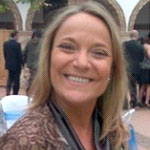 Isabel Goñi Bronte
Profesora de “Prácticum I” y “Prácticum II”
Teacher of "Practicum I" and "Practicum II"
Licenciada en Ciencias Matemáticas especializada en Estadística e Investigación opera/va (UNED). Master Europeo en Dirección de Centros Educa/vos (INESEM). Especialista del Programa del Diploma, responsable de Taller, Facilitadora Online, Miembro de delegaciones visitantes, examinadora y lectora en el Bachillerato Internacional (IB). Profesora de Matemáticas de Bachillerato en el Colegio San Patricio, El Soto. Amplia experiencia como docente de matemáticas y como ponente de nuevas metodologías aplicadas a la educación.
Isabel Goñi Bronte
Profesora de “Prácticum I” y “Prácticum II”
Teacher of "Practicum I" and "Practicum II"
Licenciada en Ciencias Matemáticas especializada en Estadística e Investigación opera/va (UNED). Master Europeo en Dirección de Centros Educa/vos (INESEM). Especialista del Programa del Diploma, responsable de Taller, Facilitadora Online, Miembro de delegaciones visitantes, examinadora y lectora en el Bachillerato Internacional (IB). Profesora de Matemáticas de Bachillerato en el Colegio San Patricio, El Soto. Amplia experiencia como docente de matemáticas y como ponente de nuevas metodologías aplicadas a la educación.
igoni@nebrija.es
 Mónica Jiménez Astudillo
Profesora de “Psicología y Educación del Adolescente” y “Atención temprana, Diagnóstico e Intervención Psicopedagógica”
Professor of "Adolescent Psychology and Education" and "Early Attention, Diagnosis and Psychopedagogical Intervention
Doctora en Ciencias de la Educación. Licenciada en Pedagogía; Máster Universitario en Educación Especial y Máster Universitario en Formación del Profesorado en la especialidad de orientación educativa por la Universidad Complutense de Madrid. Cuenta con el postgrado experto en Formación y Atención Temprana en contextos diversos y vulnerables por la Universidad Nacional de Educación a Distancia. Posee experiencia en los ámbitos de atención temprana realizando funciones de detección, evaluación e intervención en niños con trastornos en el neurodesarrollo y riesgo de padecerlos y el asesoramiento a sus familias. Sus líneas de investigación y publicaciones se focalizan en la Psicología del desarrollo; las alteraciones y trastornos del neurodesarrollo el alto riesgo biopsicosocial y la atención a la primera infancia y sus familias. Ha participado en diversos congresos sobre Educación y Psicología.
Mónica Jiménez Astudillo
Profesora de “Psicología y Educación del Adolescente” y “Atención temprana, Diagnóstico e Intervención Psicopedagógica”
Professor of "Adolescent Psychology and Education" and "Early Attention, Diagnosis and Psychopedagogical Intervention
Doctora en Ciencias de la Educación. Licenciada en Pedagogía; Máster Universitario en Educación Especial y Máster Universitario en Formación del Profesorado en la especialidad de orientación educativa por la Universidad Complutense de Madrid. Cuenta con el postgrado experto en Formación y Atención Temprana en contextos diversos y vulnerables por la Universidad Nacional de Educación a Distancia. Posee experiencia en los ámbitos de atención temprana realizando funciones de detección, evaluación e intervención en niños con trastornos en el neurodesarrollo y riesgo de padecerlos y el asesoramiento a sus familias. Sus líneas de investigación y publicaciones se focalizan en la Psicología del desarrollo; las alteraciones y trastornos del neurodesarrollo el alto riesgo biopsicosocial y la atención a la primera infancia y sus familias. Ha participado en diversos congresos sobre Educación y Psicología.
mjimenezas@nebrija.es
 Amalia Herencia Grillo
Tutora de Trabajo Fin de Máster
End of Master's Project Tutor
Amalia Herencia Grillo
Tutora de Trabajo Fin de Máster
End of Master's Project Tutor
aherencia@nebrija.es
 Ángel Carlos Herrero Lastra
Profesor de “Didáctica de la Geometría, la medida de magnitudes, y la estadística”, “Diseño de propuestas didácticas en Tecnología Industrial”, y “La Formación Profesional en Tecnología Industrial”
Professor of "Didactics of Geometry, the measurement of magnitudes, and statistics", "Design of didactic proposals in Industrial Technology", and "Professional Training in Industrial Technology"
Profesor de “Didáctica de la Geometría, la Medida de magnitudes, y la Estadística”, “Diseño de propuestas didácticas en Tecnología industrial”, “Prácticum I” y “Prácticum II”
Profesor en la especialidad de Matemáticas, Tecnología Industrial y la Ciencia y su Metodología del Máster Universitario de Formación de Profesorado de Educación Secundaria Obligatoria, Bachillerato, FP y Enseñanza de Idiomas de la Universidad Nebrija.
Docente en el Instituto de Formación Profesional Río Duero de Zamora, en la especialidad de Electricidad y Electrónica.
Miembro del grupo de investigación Intelligent Networks and Information Technologies (iNiT).
Doctorando en Ingeniería de Sistemas e Informática en la Universidad de Zaragoza, especialidad Industria 4.0 y Vehículo Eléctrico.
Ingeniero Superior Industrial en la especialidad Mecánica por la Escuela Politécnica Superior de la Universidad Europea de Madrid (UEM) e Ingeniero Técnico Industrial, especialidad Mecánica por la Escuela Politécnica Superior de Zamora, Universidad de Salamanca (USAL).
Desde 2007 ha desarrollado trabajos como Ingeniero Jefe de Proyectos en el campo de las energías renovables, sistemas eléctricos e Industria conectada, tanto a nivel nacional como internacional. Docente para la formación de Ingenieros en diferentes disciplinas relacionadas con el sector Energético, Domótica, Riesgos Laborales, Sistemas CAD y Gases Fluorados.
Presidente del Colegio Oficial de Ingenieros Industriales de Madrid COIIM – Delegación de Zamora desde el año 2017.
Ángel Carlos Herrero Lastra
Profesor de “Didáctica de la Geometría, la medida de magnitudes, y la estadística”, “Diseño de propuestas didácticas en Tecnología Industrial”, y “La Formación Profesional en Tecnología Industrial”
Professor of "Didactics of Geometry, the measurement of magnitudes, and statistics", "Design of didactic proposals in Industrial Technology", and "Professional Training in Industrial Technology"
Profesor de “Didáctica de la Geometría, la Medida de magnitudes, y la Estadística”, “Diseño de propuestas didácticas en Tecnología industrial”, “Prácticum I” y “Prácticum II”
Profesor en la especialidad de Matemáticas, Tecnología Industrial y la Ciencia y su Metodología del Máster Universitario de Formación de Profesorado de Educación Secundaria Obligatoria, Bachillerato, FP y Enseñanza de Idiomas de la Universidad Nebrija.
Docente en el Instituto de Formación Profesional Río Duero de Zamora, en la especialidad de Electricidad y Electrónica.
Miembro del grupo de investigación Intelligent Networks and Information Technologies (iNiT).
Doctorando en Ingeniería de Sistemas e Informática en la Universidad de Zaragoza, especialidad Industria 4.0 y Vehículo Eléctrico.
Ingeniero Superior Industrial en la especialidad Mecánica por la Escuela Politécnica Superior de la Universidad Europea de Madrid (UEM) e Ingeniero Técnico Industrial, especialidad Mecánica por la Escuela Politécnica Superior de Zamora, Universidad de Salamanca (USAL).
Desde 2007 ha desarrollado trabajos como Ingeniero Jefe de Proyectos en el campo de las energías renovables, sistemas eléctricos e Industria conectada, tanto a nivel nacional como internacional. Docente para la formación de Ingenieros en diferentes disciplinas relacionadas con el sector Energético, Domótica, Riesgos Laborales, Sistemas CAD y Gases Fluorados.
Presidente del Colegio Oficial de Ingenieros Industriales de Madrid COIIM – Delegación de Zamora desde el año 2017.
aherrerola@nebrija.es
 José María Jiménez Peláez
Profesor de “Tecnología e Informática para profesores de educación Secundaria, bachillerato y FP”
Professor of "Technology and Informatics for teachers of Secondary, Baccalaureate and FP education"
Doctor en Comunicación, Profesor de formación profesional básica y superior en la rama de informática y comunicaciones, además de profesor de secundaria, asesor TIC en los colegios de los Escolapios y docente del máster de profesorado de la universidad Antonio de Nebrija. Con más de 20 años de experiencia en el sector de las TIC, el audiovisual y el educativo, me he ido especializando en conocer y adaptar la comunicación a los alumnos, así como en la formación, integración y adaptación de las nuevas tecnologías. Asimismo, experto en el aprendizaje basado en juegos y gamificación, y colaborador habitual de instituciones educativas y universidades (Nebrija, Universidad Rey Juan Carlos y Kobe – Japón).
Sus principales líneas de investigación están relacionadas con el estudio de los diseños y mecánicas mejor valoradas y presentes en los juegos de mesa para su aplicación en educación, como estrategias de gamificación o como juegos para desarrollar competencias y soft skills entre el alumnado. Asimismo, investiga sobre las redes sociales predilectas y el porqué de ello entre los adolescentes, y sobre la metodología del aprendizaje-servicio.
José María Jiménez Peláez
Profesor de “Tecnología e Informática para profesores de educación Secundaria, bachillerato y FP”
Professor of "Technology and Informatics for teachers of Secondary, Baccalaureate and FP education"
Doctor en Comunicación, Profesor de formación profesional básica y superior en la rama de informática y comunicaciones, además de profesor de secundaria, asesor TIC en los colegios de los Escolapios y docente del máster de profesorado de la universidad Antonio de Nebrija. Con más de 20 años de experiencia en el sector de las TIC, el audiovisual y el educativo, me he ido especializando en conocer y adaptar la comunicación a los alumnos, así como en la formación, integración y adaptación de las nuevas tecnologías. Asimismo, experto en el aprendizaje basado en juegos y gamificación, y colaborador habitual de instituciones educativas y universidades (Nebrija, Universidad Rey Juan Carlos y Kobe – Japón).
Sus principales líneas de investigación están relacionadas con el estudio de los diseños y mecánicas mejor valoradas y presentes en los juegos de mesa para su aplicación en educación, como estrategias de gamificación o como juegos para desarrollar competencias y soft skills entre el alumnado. Asimismo, investiga sobre las redes sociales predilectas y el porqué de ello entre los adolescentes, y sobre la metodología del aprendizaje-servicio.
jjimenezpe@nebrija.es
 Beatriz Juárez Escribano
Tutora de Trabajo Fin de Máster
End of Master's Project Tutor
Doctora Cum Laude en Publicidad y Relaciones Públicas, dentro del programa de Educación y Creatividad: Aplicaciones Tecnológicas, Sociales y Psicopedagógicas. Premio Docentia 2020 a la excelencia docente. Miembro del proyecto de innovación docente “Formación en competencia intercultural en la intervención con el pueblo gitano” de la UNIZAR (programa PRAUZ ID: 308). Tengo experiencia laboral de 8 años en la producción de informativos, y también de 7 años como docente en varias instituciones como la EAE de Madrid. He orientado mi trayectoria profesional a la educación en entornos virtuales realizando cursos oficiales y micromásteres sobre el aprendizaje digital y enseñanza e-learning. He participado en numerosos congresos tanto nacionales como internaciones y publicado varios artículos en revistas y libros de alto impacto, donde trato aspectos sobre la gamificación, identidad virtual, comportamiento de los usuarios en redes sociales, entre otros. He sido profesora en la Universidad de Zadar, Croacia, a través de una beca Erasmus + para docentes.
Beatriz Juárez Escribano
Tutora de Trabajo Fin de Máster
End of Master's Project Tutor
Doctora Cum Laude en Publicidad y Relaciones Públicas, dentro del programa de Educación y Creatividad: Aplicaciones Tecnológicas, Sociales y Psicopedagógicas. Premio Docentia 2020 a la excelencia docente. Miembro del proyecto de innovación docente “Formación en competencia intercultural en la intervención con el pueblo gitano” de la UNIZAR (programa PRAUZ ID: 308). Tengo experiencia laboral de 8 años en la producción de informativos, y también de 7 años como docente en varias instituciones como la EAE de Madrid. He orientado mi trayectoria profesional a la educación en entornos virtuales realizando cursos oficiales y micromásteres sobre el aprendizaje digital y enseñanza e-learning. He participado en numerosos congresos tanto nacionales como internaciones y publicado varios artículos en revistas y libros de alto impacto, donde trato aspectos sobre la gamificación, identidad virtual, comportamiento de los usuarios en redes sociales, entre otros. He sido profesora en la Universidad de Zadar, Croacia, a través de una beca Erasmus + para docentes.
mjuareze@nebrija.es
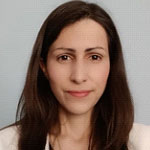 Victoria Eugenia Lamas Álvarez
Profesora de “Didáctica de la Geografía”
Professor of "Didactics of Geography"
Doctora en Filosofía por las Universidades de Valladolid y Salamanca. Máster en Patrimonio Histórico: investigación y gestión por la UCLM; Licenciada en Historia del Arte (UVa). Acreditada por ANECA como Profesora Contratada Doctora y poseedora de un sexenio de investigación. Actualmente desempeña su actividad como Directora del Máster en Metodologías Docentes, Profesora de grado y posgrado de la Facultad de Lenguas y Educación de la Universidad Nebrija. Desarrolla su carrera docente desde 2016 en diversas Universidades en los ámbitos de Didáctica de las Ciencias Sociales y Didáctica de la Expresión Musical, en los Grados en Educación Infantil y Primaria; Innovación Docente en el Máster de Profesorado; Nuevas Tecnologías aplicadas a la Didáctica Musical y Didáctica de la Historia de la Música en la Mención en Educación Musical. Becada por la Universidad C. San Pablo de Arequipa (Perú) donde ha desarrollado diversas actividades docentes e investigadoras en torno a la Innovación docente y la Didáctica del Patrimonio Cultural (2020-2022).
Victoria Eugenia Lamas Álvarez
Profesora de “Didáctica de la Geografía”
Professor of "Didactics of Geography"
Doctora en Filosofía por las Universidades de Valladolid y Salamanca. Máster en Patrimonio Histórico: investigación y gestión por la UCLM; Licenciada en Historia del Arte (UVa). Acreditada por ANECA como Profesora Contratada Doctora y poseedora de un sexenio de investigación. Actualmente desempeña su actividad como Directora del Máster en Metodologías Docentes, Profesora de grado y posgrado de la Facultad de Lenguas y Educación de la Universidad Nebrija. Desarrolla su carrera docente desde 2016 en diversas Universidades en los ámbitos de Didáctica de las Ciencias Sociales y Didáctica de la Expresión Musical, en los Grados en Educación Infantil y Primaria; Innovación Docente en el Máster de Profesorado; Nuevas Tecnologías aplicadas a la Didáctica Musical y Didáctica de la Historia de la Música en la Mención en Educación Musical. Becada por la Universidad C. San Pablo de Arequipa (Perú) donde ha desarrollado diversas actividades docentes e investigadoras en torno a la Innovación docente y la Didáctica del Patrimonio Cultural (2020-2022).
vlamas@nebrija.es
 Sergio Larragueta de Mingo
Profesor de “Dinámica de Grupos y Diversidad”
Professor of "Group Dynamics and Diversity"
Profesor de didáctica de la Educación Física y de Dinámica de Grupos y Diversidad. Graduado en Ciencias de la Actividad Física y el Deporte (UAM), Graduando en Turismo (UNED) y Máster en Formación del Profesorado y Educación (VIU). Numerosos cursos relacionados con la docencia de la educación física, el entrenamiento personal y la preparación física. Jefe del Departamento de Educación Física del Colegio San Patricio. Jugador y entrenador de baloncesto. Pasión por el deporte y su enseñanza.
Sergio Larragueta de Mingo
Profesor de “Dinámica de Grupos y Diversidad”
Professor of "Group Dynamics and Diversity"
Profesor de didáctica de la Educación Física y de Dinámica de Grupos y Diversidad. Graduado en Ciencias de la Actividad Física y el Deporte (UAM), Graduando en Turismo (UNED) y Máster en Formación del Profesorado y Educación (VIU). Numerosos cursos relacionados con la docencia de la educación física, el entrenamiento personal y la preparación física. Jefe del Departamento de Educación Física del Colegio San Patricio. Jugador y entrenador de baloncesto. Pasión por el deporte y su enseñanza.
slarragueta@nebrija.es
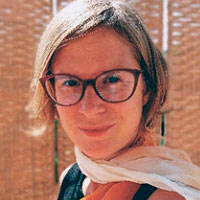 Eva Llergo Ojalvo
Profesora de "Didáctica de la Literatura Española"
Professor of "Didactics of Spanish Literature"
Doctora en Literatura Española por la Universidad Complutense de Madrid; especialista en teatro. Profesora de Didáctica de la Lengua y la Literatura en las etapas de Infantil, Primaria y Secundaria y de innovación educativa. Autora del del álbum ilustrado Los siete pedazos de mi corazón (Babidi-bú, 2020) y de la obra teatral para adolescentes Tonto, loco, salvaje (Ñaque, 2021; estreno 2022) Narradora oral, actriz y dramaturga en el grupo de narración oral y teatro De boca en boca desde 2001 y coordinadora principal desde 2005 de la revista El pequeño espectador destinada a la crítica teatral de espectáculos dedicados a la infancia y la juventud.
Eva Llergo Ojalvo
Profesora de "Didáctica de la Literatura Española"
Professor of "Didactics of Spanish Literature"
Doctora en Literatura Española por la Universidad Complutense de Madrid; especialista en teatro. Profesora de Didáctica de la Lengua y la Literatura en las etapas de Infantil, Primaria y Secundaria y de innovación educativa. Autora del del álbum ilustrado Los siete pedazos de mi corazón (Babidi-bú, 2020) y de la obra teatral para adolescentes Tonto, loco, salvaje (Ñaque, 2021; estreno 2022) Narradora oral, actriz y dramaturga en el grupo de narración oral y teatro De boca en boca desde 2001 y coordinadora principal desde 2005 de la revista El pequeño espectador destinada a la crítica teatral de espectáculos dedicados a la infancia y la juventud.
ellergo@nebrija.es
 Raúl López Beltrán
Profesor de “Psicología y Educación del Adolescente”
Professor of "Adolescent Psychology and Education"
Graduado en Psicología por la UNED. Posgrado de Especialista en Psicoterapia de niños y adolescentes en Centro de Psicoterapia y Formación QUIPÚ. Cursando Máster en Psicología General Sanitaria. Experiencia en psicoterapia de niños, adolescentes y adultos en Centro de Psicoterapia y Formación QUIPÚ, ámbito en el que he desarrollado la práctica psicoterapéutica en los últimos años. Experiencia el ámbito sociosanitario en el área de adicciones y exclusión social, aplicando intervenciones en pacientes vulnerables con diferentes necesidades, en Asociación Atiempo.
Raúl López Beltrán
Profesor de “Psicología y Educación del Adolescente”
Professor of "Adolescent Psychology and Education"
Graduado en Psicología por la UNED. Posgrado de Especialista en Psicoterapia de niños y adolescentes en Centro de Psicoterapia y Formación QUIPÚ. Cursando Máster en Psicología General Sanitaria. Experiencia en psicoterapia de niños, adolescentes y adultos en Centro de Psicoterapia y Formación QUIPÚ, ámbito en el que he desarrollado la práctica psicoterapéutica en los últimos años. Experiencia el ámbito sociosanitario en el área de adicciones y exclusión social, aplicando intervenciones en pacientes vulnerables con diferentes necesidades, en Asociación Atiempo.
rlopezbe@nebrija.es
 Pablo José López Tenorio
Profesor de “Didáctica de la Economía”
Professor of "Didactics of Economics"
Pablo José López Tenorio
Profesor de “Didáctica de la Economía”
Professor of "Didactics of Economics"
plopezte@nebrija.es
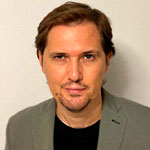 Pablo Luna Nogales
Profesor de “Psicología y Educación del Adolescente”
Professor of "Adolescent Psychology and Education"
Doctor en Educación (Cum Laude) (UCLM). Su tesis doctoral obtuvo el Premio Extraordinario de Doctorado e Investigación en 2021 (UCLM). Acreditado en Psicología Evolutiva y de la Educación como Contratado Doctor (ANECA). Máster en Investigación en Psicología Aplicada (UCLM) (Premio Extraordinario Fin de Máster) en la Facultad de Medicina de Albacete. Máster Universitario en Investigación e Innovación Educativa (UCLM). Formador en Educación e Inteligencia Emocional. Autor de varias publicaciones científicas (WOS-JCR) en Psicología, Educación y Salud Pública. Estancias Internacionales y Nacionales en el ámbito universitario. Participa en Proyectos Internacionales y Nacionales de Investigación. Miembro de los grupos de investigación: Emoción y Cognición Social en Contextos Básicos, Clínicos y Educativos (EMOCOG) (UCLM) y del Laboratorio de Educación Emocional (EDUEMO Lab.) (UNED).
Pablo Luna Nogales
Profesor de “Psicología y Educación del Adolescente”
Professor of "Adolescent Psychology and Education"
Doctor en Educación (Cum Laude) (UCLM). Su tesis doctoral obtuvo el Premio Extraordinario de Doctorado e Investigación en 2021 (UCLM). Acreditado en Psicología Evolutiva y de la Educación como Contratado Doctor (ANECA). Máster en Investigación en Psicología Aplicada (UCLM) (Premio Extraordinario Fin de Máster) en la Facultad de Medicina de Albacete. Máster Universitario en Investigación e Innovación Educativa (UCLM). Formador en Educación e Inteligencia Emocional. Autor de varias publicaciones científicas (WOS-JCR) en Psicología, Educación y Salud Pública. Estancias Internacionales y Nacionales en el ámbito universitario. Participa en Proyectos Internacionales y Nacionales de Investigación. Miembro de los grupos de investigación: Emoción y Cognición Social en Contextos Básicos, Clínicos y Educativos (EMOCOG) (UCLM) y del Laboratorio de Educación Emocional (EDUEMO Lab.) (UNED).
pluna@nebrija.es
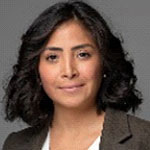 Montserrat Magro Gutiérrez
Tutora de Trabajo Fin de Máster
Master's Final Project Tutor
Doctora en Educación Cum Laude por la Universidad Camilo José Cela (mención internacional); Máster en Pedagogía por la Universidad del Sur (Chiapas, México); Licenciada en Educación Preescolar por la Escuela Normal de Educadoras “Bertha Von Glummer y Leyva (Chiapas, México). Forma parte del Think Tank "EduSoC Lab: Educación, Sociedad y Cultura" de la Universidad Complutense de Madrid y del equipo editorial de la Revista Estilos de Aprendizaje (ISSN: 1988-8996) / Journal of Learning Styles (ISSN: 2332-8533), coordinada y editada por Edusoc Lab, en colaboración con UTAH Valley University y la Editorial Universitas. Ha sido docente de Educación Infantil en centros educativos privados y públicos (rurales y urbanos). Ha colaborado como asesora técnico-pedagógica del programa de Desarrollo Curricular Preescolar de la Secretaría de Educación Pública y ha formado parte del grupo de asesores del Subsecretario de Educación Federalizada del Estado de Chiapas, México. En el ámbito universitario ha desarrollado proyectos de intercambio internacional docente en la Universidad de Maribor, Eslovenia, así como en otras instituciones españolas de Educación Superior. Ha formado parte de proyectos educativos universitarios creado por y para jóvenes con requerimientos de aprendizaje específicos. Ha asistido a diversos congresos nacionales e internacionales; y ha formado parte del comité organizador y evaluador de distintos encuentros de educación. Ha publicado diversos artículos científicos y capítulos de libro. Es experta en formación del profesorado; educación multigrado en el contexto rural; educación inclusiva; atención y educación de la primera infancia; políticas educativas para países en vías de desarrollo; Educación Comparada; análisis y diseño curricular, entre otros.
Montserrat Magro Gutiérrez
Tutora de Trabajo Fin de Máster
Master's Final Project Tutor
Doctora en Educación Cum Laude por la Universidad Camilo José Cela (mención internacional); Máster en Pedagogía por la Universidad del Sur (Chiapas, México); Licenciada en Educación Preescolar por la Escuela Normal de Educadoras “Bertha Von Glummer y Leyva (Chiapas, México). Forma parte del Think Tank "EduSoC Lab: Educación, Sociedad y Cultura" de la Universidad Complutense de Madrid y del equipo editorial de la Revista Estilos de Aprendizaje (ISSN: 1988-8996) / Journal of Learning Styles (ISSN: 2332-8533), coordinada y editada por Edusoc Lab, en colaboración con UTAH Valley University y la Editorial Universitas. Ha sido docente de Educación Infantil en centros educativos privados y públicos (rurales y urbanos). Ha colaborado como asesora técnico-pedagógica del programa de Desarrollo Curricular Preescolar de la Secretaría de Educación Pública y ha formado parte del grupo de asesores del Subsecretario de Educación Federalizada del Estado de Chiapas, México. En el ámbito universitario ha desarrollado proyectos de intercambio internacional docente en la Universidad de Maribor, Eslovenia, así como en otras instituciones españolas de Educación Superior. Ha formado parte de proyectos educativos universitarios creado por y para jóvenes con requerimientos de aprendizaje específicos. Ha asistido a diversos congresos nacionales e internacionales; y ha formado parte del comité organizador y evaluador de distintos encuentros de educación. Ha publicado diversos artículos científicos y capítulos de libro. Es experta en formación del profesorado; educación multigrado en el contexto rural; educación inclusiva; atención y educación de la primera infancia; políticas educativas para países en vías de desarrollo; Educación Comparada; análisis y diseño curricular, entre otros.
mmagro@nebrija.es
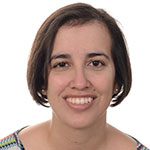 Nausica Marcos Miguel
Tutora de Trabajo Fin de Máster
Master's Final Project Tutor
Licenciada en Filología alemana por la Universidad Complutense de Madrid y Doctora en Lingüística Hispánica por la Universidad de Pittsburgh. Su área de especialización es la adquisición del español en el contexto del aula, especialmente la adquisición y enseñanza de la morfología y del vocabulario. También está muy interesada en la influencia de los materiales didácticos para el aprendizaje y la enseñanza. Ha trabajado como profesora de español, inglés y alemán. Actualmente trabaja en la Universidad de Denison donde imparte clases de español L2 y Lingüística.
Nausica Marcos Miguel
Tutora de Trabajo Fin de Máster
Master's Final Project Tutor
Licenciada en Filología alemana por la Universidad Complutense de Madrid y Doctora en Lingüística Hispánica por la Universidad de Pittsburgh. Su área de especialización es la adquisición del español en el contexto del aula, especialmente la adquisición y enseñanza de la morfología y del vocabulario. También está muy interesada en la influencia de los materiales didácticos para el aprendizaje y la enseñanza. Ha trabajado como profesora de español, inglés y alemán. Actualmente trabaja en la Universidad de Denison donde imparte clases de español L2 y Lingüística.
nmarcosm@nebrija.es
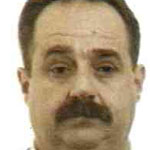 José Luis Marcos Lorenzo
Tutor de Trabajo Fin de Máster
Master's Final Project Tutor
Profesor Titular en la Universidad de Alcalá en el departamento de Física y Matemáticas. Doctor acreditado. Imparte docencia en el Grado de Magisterio de Educación primaria en las asignaturas de “Didáctica de las Matemáticas” y “Matemáticas II”. Tiene numerosas publicaciones de Libros, capítulos de libro y artículos, al igual que ha participado en varios proyectos de investigación.
José Luis Marcos Lorenzo
Tutor de Trabajo Fin de Máster
Master's Final Project Tutor
Profesor Titular en la Universidad de Alcalá en el departamento de Física y Matemáticas. Doctor acreditado. Imparte docencia en el Grado de Magisterio de Educación primaria en las asignaturas de “Didáctica de las Matemáticas” y “Matemáticas II”. Tiene numerosas publicaciones de Libros, capítulos de libro y artículos, al igual que ha participado en varios proyectos de investigación.
jmarcosl@nebrija.es
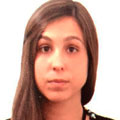 Begoña Martín Alonso
Tutora de Trabajo Fin de Máster
Master's Final Project Tutor
Doctora en Lingüística Aplicada a la Enseñanza de ELE por la Universidad Nebrija (Mención Doctorado Internacional), Máster en Lingüística Aplicada a la Enseñanza de ELE por la misma universidad, Máster en Formación del Profesorado de ESO, Bachillerato, FP y Enseñanza de Idiomas por la Universidad Internacional de Valencia y Licenciada en Traducción e Interpretación por la Universidad de Granada. Trabajó como docente en los grados y posgrados de ELE de la Universidad Javeriana de Bogotá. Sus líneas de investigación son la evaluación académica, el diseño y validación de exámenes, el diseño de materiales y el uso de las TICs para la evaluación.
Begoña Martín Alonso
Tutora de Trabajo Fin de Máster
Master's Final Project Tutor
Doctora en Lingüística Aplicada a la Enseñanza de ELE por la Universidad Nebrija (Mención Doctorado Internacional), Máster en Lingüística Aplicada a la Enseñanza de ELE por la misma universidad, Máster en Formación del Profesorado de ESO, Bachillerato, FP y Enseñanza de Idiomas por la Universidad Internacional de Valencia y Licenciada en Traducción e Interpretación por la Universidad de Granada. Trabajó como docente en los grados y posgrados de ELE de la Universidad Javeriana de Bogotá. Sus líneas de investigación son la evaluación académica, el diseño y validación de exámenes, el diseño de materiales y el uso de las TICs para la evaluación.
bmartinal@nebrija.es
 Margarita Martín Martín
Profesora de “Psicología y educación del adolescente”, “Apoyo a la acción tutorial en el centro”
Professor of "Psychology and adolescent education", "Support for tutorial action at the center"
Doctora en psicología evolutiva y de la educación, tesis sobre aspectos psicosociales y emocionales de la adolescencia en relación a las redes sociales. Psicóloga y piscopedagoga. Líneas de investigación principales: desarrollo social, emocional y moral, formación el profesorado y redes sociales
Margarita Martín Martín
Profesora de “Psicología y educación del adolescente”, “Apoyo a la acción tutorial en el centro”
Professor of "Psychology and adolescent education", "Support for tutorial action at the center"
Doctora en psicología evolutiva y de la educación, tesis sobre aspectos psicosociales y emocionales de la adolescencia en relación a las redes sociales. Psicóloga y piscopedagoga. Líneas de investigación principales: desarrollo social, emocional y moral, formación el profesorado y redes sociales
mamartinma@nebrija.es
 Alejandro Antonio Martínez Jiménez
Profesor de “Diseño de Propuestas Didácticas en Economía, Empresa y Comercio”
Professor of "Design of Didactic Proposals in Economics, Business and Commerce"
Licenciado en Administración y Dirección de Empresas por la Universidad Carlos III de Madrid.
Máster en Formación del Profesorado por la Universidad Internacional de la Rioja. Máster en Dirección de Empresas y Marketing por la UNED. Experiencia laboral como miembro del equipo de auditoría en la firma internacional Ernst & Young en la oficina de Madrid. Profesor de enseñanza secundaria y bachillerato durante 10 años en los departamentos de matemáticas y economía en colegios de Madrid.
Jefe de Estudios de Secundaria y Bachillerato durante 8 años en el colegio Santísima Trinidad de Alcorcón.
Alejandro Antonio Martínez Jiménez
Profesor de “Diseño de Propuestas Didácticas en Economía, Empresa y Comercio”
Professor of "Design of Didactic Proposals in Economics, Business and Commerce"
Licenciado en Administración y Dirección de Empresas por la Universidad Carlos III de Madrid.
Máster en Formación del Profesorado por la Universidad Internacional de la Rioja. Máster en Dirección de Empresas y Marketing por la UNED. Experiencia laboral como miembro del equipo de auditoría en la firma internacional Ernst & Young en la oficina de Madrid. Profesor de enseñanza secundaria y bachillerato durante 10 años en los departamentos de matemáticas y economía en colegios de Madrid.
Jefe de Estudios de Secundaria y Bachillerato durante 8 años en el colegio Santísima Trinidad de Alcorcón.
amartinezjim@nebrija.es
 Domingo Martínez Rosario
Profesor de “Diseño gráfico y arte digital”
Professor of "Graphic Design and Digital Art"
Doctor en Bellas Artes por la Universidad Politécnica de Valencia (Cum Laude y Mención Internacional).
Estancia de investigación para el doctorado en la Escuela de Estudios Avanzados de la Universidad de Londres. Máster en Artes Visuales e Intermedia y CAP por la Universidad Politécnica de Valencia. Licenciatura en Bellas Artes por la Universidad de Salamanca. Como investigador ha dado conferencias sobre Arte Contemporáneo y Cultura de la Memoria en Croacia, España, Holanda, Inglaterra, Alemania y Polonia. Actualmente trabaja en un artículo para un libro que será publicado en 2017 por la Universidad de Cambridge, Inglaterra. Posee el Certificado C1 en inglés, según Marco Europeo de Referencia. Expedido por la Universidad Politécnica de Valencia. 2012. Ha participado en varios proyectos artísticos (King’s College University, Londres), ha obtenido becas de arte y premios de arte (Fundación Antonio Gala, Convivencia Terra de Sanxenxo, Beca Zurbarán de la Junta de Extremadura) y ha realizado exposiciones en Badajoz, Salamanca, Córdoba e Inglaterra. Como experiencia docente, ha trabajado como profesor de arte en colegios de secundaria en Londres, desde 2013 a 2016, y ha realizado talleres en universidades (Salamanca, Valencia, King’s College University).
Domingo Martínez Rosario
Profesor de “Diseño gráfico y arte digital”
Professor of "Graphic Design and Digital Art"
Doctor en Bellas Artes por la Universidad Politécnica de Valencia (Cum Laude y Mención Internacional).
Estancia de investigación para el doctorado en la Escuela de Estudios Avanzados de la Universidad de Londres. Máster en Artes Visuales e Intermedia y CAP por la Universidad Politécnica de Valencia. Licenciatura en Bellas Artes por la Universidad de Salamanca. Como investigador ha dado conferencias sobre Arte Contemporáneo y Cultura de la Memoria en Croacia, España, Holanda, Inglaterra, Alemania y Polonia. Actualmente trabaja en un artículo para un libro que será publicado en 2017 por la Universidad de Cambridge, Inglaterra. Posee el Certificado C1 en inglés, según Marco Europeo de Referencia. Expedido por la Universidad Politécnica de Valencia. 2012. Ha participado en varios proyectos artísticos (King’s College University, Londres), ha obtenido becas de arte y premios de arte (Fundación Antonio Gala, Convivencia Terra de Sanxenxo, Beca Zurbarán de la Junta de Extremadura) y ha realizado exposiciones en Badajoz, Salamanca, Córdoba e Inglaterra. Como experiencia docente, ha trabajado como profesor de arte en colegios de secundaria en Londres, desde 2013 a 2016, y ha realizado talleres en universidades (Salamanca, Valencia, King’s College University).
dmartinezr@nebrija.es
 Carlos José Martos Rodríguez
Tutor de "Trabajo Fin de Máster"
End of Master's Project Tutor
Graduado en Biotecnología por la Universidad Pablo de Olavide (2013), con excelentes resultados académicos. Disfrutó de una estancia en el extranjero de 6 meses en la Universidad de North Central College (2011), Chicago (EEUU). Máster en Biomedicina Regenerativa por la Universidad de Granada (2015), especializándose en el campo de la búsqueda de antiinfectivos frente a microorganismos resistentes, con investigaciones financiadas por diversos organismos (Banco Santander, Junta de Andalucía y Universidad de Granada). Ha asistido a diversos congresos para la presentación de resultados, como ANQUE-ICCE-BIOTEC 2014, o la International Conference on Antimicrobial Research. Actualmente se encuentra finalizando su doctorado en Biociencias Moleculares por la Universidad Autónoma de Madrid, en la Fundación Centro Nacional de Investigaciones Cardiovasculares (supervisado por el Dr.D Jacob Fog Bentzon) en el ámbito de la aterosclerosis. Asimismo, desarrolla su labor como docente en la Universidad Nebrija, en el ámbito de la Formación Profesional y los Procesos Sanitarios, y mediante la tutorización de trabajos fin de máster.
Carlos José Martos Rodríguez
Tutor de "Trabajo Fin de Máster"
End of Master's Project Tutor
Graduado en Biotecnología por la Universidad Pablo de Olavide (2013), con excelentes resultados académicos. Disfrutó de una estancia en el extranjero de 6 meses en la Universidad de North Central College (2011), Chicago (EEUU). Máster en Biomedicina Regenerativa por la Universidad de Granada (2015), especializándose en el campo de la búsqueda de antiinfectivos frente a microorganismos resistentes, con investigaciones financiadas por diversos organismos (Banco Santander, Junta de Andalucía y Universidad de Granada). Ha asistido a diversos congresos para la presentación de resultados, como ANQUE-ICCE-BIOTEC 2014, o la International Conference on Antimicrobial Research. Actualmente se encuentra finalizando su doctorado en Biociencias Moleculares por la Universidad Autónoma de Madrid, en la Fundación Centro Nacional de Investigaciones Cardiovasculares (supervisado por el Dr.D Jacob Fog Bentzon) en el ámbito de la aterosclerosis. Asimismo, desarrolla su labor como docente en la Universidad Nebrija, en el ámbito de la Formación Profesional y los Procesos Sanitarios, y mediante la tutorización de trabajos fin de máster.
cmartos@nebrija.es
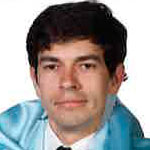 David Méndez Coca
Profesor de “Didáctica de la aritmética y el algebra”
Professor of "Didactics of Arithmetic and Algebra"
Doctor en ciencias de la educación, acreditado como profesor titular, un sexenio de investigación, ha impartido asignaturas de las especialidades de Física y Química, Matemáticas y Tecnología del Máster del profesorado en varias universidades desde el 2011, ha dado clase en Eso y Bachillerato desde 2002 hasta 2011.
David Méndez Coca
Profesor de “Didáctica de la aritmética y el algebra”
Professor of "Didactics of Arithmetic and Algebra"
Doctor en ciencias de la educación, acreditado como profesor titular, un sexenio de investigación, ha impartido asignaturas de las especialidades de Física y Química, Matemáticas y Tecnología del Máster del profesorado en varias universidades desde el 2011, ha dado clase en Eso y Bachillerato desde 2002 hasta 2011.
dmendez@nebrija.es
 Sergio Méndez de la Calle
Profesor de “Prácticum I” y “Prácticum II”
Professor of "Practicum I" and "Practicum II"
Doctorando en Educación (UAM). Línea de investigación: impacto de las NTIC en el rendimiento académico. Máster en Tecnología Digital aplicada a la práctica docente (UCJC). Grado en Educación Primaria + Mención Inglés (UNIR). Diplomado en Magisterio Educación Infantil (UCM). Experiencia docente de 15 años como Maestro de Infantil y Primaria. Director técnico de Infantil y Primaria. Jefe de Estudios. Coordinador TIC y de Proyecto Bicultural.
Sergio Méndez de la Calle
Profesor de “Prácticum I” y “Prácticum II”
Professor of "Practicum I" and "Practicum II"
Doctorando en Educación (UAM). Línea de investigación: impacto de las NTIC en el rendimiento académico. Máster en Tecnología Digital aplicada a la práctica docente (UCJC). Grado en Educación Primaria + Mención Inglés (UNIR). Diplomado en Magisterio Educación Infantil (UCM). Experiencia docente de 15 años como Maestro de Infantil y Primaria. Director técnico de Infantil y Primaria. Jefe de Estudios. Coordinador TIC y de Proyecto Bicultural.
smendeca@nebrija.es
 Susana Méndez Gago
Profesora de “Psicología y educación del adolescente”
Professor of "Psychology and education of adolescents"
Doctora en Ciencias de la Educación por la UCJC. Acreditada por la ACSUCYL y en proceso de resolución por ANECA. Pscióloga Clínica Acreditada. Experta en Educación para la Salud y Especialista en Dirección de Fundaciones. Docente universitaria desde 1994. Directora de Cátedra de Desarrollo Social UCJC (2009/19), Directora del Grado de Educación Social UCJC (2011/15). Puestos de dirección en Fundación GE Social (2006/12)y Educa Consulting (2012/2014). Jefe de Departamento Fundación de Ayuda contra la Drogadicción (1995/2005). Amplia experiencia en intervención social con colectivos vulnerables. Investigadora y escritora de ensayos.
Susana Méndez Gago
Profesora de “Psicología y educación del adolescente”
Professor of "Psychology and education of adolescents"
Doctora en Ciencias de la Educación por la UCJC. Acreditada por la ACSUCYL y en proceso de resolución por ANECA. Pscióloga Clínica Acreditada. Experta en Educación para la Salud y Especialista en Dirección de Fundaciones. Docente universitaria desde 1994. Directora de Cátedra de Desarrollo Social UCJC (2009/19), Directora del Grado de Educación Social UCJC (2011/15). Puestos de dirección en Fundación GE Social (2006/12)y Educa Consulting (2012/2014). Jefe de Departamento Fundación de Ayuda contra la Drogadicción (1995/2005). Amplia experiencia en intervención social con colectivos vulnerables. Investigadora y escritora de ensayos.
smendez@nebrija.es
 Ana María Mirmán Flores
Profesora de “Educación, sociedad y política educativa”
Professor of "Education, society and educational policy"
Doctora en Educación con mención internacional por la Universidad de Sevilla (Mención Doctorado Internacional). Licenciada en Pedagogía y Máster Universitario en Dirección, Evaluación y Calidad de Instituciones de Formación, ambos por la Universidad de Sevilla.
Miembro del grupo de investigación SEJ509: Evaluación en Contextos Formativos. Investigadora en proyectos I+D+i y Proyectos de Excelencia de la Junta de Andalucía y del Plan Estatal del Ministerio. Líneas de investigación principales: 1) Aprendizaje no formal y alfabetización multimodal; 2) Aprendizaje del inglés como lengua extranjera y metodología CLIL; 3) Evaluación de contextos formativos; 4) Evaluación de la calidad educativa.
Ana María Mirmán Flores
Profesora de “Educación, sociedad y política educativa”
Professor of "Education, society and educational policy"
Doctora en Educación con mención internacional por la Universidad de Sevilla (Mención Doctorado Internacional). Licenciada en Pedagogía y Máster Universitario en Dirección, Evaluación y Calidad de Instituciones de Formación, ambos por la Universidad de Sevilla.
Miembro del grupo de investigación SEJ509: Evaluación en Contextos Formativos. Investigadora en proyectos I+D+i y Proyectos de Excelencia de la Junta de Andalucía y del Plan Estatal del Ministerio. Líneas de investigación principales: 1) Aprendizaje no formal y alfabetización multimodal; 2) Aprendizaje del inglés como lengua extranjera y metodología CLIL; 3) Evaluación de contextos formativos; 4) Evaluación de la calidad educativa.
amirman@nebrija.es
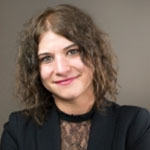 Ocarina Massid Blanco
Tutora de "Trabajo Fin de Máster"
End of Master's Project Tutor
Doctora en Filología, especialidad Lingüística Aplicada a la Enseñanza de ELE, por la Universidad Complutense de Madrid. Acreditada. Máster en Enseñanza de Español como Segunda Lengua por la Universidad Complutense y Licenciada en Filología Hispánica por la Universidad de Santiago de Compostela. Profesora de Español para extranjeros desde 2008. Actualmente es profesora de postgrado en el Departamento de Lenguas Aplicadas y Educación de la Universidad Nebrija. Miembro del grupo de investigación LAELE. Sus líneas de investigación abarcan la enseñanza del léxico, la Lingüística cognitiva y las TIC aplicadas a la didáctica de lenguas.
Ocarina Massid Blanco
Tutora de "Trabajo Fin de Máster"
End of Master's Project Tutor
Doctora en Filología, especialidad Lingüística Aplicada a la Enseñanza de ELE, por la Universidad Complutense de Madrid. Acreditada. Máster en Enseñanza de Español como Segunda Lengua por la Universidad Complutense y Licenciada en Filología Hispánica por la Universidad de Santiago de Compostela. Profesora de Español para extranjeros desde 2008. Actualmente es profesora de postgrado en el Departamento de Lenguas Aplicadas y Educación de la Universidad Nebrija. Miembro del grupo de investigación LAELE. Sus líneas de investigación abarcan la enseñanza del léxico, la Lingüística cognitiva y las TIC aplicadas a la didáctica de lenguas.
omassid@nebrija.es
 Natalia Mora López
Tutora de "Trabajo Fin de Máster"
End of Master's Project Tutor
Licenciada en Filología Inglesa y Filología Hispánica en la Universidad Complutense de Madrid (2010 y 2013, respectivamente). También posee dos títulos de máster, uno en Lingüística Inglesa (2011) y otro en Formación del Profesorado (especialidad en Lengua Inglesa) (2013). En 2017, obtuvo el título de doctora en Lingüística Inglesa en la misma universidad. Respecto a su trayectoria profesional, Natalia ha trabajado tanto en el ámbito empresarial como en el académico, como lingüista computacional, traductora y correctora por un lado, y como profesora de inglés y lengua española y literatura, por otro, en distintos centros (Escuela Politécnica Giner, ISEP CEU) y universidades (UCM, Nebrija, USP CEU, VIU, UNIR) tanto en títulos presenciales como online de grado y máster. Las principales áreas de investigación en las que se enmarca su actividad son el uso de las TIC y la enseñanza de lengua extranjera, lingüística de corpus y lingüística contrastiva (inglés-español), y el uso del lenguaje evaluativo y la expresión de la opinión.
Natalia Mora López
Tutora de "Trabajo Fin de Máster"
End of Master's Project Tutor
Licenciada en Filología Inglesa y Filología Hispánica en la Universidad Complutense de Madrid (2010 y 2013, respectivamente). También posee dos títulos de máster, uno en Lingüística Inglesa (2011) y otro en Formación del Profesorado (especialidad en Lengua Inglesa) (2013). En 2017, obtuvo el título de doctora en Lingüística Inglesa en la misma universidad. Respecto a su trayectoria profesional, Natalia ha trabajado tanto en el ámbito empresarial como en el académico, como lingüista computacional, traductora y correctora por un lado, y como profesora de inglés y lengua española y literatura, por otro, en distintos centros (Escuela Politécnica Giner, ISEP CEU) y universidades (UCM, Nebrija, USP CEU, VIU, UNIR) tanto en títulos presenciales como online de grado y máster. Las principales áreas de investigación en las que se enmarca su actividad son el uso de las TIC y la enseñanza de lengua extranjera, lingüística de corpus y lingüística contrastiva (inglés-español), y el uso del lenguaje evaluativo y la expresión de la opinión.
nmora@nebrija.es
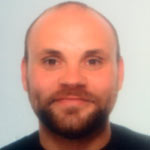 Erik Christian Mordt Rodíguez
Profesor de “Planificación y organización de actividades deportivas”
Professor of "Didactics of the English language"
Trabajo de profesor de Educación Física desde el año 2002, con alumnos de todas las edades. Siempre en el Colegio Estudio de Madrid, y con mucho interés en traspasar las clases hacia hábitos y costumbres saludables para los alumnos. Ese trabajo lo he combinado con el entrenamiento y coordinación del Club Deportivo del colegio, y desde hace un año con las clases en la universidad.
Erik Christian Mordt Rodíguez
Profesor de “Planificación y organización de actividades deportivas”
Professor of "Didactics of the English language"
Trabajo de profesor de Educación Física desde el año 2002, con alumnos de todas las edades. Siempre en el Colegio Estudio de Madrid, y con mucho interés en traspasar las clases hacia hábitos y costumbres saludables para los alumnos. Ese trabajo lo he combinado con el entrenamiento y coordinación del Club Deportivo del colegio, y desde hace un año con las clases en la universidad.
emordt@nebrija.es
 Loida Moya Smith
Profesora de “Aprendizaje y Enseñanza de los procesos sanitarios I”
Professor of "Learning and Teaching of health processes I"
Profesora Doctora. Diplomada de Enfermería en 1996 y el Certificado de Aptitud Pedagógica en 1997. Licenciada en Antropología Social y Cultural. Profesora del Máster Universitario en formación del profesorado de Educación Secundaria Obligatoria y Formación Profesional Procesos Sanitarios durante más de 5 años en la Universidad de Valencia y en la Universidad de Nebrija en Madrid. Ha ejercido como profesora asociada en la Universidad de Alcalá y en la universidad CEU de Elche. También ha sido autora y coautora de varias ponencias y publicaciones.
Loida Moya Smith
Profesora de “Aprendizaje y Enseñanza de los procesos sanitarios I”
Professor of "Learning and Teaching of health processes I"
Profesora Doctora. Diplomada de Enfermería en 1996 y el Certificado de Aptitud Pedagógica en 1997. Licenciada en Antropología Social y Cultural. Profesora del Máster Universitario en formación del profesorado de Educación Secundaria Obligatoria y Formación Profesional Procesos Sanitarios durante más de 5 años en la Universidad de Valencia y en la Universidad de Nebrija en Madrid. Ha ejercido como profesora asociada en la Universidad de Alcalá y en la universidad CEU de Elche. También ha sido autora y coautora de varias ponencias y publicaciones.
lmoya@nebrija.es
 Marilena Muratori
Profesora de “Procesos Educativos y Realidad Escolar”, “Educación Visual”, “Prácticum I” y “Prácticum II”
Professor of "Educational Processes and School Reality", "Visual Education", "Practicum I" and "Practicum II"
Doctora en Educación por la UCM. Licenciada en Ciencias de la Educación (Universidad de Bolonia - Italia). Profesora en el Grado y en el Máster Universitario en Formación del Profesorado de ESO y Bachillerato, FP y Enseñanza de Idiomas de la Universidad Nebrija de Madrid. Autora de distintas publicaciones científicas y presentaciones en congresos nacionales e internacionales relacionadas con las artes aplicadas a la educación. Miembro del grupo de investigación MCE (Movimento di Cooperazione Educativa). Otras líneas de investigación: Metodologías activas y Educación intercultural.
Marilena Muratori
Profesora de “Procesos Educativos y Realidad Escolar”, “Educación Visual”, “Prácticum I” y “Prácticum II”
Professor of "Educational Processes and School Reality", "Visual Education", "Practicum I" and "Practicum II"
Doctora en Educación por la UCM. Licenciada en Ciencias de la Educación (Universidad de Bolonia - Italia). Profesora en el Grado y en el Máster Universitario en Formación del Profesorado de ESO y Bachillerato, FP y Enseñanza de Idiomas de la Universidad Nebrija de Madrid. Autora de distintas publicaciones científicas y presentaciones en congresos nacionales e internacionales relacionadas con las artes aplicadas a la educación. Miembro del grupo de investigación MCE (Movimento di Cooperazione Educativa). Otras líneas de investigación: Metodologías activas y Educación intercultural.
mmurator@nebrija.es
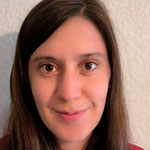 Susana Niclós Ferreras
Profesora de “Diseño de Propuestas Didácticas en Tecnología Industrial”
Professor of "Design of Didactic Proposals in Industrial Technology"
Ingeniería Industrial con especialidad en electrónica y automática. He realizado el Máster en Ingeniería Industrial y el Máster en Formación del Profesorado con Especialidad en Tecnología. Además, he realizado algunos cursos de formación sobre nuevas metodologías (gamificación, trabajo cooperativo), aulas virtuales y cursos especializados de tecnología. Actualmente estoy realizando un curso sobre competencias digitales. En cuanto a mi experiencia profesional, he trabajado en secundaria impartiendo TIC y tecnología, y en formación profesional en las especialidades de electricidad y automática. Actualmente trabajo en el IES Virgen de la Paloma, impartiendo clases principalmente en el ciclo de robótica.
Susana Niclós Ferreras
Profesora de “Diseño de Propuestas Didácticas en Tecnología Industrial”
Professor of "Design of Didactic Proposals in Industrial Technology"
Ingeniería Industrial con especialidad en electrónica y automática. He realizado el Máster en Ingeniería Industrial y el Máster en Formación del Profesorado con Especialidad en Tecnología. Además, he realizado algunos cursos de formación sobre nuevas metodologías (gamificación, trabajo cooperativo), aulas virtuales y cursos especializados de tecnología. Actualmente estoy realizando un curso sobre competencias digitales. En cuanto a mi experiencia profesional, he trabajado en secundaria impartiendo TIC y tecnología, y en formación profesional en las especialidades de electricidad y automática. Actualmente trabajo en el IES Virgen de la Paloma, impartiendo clases principalmente en el ciclo de robótica.
sniclos@nebrija.es
 Jorge Olivera Olivera
Profesor de "Diseño de propuestas didácticas en Lengua y Literatura española", "Prácticum I" y Prácticum II"
Professor of "Design of didactic proposals in Spanish Language and Literature", "Practicum I" and Practicum II "
Profesor Doctor. Su experiencia laboral está relacionada con la Educación y la Formación. Ha desempeñado tareas en el área de Lengua, Literatura, Escritura Creativa y Tics. Ha trabajado como docente en Educación Secundaria, profesor de Universidad (Comunicación, Formación de Profesores y Maestros), docente de Escritura Creativa y formador en Informática (cursos para empleo y cursos para adultos mayores). Ha realizado tareas de dirección o coordinación (Coordinador Cátedra Lengua, Subdirector de Centros Educativos, Coordinador de Lengua).
Jorge Olivera Olivera
Profesor de "Diseño de propuestas didácticas en Lengua y Literatura española", "Prácticum I" y Prácticum II"
Professor of "Design of didactic proposals in Spanish Language and Literature", "Practicum I" and Practicum II "
Profesor Doctor. Su experiencia laboral está relacionada con la Educación y la Formación. Ha desempeñado tareas en el área de Lengua, Literatura, Escritura Creativa y Tics. Ha trabajado como docente en Educación Secundaria, profesor de Universidad (Comunicación, Formación de Profesores y Maestros), docente de Escritura Creativa y formador en Informática (cursos para empleo y cursos para adultos mayores). Ha realizado tareas de dirección o coordinación (Coordinador Cátedra Lengua, Subdirector de Centros Educativos, Coordinador de Lengua).
jolivera@nebrija.es
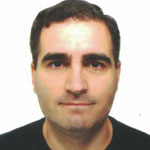 Leonardo Palferro Fernández
Profesor de “Didáctica de la Economía” y “La formación profesional en Economía, Empresa y Comercio”
Professor of "Didactics of the Economy" and "Professional training in Economics, Business and Commerce"
Doctorando en el Programa Interuniversitario en Economía y Empresa, en la línea de Internacionalización de empresas. Licenciado en Comercio Exterior por la Universidad de Belgrano, Graduado en Relaciones Internacionales por la Universidad Nebrija, Máster en Formación del Profesorado y Máster en Internacionalización de empresas por la Universidad Nebrija. Ha publicado un artículo de investigación relacionado con el emprendimiento y la educación. Profesor de Formación Profesional y Didáctica de la Economía en la especialidad de Economía, empresa y comercio del Máster en Formación del Profesorado. Profesor de Negocios Internacionales en el Grado de Economía y Negocios Internacionales. Profesor de Logística y operaciones internacionales en el Máster en internacionalización de empresas.
Leonardo Palferro Fernández
Profesor de “Didáctica de la Economía” y “La formación profesional en Economía, Empresa y Comercio”
Professor of "Didactics of the Economy" and "Professional training in Economics, Business and Commerce"
Doctorando en el Programa Interuniversitario en Economía y Empresa, en la línea de Internacionalización de empresas. Licenciado en Comercio Exterior por la Universidad de Belgrano, Graduado en Relaciones Internacionales por la Universidad Nebrija, Máster en Formación del Profesorado y Máster en Internacionalización de empresas por la Universidad Nebrija. Ha publicado un artículo de investigación relacionado con el emprendimiento y la educación. Profesor de Formación Profesional y Didáctica de la Economía en la especialidad de Economía, empresa y comercio del Máster en Formación del Profesorado. Profesor de Negocios Internacionales en el Grado de Economía y Negocios Internacionales. Profesor de Logística y operaciones internacionales en el Máster en internacionalización de empresas.
lpalferro@nebrija.es
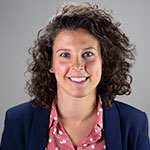 Inmaculada Pedraza Navarro
Tutora de “Trabajo Fin de Máster”
End of Master's Project Tutor
Diplomada en Magisterio por la Universidad de Huelva; Licenciada en Antropología Social y Cultural; Máster en Dirección, Evaluación y Calidad de las Instituciones de Formación; y Doctora en Educación por el Departamento de MIDE en la Universidad de Sevilla. Trabaja como personal docente en la Universidad Antonio de Nebrija, coordinando el área de calidad en la Facultad de Lenguas y Educación, y dirigiendo el Máster Universitario en Procesos Educativos de Enseñanza y Aprendizaje. A su vez, forma parte del grupo de investigación GIETE. Sus principales líneas de investigación giran en torno a la intervención y evaluación educativa. Ha colaborado en diversos proyectos académicos europeos como STAY-IN (Ref: 526600-LLP-1-2012-IT-Erasmus-Esin); ha generado material docente para la formación investigadora (3er plan de docencia-US-Ref. 1.2.3B); ha participado en diversos congresos nacionales e internacionales; y ha publicado artículos científicos sobre intervención y evaluación educativa.
Inmaculada Pedraza Navarro
Tutora de “Trabajo Fin de Máster”
End of Master's Project Tutor
Diplomada en Magisterio por la Universidad de Huelva; Licenciada en Antropología Social y Cultural; Máster en Dirección, Evaluación y Calidad de las Instituciones de Formación; y Doctora en Educación por el Departamento de MIDE en la Universidad de Sevilla. Trabaja como personal docente en la Universidad Antonio de Nebrija, coordinando el área de calidad en la Facultad de Lenguas y Educación, y dirigiendo el Máster Universitario en Procesos Educativos de Enseñanza y Aprendizaje. A su vez, forma parte del grupo de investigación GIETE. Sus principales líneas de investigación giran en torno a la intervención y evaluación educativa. Ha colaborado en diversos proyectos académicos europeos como STAY-IN (Ref: 526600-LLP-1-2012-IT-Erasmus-Esin); ha generado material docente para la formación investigadora (3er plan de docencia-US-Ref. 1.2.3B); ha participado en diversos congresos nacionales e internacionales; y ha publicado artículos científicos sobre intervención y evaluación educativa.
ipedraza@nebrija.es
 Tamara Peteri
Profesora de “La ciencia y su metodología”
Professor of "Science and its methodology"
Licenciada en Ingeniería de Obras Públicas (mención especial) en la Escuela Superior de Ingeniería de Obras Públicas de Budapest, Hungría. Máster en Business Management con calificación sobresaliente en la Escuela Superior de Ingeniería de Obras Públicas de Budapest. Máster Universitario de Didáctica del Español como Lengua Extranjera en la Universidad Antonio de Nebrija. En el pasado ha desarrollado actividades relacionadas de la enseñanza de idiomas, traducciones, en italiano, alemán y ruso. Actualmente forma parte del equipo del Departamento de Profesorado de VOAP.
Tamara Peteri
Profesora de “La ciencia y su metodología”
Professor of "Science and its methodology"
Licenciada en Ingeniería de Obras Públicas (mención especial) en la Escuela Superior de Ingeniería de Obras Públicas de Budapest, Hungría. Máster en Business Management con calificación sobresaliente en la Escuela Superior de Ingeniería de Obras Públicas de Budapest. Máster Universitario de Didáctica del Español como Lengua Extranjera en la Universidad Antonio de Nebrija. En el pasado ha desarrollado actividades relacionadas de la enseñanza de idiomas, traducciones, en italiano, alemán y ruso. Actualmente forma parte del equipo del Departamento de Profesorado de VOAP.
tpeteri@nebrija.es
 Ricardo Pastor Ruiz
Profesor de “Aprendizaje y enseñanza de las materias en hostelería y turismo”
Professor of "Learning and teaching of the subjects in hospitality and tourism"
Ricardo Pastor ha sido profesor del Grado de Turismo de la Universidad de Deusto desde 2007 has 2020. Doctor en Turismo por Escuela Internacional de Doctorado de la Universidad Rey Juan Carlos perteneciente a la Red Intur. Master en Dirección y Administración de Empresas, Máster en Planificación y Gestión Turística y Máster Internacional en Sociedad, Cultura y Economía China. Ha participado en congresos y ha publicado diferentes libros y artículos relacionados con la intermediación y la sostenibilidad en el turismo. Trabaja desde 1996 en el segmento de las agencias de viajes y la Tour Operación habiendo colaborado con las más prestigiosas firmas del sector.
Ricardo Pastor Ruiz
Profesor de “Aprendizaje y enseñanza de las materias en hostelería y turismo”
Professor of "Learning and teaching of the subjects in hospitality and tourism"
Ricardo Pastor ha sido profesor del Grado de Turismo de la Universidad de Deusto desde 2007 has 2020. Doctor en Turismo por Escuela Internacional de Doctorado de la Universidad Rey Juan Carlos perteneciente a la Red Intur. Master en Dirección y Administración de Empresas, Máster en Planificación y Gestión Turística y Máster Internacional en Sociedad, Cultura y Economía China. Ha participado en congresos y ha publicado diferentes libros y artículos relacionados con la intermediación y la sostenibilidad en el turismo. Trabaja desde 1996 en el segmento de las agencias de viajes y la Tour Operación habiendo colaborado con las más prestigiosas firmas del sector.
rpastor@nebrija.es
 Nicolás Petel Rochette
Tutor de Trabajo Fin de Máster
Master's Final Project Tutor
Doctor en Filosofía por la Universidad Complutense de Madrid. Su investigación doctoral plantea una lectura del pensamiento de este autor, con el fin de repensar los vínculos entre estética y política, entre mímesis y poder. Máster en Estudios Avanzados en Filosofía por la UCM. Licenciado en Ciencias Sociales (UQAM, Canadá). Posgrado en Materiales y Metodología de Investigación en Ciencia, Tecnología y Sociedad (CSIC). Sus principales líneas de investigación son la antropología filosófica, la filosofía política del siglo XX, la historia de la pedagogía y la teoría estética. Sus últimas publicaciones científicas, de 2017, han sido en Revistas Filosóficas de renombre. Ha participado en dos Congresos internacionales. Su primer libro se encuentra actualmente en prensa.
Nicolás Petel Rochette
Tutor de Trabajo Fin de Máster
Master's Final Project Tutor
Doctor en Filosofía por la Universidad Complutense de Madrid. Su investigación doctoral plantea una lectura del pensamiento de este autor, con el fin de repensar los vínculos entre estética y política, entre mímesis y poder. Máster en Estudios Avanzados en Filosofía por la UCM. Licenciado en Ciencias Sociales (UQAM, Canadá). Posgrado en Materiales y Metodología de Investigación en Ciencia, Tecnología y Sociedad (CSIC). Sus principales líneas de investigación son la antropología filosófica, la filosofía política del siglo XX, la historia de la pedagogía y la teoría estética. Sus últimas publicaciones científicas, de 2017, han sido en Revistas Filosóficas de renombre. Ha participado en dos Congresos internacionales. Su primer libro se encuentra actualmente en prensa.
npetel@nebrija.es
 María Pérez Rebollo
Profesora de “Didáctica de la Cultura Inglesa” y de “Lengua y Literatura Españolas para Profesores de Educación Secundaria, Bachillerato y FP”
Professor of "Didactics of English Culture" and "Spanish Language and Literature for Teachers of Secondary Education, Baccalaureate and FP"
Graduada en Traducción e Interpretación por la Universidad de Salamanca. Máster Universitario en Formación del Profesorado de Educación Secundaria Obligatoria, Bachillerato, Formación Profesional y Enseñanza de Idiomas. Prácticas de Traducción en la Biblioteca Pública Casa de las Conchas de Salamanca. Prácticas del Máster en el Colegio Trilema Soria por la especialidad de Inglés como Lengua Extranjera en modalidad online. Técnico de Apoyo a la Investigación en el Grupo de Investigación Reconocido TRADIC (Traducción, Ideología y Cultura) de la Universidad de Salamanca, dirigido por la Catedrática de Traducción de la misma facultad, María del Carmen África Vidal Claramonte.
María Pérez Rebollo
Profesora de “Didáctica de la Cultura Inglesa” y de “Lengua y Literatura Españolas para Profesores de Educación Secundaria, Bachillerato y FP”
Professor of "Didactics of English Culture" and "Spanish Language and Literature for Teachers of Secondary Education, Baccalaureate and FP"
Graduada en Traducción e Interpretación por la Universidad de Salamanca. Máster Universitario en Formación del Profesorado de Educación Secundaria Obligatoria, Bachillerato, Formación Profesional y Enseñanza de Idiomas. Prácticas de Traducción en la Biblioteca Pública Casa de las Conchas de Salamanca. Prácticas del Máster en el Colegio Trilema Soria por la especialidad de Inglés como Lengua Extranjera en modalidad online. Técnico de Apoyo a la Investigación en el Grupo de Investigación Reconocido TRADIC (Traducción, Ideología y Cultura) de la Universidad de Salamanca, dirigido por la Catedrática de Traducción de la misma facultad, María del Carmen África Vidal Claramonte.
mperezre@nebrija.es
 Vanesa Carolina Pérez Torres
Tutora de Trabajo Fin de Máster
End of Master's Project Tutor
Doctora en Psicología. Investigadora en el área de psicología social. Autora de diversas publicaciones en el área de redes sociales. Revisora en distintas revistas científicas como Comunicar o Psicoperspectivas.
Vanesa Carolina Pérez Torres
Tutora de Trabajo Fin de Máster
End of Master's Project Tutor
Doctora en Psicología. Investigadora en el área de psicología social. Autora de diversas publicaciones en el área de redes sociales. Revisora en distintas revistas científicas como Comunicar o Psicoperspectivas.
vperez@nebrija.es
 Raquel Picornell Buendía
Profesora de “Procesos Educativos y Realidad Escolar”
Professor of "Educational Processes and School Reality"
Raquel Picornell Buendía
Profesora de “Procesos Educativos y Realidad Escolar”
Professor of "Educational Processes and School Reality"
mpicorne@nebrija.es
 Anastasio Agustín Pineda Benítez
Profesor de “Tecnología y Procesos Industriales II”
Professor of "Technology and Industrial Processes II"
Anastasio Agustín Pineda Benítez
Profesor de “Tecnología y Procesos Industriales II”
Professor of "Technology and Industrial Processes II"
apinedab@nebrija.es
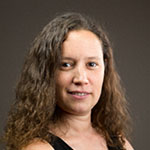 Margarita Planelles Almeida
Tutora de Trabajo Fin de Máster
End of Master's Project Tutor
Doctora en Filosofía y Máster en Lingüística Aplicada (Enseñanza del Español como Lengua Extranjera). Apasionada de la comunicación y las lenguas, y de la oportunidad que ellas nos brindan para conocer y relacionarnos con otras personas y culturas. Como profesora, mi motivación es transmitir a mis alumnos mi entusiasmo por las lenguas y los mundos que ellas nos abren. Mi intención es contribuir al desarrollo individual y personal de los alumnos, potenciando sus capacidades y facilitándoles el acceso a nuevos mundos y perspectivas a través del aprendizaje.
Margarita Planelles Almeida
Tutora de Trabajo Fin de Máster
End of Master's Project Tutor
Doctora en Filosofía y Máster en Lingüística Aplicada (Enseñanza del Español como Lengua Extranjera). Apasionada de la comunicación y las lenguas, y de la oportunidad que ellas nos brindan para conocer y relacionarnos con otras personas y culturas. Como profesora, mi motivación es transmitir a mis alumnos mi entusiasmo por las lenguas y los mundos que ellas nos abren. Mi intención es contribuir al desarrollo individual y personal de los alumnos, potenciando sus capacidades y facilitándoles el acceso a nuevos mundos y perspectivas a través del aprendizaje.
mplanelles@nebrija.es
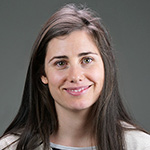 Claudia Poch Pérez Botija
Tutora de Trabajo Fin de Máster
End of Master's Project Tutor
Doctora en Neurociencia por la Universidad Autónoma de Madrid. Acreditada. Licenciada en Psicología, con la especialidad de Psicología y Ciencia Cognitiva en la Universidad Complutense de Madrid. Beca de investigación en el Centro de Magnetoencefalografía Perez-Modrego de la Universidad Complutense de Madrid y estancia de investigación en el Center for Cognitive Neuroscience (UCL), Londres, Actualmente forma parte del grupo de investigación que el Dr. Duñabeitia dirige en la Universidad de Nebrija y mantiene una colaboración activa con el grupo de investigación del Prof. Romei de la Universidad de Boloña (Italia). En relación a su trayectoria investigadora, ésta se ha centrado fundamentalmente en dos proyectos financiados por el Ministerio de Economía y Competitividad. El primero, estudia los procesos neurofisiológicos asociados a la atención dentro de la Memoria Operativa. El segundo se centra en la memoria semántica en pacientes con epilepsia. Como resultado, su producción científica asciende a 21 publicaciones, el 73 % en Q1.
Claudia Poch Pérez Botija
Tutora de Trabajo Fin de Máster
End of Master's Project Tutor
Doctora en Neurociencia por la Universidad Autónoma de Madrid. Acreditada. Licenciada en Psicología, con la especialidad de Psicología y Ciencia Cognitiva en la Universidad Complutense de Madrid. Beca de investigación en el Centro de Magnetoencefalografía Perez-Modrego de la Universidad Complutense de Madrid y estancia de investigación en el Center for Cognitive Neuroscience (UCL), Londres, Actualmente forma parte del grupo de investigación que el Dr. Duñabeitia dirige en la Universidad de Nebrija y mantiene una colaboración activa con el grupo de investigación del Prof. Romei de la Universidad de Boloña (Italia). En relación a su trayectoria investigadora, ésta se ha centrado fundamentalmente en dos proyectos financiados por el Ministerio de Economía y Competitividad. El primero, estudia los procesos neurofisiológicos asociados a la atención dentro de la Memoria Operativa. El segundo se centra en la memoria semántica en pacientes con epilepsia. Como resultado, su producción científica asciende a 21 publicaciones, el 73 % en Q1.
cpoch@nebrija.es
 Pedro Pozo Morillas
Profesor de “Didáctica de la Tecnología y la Informática”
Professor of "Didactics of Technology and Informatics"
Arquitecto por la Universidad de Sevilla y Máster en Formación del Profesorado por la Universidad Internacional de Valencia, ha desarrollado su carrera profesional en dos ámbitos principales: el Urbanismo y la Docencia.
Ha recibido las siguientes menciones: Premio a la Mejor Investigación Nacional en la “First Lego League”, Premio por su labor docente en el VIII Concurso de Pintura de Aves en Andalucía, y el Premio por la labor docente en el XIX Certamen Nacional de Pintura de Patrimonio Nacional.
En relación a las competencias profesionales del área, ha realizado las siguientes ponencias: Conferencia en el marco de la Conferencia Regional del IB en Roma, “Using the Design Cycle to teach robotics through cooperative learning”, “La robótica a través del aprendizaje cooperativo” en el IV Simposio iTest: Profesores Innovación en la educación” del CES Felipe II (Complutense) en Aranjuez, y ponencia "¿Es posible un aula virtual en Secundaria?" en el foro I Smart Campus de la Universidad Antonio de Nebrija, junio 2019.
Pedro Pozo Morillas
Profesor de “Didáctica de la Tecnología y la Informática”
Professor of "Didactics of Technology and Informatics"
Arquitecto por la Universidad de Sevilla y Máster en Formación del Profesorado por la Universidad Internacional de Valencia, ha desarrollado su carrera profesional en dos ámbitos principales: el Urbanismo y la Docencia.
Ha recibido las siguientes menciones: Premio a la Mejor Investigación Nacional en la “First Lego League”, Premio por su labor docente en el VIII Concurso de Pintura de Aves en Andalucía, y el Premio por la labor docente en el XIX Certamen Nacional de Pintura de Patrimonio Nacional.
En relación a las competencias profesionales del área, ha realizado las siguientes ponencias: Conferencia en el marco de la Conferencia Regional del IB en Roma, “Using the Design Cycle to teach robotics through cooperative learning”, “La robótica a través del aprendizaje cooperativo” en el IV Simposio iTest: Profesores Innovación en la educación” del CES Felipe II (Complutense) en Aranjuez, y ponencia "¿Es posible un aula virtual en Secundaria?" en el foro I Smart Campus de la Universidad Antonio de Nebrija, junio 2019.
ppozo@nebrija.es
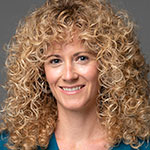 Leticia Quesada Vázquez
Tutora de “Trabajo Fin de Máster”
End of Master's Project Tutor
Doctora Cum Laude en Estudios Humanísticos por la Universitat Rovira i Virgili con informe favorable de profesorado lector de AQU Catalunya. Obtuvo el Máster en Formación del Profesorado de E.S.O., Bachillerato, F.P. y Enseñanza de Idiomas y la Licenciatura en Filología Inglesa por dicha entidad, y cursó el Máster de Interpretación de Conferencias en la Universidad de La Laguna. Fue profesora asociada en la URV y la Escola Universitària Mediterrani enseñando inglés para fines específicos en turismo, geografía e ingeniería, y pronunciación en el Grado de Inglés. Gracias al programa Fulbright (FLTA), enseñó español en Lincoln University. Obtuvo una beca predoctoral Martí i Franquès, con estancia internacional en el laboratorio LIDILEM (Université Grenoble-Alpes). Ha participado en proyectos de investigación y congresos tanto a nivel nacional como internacional.
Leticia Quesada Vázquez
Tutora de “Trabajo Fin de Máster”
End of Master's Project Tutor
Doctora Cum Laude en Estudios Humanísticos por la Universitat Rovira i Virgili con informe favorable de profesorado lector de AQU Catalunya. Obtuvo el Máster en Formación del Profesorado de E.S.O., Bachillerato, F.P. y Enseñanza de Idiomas y la Licenciatura en Filología Inglesa por dicha entidad, y cursó el Máster de Interpretación de Conferencias en la Universidad de La Laguna. Fue profesora asociada en la URV y la Escola Universitària Mediterrani enseñando inglés para fines específicos en turismo, geografía e ingeniería, y pronunciación en el Grado de Inglés. Gracias al programa Fulbright (FLTA), enseñó español en Lincoln University. Obtuvo una beca predoctoral Martí i Franquès, con estancia internacional en el laboratorio LIDILEM (Université Grenoble-Alpes). Ha participado en proyectos de investigación y congresos tanto a nivel nacional como internacional.
lquesada@nebrija.es
 Oriol A. Rangel Zúñiga
Tutor de “Trabajo Fin de Máster”
End of Master's Project Tutor
Doctor en Biología en el departamento de bioquímica y biología molecular en el grupo de los Drs. Jesús Díez Dapena y José Manuel García Fernández. Durante 6 años llevé a cabo estudios de metabolismo de nitrógeno y carbono en la cianobacteria marina Prochlorococcus participando en 4 publicaciones del grupo y una de primer autor. Finalizada la tesis doctoral y gracias a los conocimientos adquiridos en durante mi tesis en el área de la biología molecular fui vinculado a la Unidad de Lípidos y Arteriosclerosis del Hospital Universitario Reina Sofía, hoy grupo GC09 Nutrigenómica y Síndrome Metabólico. En los últimos 8 años he llevado a cabo estudios de interacción genes dieta, proteínas dieta y epigenetica en pacientes con Síndrome Metabólico, Obesidad, Arteriosclerosis, Diabetes Mellitus tipo 2 y enfermedad cardiovascular. He basado mi trabajo en la aplicación de técnicas de biología molecular, proteómica y citometría de flujo, participando en 34 publicaciones del grupo de las cuales 5 como primer autor.
Oriol A. Rangel Zúñiga
Tutor de “Trabajo Fin de Máster”
End of Master's Project Tutor
Doctor en Biología en el departamento de bioquímica y biología molecular en el grupo de los Drs. Jesús Díez Dapena y José Manuel García Fernández. Durante 6 años llevé a cabo estudios de metabolismo de nitrógeno y carbono en la cianobacteria marina Prochlorococcus participando en 4 publicaciones del grupo y una de primer autor. Finalizada la tesis doctoral y gracias a los conocimientos adquiridos en durante mi tesis en el área de la biología molecular fui vinculado a la Unidad de Lípidos y Arteriosclerosis del Hospital Universitario Reina Sofía, hoy grupo GC09 Nutrigenómica y Síndrome Metabólico. En los últimos 8 años he llevado a cabo estudios de interacción genes dieta, proteínas dieta y epigenetica en pacientes con Síndrome Metabólico, Obesidad, Arteriosclerosis, Diabetes Mellitus tipo 2 y enfermedad cardiovascular. He basado mi trabajo en la aplicación de técnicas de biología molecular, proteómica y citometría de flujo, participando en 34 publicaciones del grupo de las cuales 5 como primer autor.
orangel@nebrija.es
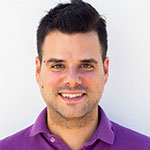 Manuel Reiriz Rojas
Profesor de “La ciencia y su metodología”, “Aprendizaje y Enseñanza de los procesos sanitarios II”, “Prácticum I” y “Prácticum II”
Professor of "Science and its methodology", "Learning and Teaching of health processes II", "Practicum I" and "Practicum II"
Doctor en Biología por la universidad de Sevilla, cursando el Máster oficial de Fisiología y Neurociencia.
Ha ejercido docencia en el departamento de Psicobiología de la Universidad de Sevilla y en la Universidad Antonio Nebrija en el Máster de formación del profesorado. Cuenta con experiencia tanto en el campo de la neurociencia y su enseñanza como en el de educación. Posee Igualmente publicaciones en el ámbito de la Psicobiología y en el de la innovación docente.
Manuel Reiriz Rojas
Profesor de “La ciencia y su metodología”, “Aprendizaje y Enseñanza de los procesos sanitarios II”, “Prácticum I” y “Prácticum II”
Professor of "Science and its methodology", "Learning and Teaching of health processes II", "Practicum I" and "Practicum II"
Doctor en Biología por la universidad de Sevilla, cursando el Máster oficial de Fisiología y Neurociencia.
Ha ejercido docencia en el departamento de Psicobiología de la Universidad de Sevilla y en la Universidad Antonio Nebrija en el Máster de formación del profesorado. Cuenta con experiencia tanto en el campo de la neurociencia y su enseñanza como en el de educación. Posee Igualmente publicaciones en el ámbito de la Psicobiología y en el de la innovación docente.
mreiriz@nebrija.es
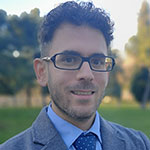 Miguel Ángel Reyes Belmonte
Profesor de “La ciencia y su Metodología” y “La Formación Profesional en Tecnología Industrial”
Professor of "Science and its Methodology" and "Professional Training in Industrial Technology"
Doctor Ingeniero Industrial (acreditación Contratado Doctor y Profesor Universidad Privada). Su experiencia profesional abarca la docencia universitaria como profesor en la Universidad Rey Juan Carlos (desde 2018), investigador en IMDEA Energía (2015-2019), investigador en el Mechanical Engineering Department de la University of Bath (2014-2015) así como evaluador de proyectos de I+D para la Agencia de Certificación en Innovación Española (ACIE). Su producción científica abarca más de 40 publicaciones en revistas de alto impacto y congresos internacionales. Además, participa en diversas revistas científicas del ramo de la energía como editor invitado y miembro del consejo editorial. Su experiencia científica y tecnológica incluye la participación en diversos proyectos de I+D+I y contratos con empresas líder del sector de la automoción y la energía.
Miguel Ángel Reyes Belmonte
Profesor de “La ciencia y su Metodología” y “La Formación Profesional en Tecnología Industrial”
Professor of "Science and its Methodology" and "Professional Training in Industrial Technology"
Doctor Ingeniero Industrial (acreditación Contratado Doctor y Profesor Universidad Privada). Su experiencia profesional abarca la docencia universitaria como profesor en la Universidad Rey Juan Carlos (desde 2018), investigador en IMDEA Energía (2015-2019), investigador en el Mechanical Engineering Department de la University of Bath (2014-2015) así como evaluador de proyectos de I+D para la Agencia de Certificación en Innovación Española (ACIE). Su producción científica abarca más de 40 publicaciones en revistas de alto impacto y congresos internacionales. Además, participa en diversas revistas científicas del ramo de la energía como editor invitado y miembro del consejo editorial. Su experiencia científica y tecnológica incluye la participación en diversos proyectos de I+D+I y contratos con empresas líder del sector de la automoción y la energía.
mreyesbe@nebrija.es
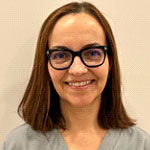 María Antonia Rivero González
Tutora de “Trabajo Fin de Máster”
End of Master's Project Tutor
Licenciada en Odontología por la UCM (1996) y Doctora en Odontología por la misma universidad en 2007. Actualmente es profesora Asociada en la UCM en el departamento de Odontología Conservadora y Prótesis. Y profesora del título propio de Especialista en Implantoprótesis. Premio de la Sociedad Española de Prótesis 2007 al mejor trabajo de investigación científica. Máster en Prótesis Bucofacial 1996-1998. Especialista en Implantoprótesis 1997-1998. Especialista en Odontología Estética 2022-2023. Miembro del grupo de investigación “Diseños, estructuras, recubrimientos y calidad de vida en implantoprótesis” de la UCM.
María Antonia Rivero González
Tutora de “Trabajo Fin de Máster”
End of Master's Project Tutor
Licenciada en Odontología por la UCM (1996) y Doctora en Odontología por la misma universidad en 2007. Actualmente es profesora Asociada en la UCM en el departamento de Odontología Conservadora y Prótesis. Y profesora del título propio de Especialista en Implantoprótesis. Premio de la Sociedad Española de Prótesis 2007 al mejor trabajo de investigación científica. Máster en Prótesis Bucofacial 1996-1998. Especialista en Implantoprótesis 1997-1998. Especialista en Odontología Estética 2022-2023. Miembro del grupo de investigación “Diseños, estructuras, recubrimientos y calidad de vida en implantoprótesis” de la UCM.
mriverogo@nebrija.es
 Jesús Romero Rocho
Tutor de Trabajo Fin de Máster
Master's Final Project Tutor
Doctorado Cum Laude en Ciencias de la Educación por la UCJC.
Licenciado en Dirección y Administración internacional de empresas por la Universidad de Lincoln. Diplomado en Magisterio Educación infantil.
Coach certificado por ICF nivel PCC, estudios en Psicología por la UNED, Master en PNL y Psicoterapia, entre otras técnicas de intervención terapéutica.
Durante más de 20 años ha trabajado en empresas multinacionales desempeñando puestos de Vicepresidente de Ventas de Europa, Director General, Director Nacional de Ventas, etc.
Los últimos años dedica su carrera profesional a la Educación, Desarrollo personal, Coaching y Nuevas Tecnologías aplicadas a la Educación.
En la actualidad es Socio y Director General de un grupo de escuelas infantiles, y otros centros de crecimiento emocional infantil.
Participa en otros proyectos de investigación nacional sobre Educación, Mindfulness y Técnicas de desarrollo del aprendizaje y gestión emocional.
Jesús Romero Rocho
Tutor de Trabajo Fin de Máster
Master's Final Project Tutor
Doctorado Cum Laude en Ciencias de la Educación por la UCJC.
Licenciado en Dirección y Administración internacional de empresas por la Universidad de Lincoln. Diplomado en Magisterio Educación infantil.
Coach certificado por ICF nivel PCC, estudios en Psicología por la UNED, Master en PNL y Psicoterapia, entre otras técnicas de intervención terapéutica.
Durante más de 20 años ha trabajado en empresas multinacionales desempeñando puestos de Vicepresidente de Ventas de Europa, Director General, Director Nacional de Ventas, etc.
Los últimos años dedica su carrera profesional a la Educación, Desarrollo personal, Coaching y Nuevas Tecnologías aplicadas a la Educación.
En la actualidad es Socio y Director General de un grupo de escuelas infantiles, y otros centros de crecimiento emocional infantil.
Participa en otros proyectos de investigación nacional sobre Educación, Mindfulness y Técnicas de desarrollo del aprendizaje y gestión emocional.
jromero@nebrija.es
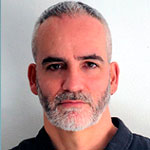 Ignacio Rodríguez Domínguez
Profesor de “Diseño de Propuestas Didácticas en Artes Plásticas”
Professor of "Design of Didactic Proposals in Plastic Arts"
Ignacio Rodríguez Domínguez
Profesor de “Diseño de Propuestas Didácticas en Artes Plásticas”
Professor of "Design of Didactic Proposals in Plastic Arts"
irodriguezdo@nebrija.es
 Benjamín Rodríguez Expósito
Profesor de “Didáctica de la Biología”, “Aprendizaje y enseñanza de los procesos sanitarios II”, “Prácticum I” y “Prácticum II”
Profesor de “Didáctica de la Biología”, “Aprendizaje y enseñanza de los procesos sanitarios II”, “Prácticum I” y “Prácticum II”
Licenciado en Biología y Doctor por la Universidad de Sevilla. Acreditado. Master universitario de especialización en Fisiología y Neurociencia. En cuanto a su producción científica, es autor/coautor de diversas publicaciones científicas en revistas de reconocido prestigio e incluidas en el journal citation report, tales como Behavioural Brain Research, Physiology and Behaviour y Neurobiology of learning and memory, enmarcadas en la investigación de los procesos cognitivos, así como de su substrato neural, relacionados con el aprendizaje relacional y los sistemas de memoria. Asimismo, ha participado en cursos, seminarios de especialización y congresos científicos tanto nacionales como internacionales, contribuyendo en estos últimos con diversas publicaciones. Ha participado como investigador en varios proyectos de investigación nacionales dentro del Plan Nacional de I+D del Gobierno de España, relacionados con el estudio de las bases neurales y procesos cognitivos de los sistemas de memoria relacional y emocional.
Benjamín Rodríguez Expósito
Profesor de “Didáctica de la Biología”, “Aprendizaje y enseñanza de los procesos sanitarios II”, “Prácticum I” y “Prácticum II”
Profesor de “Didáctica de la Biología”, “Aprendizaje y enseñanza de los procesos sanitarios II”, “Prácticum I” y “Prácticum II”
Licenciado en Biología y Doctor por la Universidad de Sevilla. Acreditado. Master universitario de especialización en Fisiología y Neurociencia. En cuanto a su producción científica, es autor/coautor de diversas publicaciones científicas en revistas de reconocido prestigio e incluidas en el journal citation report, tales como Behavioural Brain Research, Physiology and Behaviour y Neurobiology of learning and memory, enmarcadas en la investigación de los procesos cognitivos, así como de su substrato neural, relacionados con el aprendizaje relacional y los sistemas de memoria. Asimismo, ha participado en cursos, seminarios de especialización y congresos científicos tanto nacionales como internacionales, contribuyendo en estos últimos con diversas publicaciones. Ha participado como investigador en varios proyectos de investigación nacionales dentro del Plan Nacional de I+D del Gobierno de España, relacionados con el estudio de las bases neurales y procesos cognitivos de los sistemas de memoria relacional y emocional.
brodrigueze@nebrija.es
 Berta Rodríguez-Frutos
Tutora de “Trabajo Fin de Máster”
End of Master's Project Tutor
Doctora en Neurobiología por la Universidad Autónoma de Madrid, cuya línea de investigación trata con células troncales mesenquimales alogénicas en el infarto cerebral. Neurobióloga en el Laboratorio de Investigación de Neurociencia Cerebrovascular en el departamento de Neurología del Hospital Universitario de la Paz.
Berta Rodríguez-Frutos
Tutora de “Trabajo Fin de Máster”
End of Master's Project Tutor
Doctora en Neurobiología por la Universidad Autónoma de Madrid, cuya línea de investigación trata con células troncales mesenquimales alogénicas en el infarto cerebral. Neurobióloga en el Laboratorio de Investigación de Neurociencia Cerebrovascular en el departamento de Neurología del Hospital Universitario de la Paz.
brodriguezfr@nebrija.es
 Laura Rodríguez García
Profesora de “Psicología y educación del adolescente” e “Intervención educativa en problemas de aprendizaje y convivencia”
Professor of "Psychology and adolescent education" and "Educational intervention in learning problems and coexistence"
Doctora en Psicología Evolutiva y de la Educación por la Universidad de Salamanca. Licenciada en Psicopedagogía y Maestra en varias especialidades (Pedagogía Terapéutica, Educación Primaria y Lengua Extranjera: inglés). Trayectoria investigadora centrada en las dificultades de aprendizaje en lectura, así como en la resolución de problemas aritméticos y en su aplicación a la práctica educativa. Profesionalmente cuenta con amplia experiencia como Orientadora Educativa y Maestra en todos los niveles educativos, especialmente en la intervención educativa con alumnos que presentan necesidades educativas especiales. Actualmente trabaja como especialista en Pedagogía Terapéutica en el Departamento de Orientación de un Instituto de la Comunidad de Madrid.
Laura Rodríguez García
Profesora de “Psicología y educación del adolescente” e “Intervención educativa en problemas de aprendizaje y convivencia”
Professor of "Psychology and adolescent education" and "Educational intervention in learning problems and coexistence"
Doctora en Psicología Evolutiva y de la Educación por la Universidad de Salamanca. Licenciada en Psicopedagogía y Maestra en varias especialidades (Pedagogía Terapéutica, Educación Primaria y Lengua Extranjera: inglés). Trayectoria investigadora centrada en las dificultades de aprendizaje en lectura, así como en la resolución de problemas aritméticos y en su aplicación a la práctica educativa. Profesionalmente cuenta con amplia experiencia como Orientadora Educativa y Maestra en todos los niveles educativos, especialmente en la intervención educativa con alumnos que presentan necesidades educativas especiales. Actualmente trabaja como especialista en Pedagogía Terapéutica en el Departamento de Orientación de un Instituto de la Comunidad de Madrid.
lrodriguezga@nebrija.es
 Juan Esteban Rodríguez Garrido
Profesor “Educación, sociedad y política educativa”, “Diseño de propuestas didácticas en Ciencias Sociales Geografía e Historia”, “Prácticum I”, y “Prácticum II”
Professor "Education, society and educational policy", "Design of didactic proposals in Social Sciences Geography and History", "Practicum I", and "Practicum II"
Doctor Cum Laude en Educación por la Universidad Complutense, con la tesis Trato y maltrato de la historia de España en los libros de texto tras licenciarse en Historia por esta misma Universidad.
Forma parte de distintos grupos de investigación entre los que destaca el CITCEM- Centro de Investigaçao Transdisciplinar Cultura, Espaço e Memória y ha publicado o colaborado en los siguientes libros: La Edad Moderna en ESO. Experiencias de investigación (Editum, 2016), Historia e identidades culturales (Centro de Investigaçao em Educaçao, 2014) y Trato y maltrato de la Historia de España en los libros de texto de la EGB y la ESO (Ed Académica Española, 2012).
Ha publicado diversos artículos entre los que podemos destacar los siguientes: Estudiar Historia desde la Literatura: la invasión de Polonia. CEM. Cultura, Espaço e Memória, História, vol. 8, Análisis de la construcción de identidades colectivas en los libros de texto: la Guerra de la Independencia. Historia y Memoria de la Educación, vol.6, Estudiar Historia desde la Literatura: la invasión de Francia. História.Revista da FLUP, vol. 6 y Estudiar Historia desde la Literatura: la Batalla de Inglaterra. CEM. Cultura, Espaço e Memória, vol. 6.
Juan Esteban Rodríguez Garrido
Profesor “Educación, sociedad y política educativa”, “Diseño de propuestas didácticas en Ciencias Sociales Geografía e Historia”, “Prácticum I”, y “Prácticum II”
Professor "Education, society and educational policy", "Design of didactic proposals in Social Sciences Geography and History", "Practicum I", and "Practicum II"
Doctor Cum Laude en Educación por la Universidad Complutense, con la tesis Trato y maltrato de la historia de España en los libros de texto tras licenciarse en Historia por esta misma Universidad.
Forma parte de distintos grupos de investigación entre los que destaca el CITCEM- Centro de Investigaçao Transdisciplinar Cultura, Espaço e Memória y ha publicado o colaborado en los siguientes libros: La Edad Moderna en ESO. Experiencias de investigación (Editum, 2016), Historia e identidades culturales (Centro de Investigaçao em Educaçao, 2014) y Trato y maltrato de la Historia de España en los libros de texto de la EGB y la ESO (Ed Académica Española, 2012).
Ha publicado diversos artículos entre los que podemos destacar los siguientes: Estudiar Historia desde la Literatura: la invasión de Polonia. CEM. Cultura, Espaço e Memória, História, vol. 8, Análisis de la construcción de identidades colectivas en los libros de texto: la Guerra de la Independencia. Historia y Memoria de la Educación, vol.6, Estudiar Historia desde la Literatura: la invasión de Francia. História.Revista da FLUP, vol. 6 y Estudiar Historia desde la Literatura: la Batalla de Inglaterra. CEM. Cultura, Espaço e Memória, vol. 6.
jrodriguezga@nebrija.es
 Teresa Rossignoli Palomeque
Tutora de "Trabajo Fin de Máster"
End of Master's Project Tutor
Doctora en Psicología. Máster en Neuropsicología Infantil. Lda. Psicopedagogía. Experiencia como personal docente-investigador en el Centro Universitario Cardenal Cisneros, profesora asociada en la Universidad Autónoma de Madrid, y docente en Máster de Neurospicología en la Universidad Operta de Catalunya. A su vez, cuenta con amplia experiencia en intervención neuropsicológica y coordinación del dto. de Neuropsicología Infantil en el Centro Comunica. Las líneas de investigación se orientan especialmente al entrenamiento cognitivo de la atención y de las funciones ejecutivas en población escolar.
Teresa Rossignoli Palomeque
Tutora de "Trabajo Fin de Máster"
End of Master's Project Tutor
Doctora en Psicología. Máster en Neuropsicología Infantil. Lda. Psicopedagogía. Experiencia como personal docente-investigador en el Centro Universitario Cardenal Cisneros, profesora asociada en la Universidad Autónoma de Madrid, y docente en Máster de Neurospicología en la Universidad Operta de Catalunya. A su vez, cuenta con amplia experiencia en intervención neuropsicológica y coordinación del dto. de Neuropsicología Infantil en el Centro Comunica. Las líneas de investigación se orientan especialmente al entrenamiento cognitivo de la atención y de las funciones ejecutivas en población escolar.
trossignoli@nebrija.es
 Sandra Ruiz Ambit
Tutora de "Trabajo Fin de Máster"
End of Master's Project Tutor
Doctora cum laude con premio extraordinario en Educación, con una tesis sobre la enseñanza de habilidades para la vida independiente. Máster Universitario en Educación Especial. Máster en Intervención Psicológica en Contextos Educativos. Licenciada en Piscología. Sus líneas de investigación, en las cuales contribuye a través de la publicación de artículos, comunicaciones y participación en proyectos, son la mejora de la calidad de vida de alumnos con necesidades educativas especiales, la intervención educativa ecológica, programas educativos e innovación educativa.
Sandra Ruiz Ambit
Tutora de "Trabajo Fin de Máster"
End of Master's Project Tutor
Doctora cum laude con premio extraordinario en Educación, con una tesis sobre la enseñanza de habilidades para la vida independiente. Máster Universitario en Educación Especial. Máster en Intervención Psicológica en Contextos Educativos. Licenciada en Piscología. Sus líneas de investigación, en las cuales contribuye a través de la publicación de artículos, comunicaciones y participación en proyectos, son la mejora de la calidad de vida de alumnos con necesidades educativas especiales, la intervención educativa ecológica, programas educativos e innovación educativa.
sruizam@nebrija.es
 Ismael Ruiz Arroyo
Profesor de “Procesos Educativos y Realidad Escolar”, “Enfoque Comunicativo y Aprendizaje por Tareas”, “Prácticum I” y “Prácticum II”.
Professor of "Educational Processes and School Reality", "Communicative Approach and Learning by Tasks", "Practicum I" and "Practicum II".
Doctorando de Literatura española en la Universität zu Köln (Colonia, Alemania) y graduado en Filología Hispánica por la Universidad de Alcalá (Madrid). Cuenta con una estancia como lector en el posgrado de Lenguas y Comunicación en la Universidad La Sapienza de Roma. Así mismo posee el Máster en Formación del Profesorado por la Universidad Nebrija y un Máster en Investigación Teatral con especialidad en Multiculturalidad Teatral. Actualmente es profesor de Lengua castellana y Literatura en Secundaria y Bachillerato para la Consejería de Educación de la Comunidad de Madrid. Durante tres cursos académicos ha sido profesor de Lengua y Cultura española en un centro de Educación Secundaria en Colonia (Alemania), así como profesor contratado en los grados de Comunicación, Media y Traducción en la Universidad Heinrich-Heine de Düsseldorf (Alemania).
Ismael Ruiz Arroyo
Profesor de “Procesos Educativos y Realidad Escolar”, “Enfoque Comunicativo y Aprendizaje por Tareas”, “Prácticum I” y “Prácticum II”.
Professor of "Educational Processes and School Reality", "Communicative Approach and Learning by Tasks", "Practicum I" and "Practicum II".
Doctorando de Literatura española en la Universität zu Köln (Colonia, Alemania) y graduado en Filología Hispánica por la Universidad de Alcalá (Madrid). Cuenta con una estancia como lector en el posgrado de Lenguas y Comunicación en la Universidad La Sapienza de Roma. Así mismo posee el Máster en Formación del Profesorado por la Universidad Nebrija y un Máster en Investigación Teatral con especialidad en Multiculturalidad Teatral. Actualmente es profesor de Lengua castellana y Literatura en Secundaria y Bachillerato para la Consejería de Educación de la Comunidad de Madrid. Durante tres cursos académicos ha sido profesor de Lengua y Cultura española en un centro de Educación Secundaria en Colonia (Alemania), así como profesor contratado en los grados de Comunicación, Media y Traducción en la Universidad Heinrich-Heine de Düsseldorf (Alemania).
iruiz@nebrija.es
 Miguel Ángel Ruiz Domínguez
Tutor de "Trabajo Fin de Máster"
End of Master's Project Tutor
Doctor en Educación. Ha disfrutado de una beca de formación e investigación en el Instituto Nacional de Tecnologías Educativas y Formación del Profesorado (INTEF) durante un año y medio. Durante esa etapa comenzó el proyecto personal de Yo Soy Tu Profe, portal educativo de referencia en el ámbito nacional, con más de un millón de vistas mensuales, ganador de distintos premios del sector y, hoy en día, integrado en el periódico digital 20minutos.es. Del mismo modo, ha mantenido colaboraciones asiduas con otros medios escribiendo sobre educación (EcoAula de elEconomista.es y el Periódico Escuela). Además, ha trabajado como asesor educativo en GlobalNET Solutions. Actualmente presenta los contenidos de matemáticas en Aprendemos en Clan de RTVE y es docente universitario.
Miguel Ángel Ruiz Domínguez
Tutor de "Trabajo Fin de Máster"
End of Master's Project Tutor
Doctor en Educación. Ha disfrutado de una beca de formación e investigación en el Instituto Nacional de Tecnologías Educativas y Formación del Profesorado (INTEF) durante un año y medio. Durante esa etapa comenzó el proyecto personal de Yo Soy Tu Profe, portal educativo de referencia en el ámbito nacional, con más de un millón de vistas mensuales, ganador de distintos premios del sector y, hoy en día, integrado en el periódico digital 20minutos.es. Del mismo modo, ha mantenido colaboraciones asiduas con otros medios escribiendo sobre educación (EcoAula de elEconomista.es y el Periódico Escuela). Además, ha trabajado como asesor educativo en GlobalNET Solutions. Actualmente presenta los contenidos de matemáticas en Aprendemos en Clan de RTVE y es docente universitario.
mruizdo@nebrija.es
 Pilar Salvá Soria
Profesora de “Educación, Sociedad y Política Educativa”, “Educación inclusiva y atención a la diversidad”, “Prácticum I” y “Prácticum II”.
Professor of "Education, Society and Educational Policy", "Inclusive education and attention to diversity", "Practicum I" and "Practicum II".
Doctora acreditada en Epistemología con Mención Internacional por la Universidad Complutense de Madrid. Máster en Epistemología de las Ciencias Naturales y las Ciencias Sociales por la Universidad Complutense de Madrid. Máster en Ciencia y Filosofía: Construyendo el Futuro por la Universidad Complutense de Madrid. Máster en Formación del Profesorado de Educación Secundaria Obligatoria y Bachillerato por la Universidad Pontificia Comillas. Sus líneas de investigación giran en torno a la Filosofía, la Ciencia y la Educación. Ha impartido clase en distintas etapas educativas desde Secundaria y Bachillerato hasta docencia universitaria en Grado, Máster, Doctorado y Universidad de Mayores. Actualmente es coordinadora de los Grados de Educación en la Universidad Nebrija donde imparte clases. Pertenece al Grupo de Investigación financiado por el Ministerio, Cognitive Vulnerability, Verisimilitude and Truth (FFI2017-84826-P). Ha sido fundadora y presidenta de la Asociación de Epistemología de la Universidad Complutense de Madrid y publica artículos y libros en editoriales de reconocido prestigio nacional.
Pilar Salvá Soria
Profesora de “Educación, Sociedad y Política Educativa”, “Educación inclusiva y atención a la diversidad”, “Prácticum I” y “Prácticum II”.
Professor of "Education, Society and Educational Policy", "Inclusive education and attention to diversity", "Practicum I" and "Practicum II".
Doctora acreditada en Epistemología con Mención Internacional por la Universidad Complutense de Madrid. Máster en Epistemología de las Ciencias Naturales y las Ciencias Sociales por la Universidad Complutense de Madrid. Máster en Ciencia y Filosofía: Construyendo el Futuro por la Universidad Complutense de Madrid. Máster en Formación del Profesorado de Educación Secundaria Obligatoria y Bachillerato por la Universidad Pontificia Comillas. Sus líneas de investigación giran en torno a la Filosofía, la Ciencia y la Educación. Ha impartido clase en distintas etapas educativas desde Secundaria y Bachillerato hasta docencia universitaria en Grado, Máster, Doctorado y Universidad de Mayores. Actualmente es coordinadora de los Grados de Educación en la Universidad Nebrija donde imparte clases. Pertenece al Grupo de Investigación financiado por el Ministerio, Cognitive Vulnerability, Verisimilitude and Truth (FFI2017-84826-P). Ha sido fundadora y presidenta de la Asociación de Epistemología de la Universidad Complutense de Madrid y publica artículos y libros en editoriales de reconocido prestigio nacional.
msalva@nebrija.es
 Mónica San Juan Fernández
Tutora de "Trabajo Fin de Máster"
End of Master's Project Tutor
Doctora, licenciada en psicopedagogía habilitada con 5 especialidades por el Ministerio de educación y Ciencia: Pedagogía Terapéutica, Música, Educación Física, Educación Infantil, Educación Primaria y Primer ciclo de secundaria, Profesora de Compensatoria. Acreditada para la Dirección Escolar, Investigadora y colaboradora en grupos de investigación con diversas publicaciones y estancias en universidades extranjeras: Bélgica y Reino Unido. Ha coordinado diversos proyectos financiados por el Ministerio de Educación en materia de psicopedagogía y nuevas tecnologías. Ha dirigido TFM en castellano y en inglés.
Mónica San Juan Fernández
Tutora de "Trabajo Fin de Máster"
End of Master's Project Tutor
Doctora, licenciada en psicopedagogía habilitada con 5 especialidades por el Ministerio de educación y Ciencia: Pedagogía Terapéutica, Música, Educación Física, Educación Infantil, Educación Primaria y Primer ciclo de secundaria, Profesora de Compensatoria. Acreditada para la Dirección Escolar, Investigadora y colaboradora en grupos de investigación con diversas publicaciones y estancias en universidades extranjeras: Bélgica y Reino Unido. Ha coordinado diversos proyectos financiados por el Ministerio de Educación en materia de psicopedagogía y nuevas tecnologías. Ha dirigido TFM en castellano y en inglés.
msanjuanf@nebrija.es
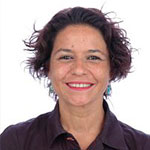 Bárbara San Juan Ferrer
Tutora de "Trabajo Fin de Máster"
End of Master's Project Tutor
Doctora en Artes por la Universidad Rey Juan Carlos. Diplomada en Magisterio de Educación Infantil, Licenciada en Pedagogía, especialidad danza, y Máster en Artes Escénicas. Línea de investigación en diversos temas relacionados con educación, inteligencia emocional, motivación, expresión corporal y las repercusiones de la danza en diversas dimensiones del ser, entre otras. Profesora universitaria desde 2014, creadora de contenidos didácticos (cursos de formación al profesorado, asignaturas universitarias). Profesora de Ed. Infantil especialidad psicomotricidad, danza y educación física infantil, predeporte. Profesora de Ed. Primaria de animación a la lectura, danza, plástica, y diferentes asignaturas. Profesora a domicilio y de hospital impartiendo docencia en edades comprendidas desde Ed. Infantil hasta Ed. Secundaria.
Bárbara San Juan Ferrer
Tutora de "Trabajo Fin de Máster"
End of Master's Project Tutor
Doctora en Artes por la Universidad Rey Juan Carlos. Diplomada en Magisterio de Educación Infantil, Licenciada en Pedagogía, especialidad danza, y Máster en Artes Escénicas. Línea de investigación en diversos temas relacionados con educación, inteligencia emocional, motivación, expresión corporal y las repercusiones de la danza en diversas dimensiones del ser, entre otras. Profesora universitaria desde 2014, creadora de contenidos didácticos (cursos de formación al profesorado, asignaturas universitarias). Profesora de Ed. Infantil especialidad psicomotricidad, danza y educación física infantil, predeporte. Profesora de Ed. Primaria de animación a la lectura, danza, plástica, y diferentes asignaturas. Profesora a domicilio y de hospital impartiendo docencia en edades comprendidas desde Ed. Infantil hasta Ed. Secundaria.
bsanjuan@nebrija.es
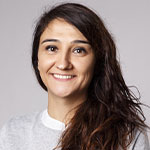 Teresa Simón Cabodevilla
Tutora de "Trabajo Fin de Máster"
End of Master's Project Tutor
Es doctora en Lingüística Aplicada a la Enseñanza de Lenguas por la Universidad Nebrija, Máster en Lingüística Aplicada a la Enseñanza del español por la misma universidad, Máster en Enseñanza de ELE por la Universidad Complutense de Madrid (UCM), Licenciada en Filología Hispánica por la Universidad de Salamanca y poseedora del Certificate in Professional Studies por la Universidad de Liverpool. Ha trabajado como lectora MAEC-AECID en la Universidad de Jordania en Ammán (2007-2010) y en la Universidad de Delhi en India (2010-2013) donde dirigió la sección de español del Diploma Foreign Language Education formando a futuros profesores de español. Ha trabajado en China en la Universidad SWUST en la provincia de Sichuan (2013-2014) y en Jiangsu en Xi’an Jiaotong Liverpool University (2014-2018). Ha colaborado como profesora de español, de literatura, escritura creativa y formadora de profesores impartiendo diferentes talleres en los Institutos Cervantes de Ammán y Nueva Delhi. Es autora del libro Destrezas orales: expresión e interacción en ELE (Editorial UNED, 2017) y de diversos materiales del Centro Virtual Cervantes para trabajar con textos literarios en el aula. Ha disfrutado de un contrato predoctoral en la Universidad Nebrija (2019-2021) para realizar su tesis sobre expresión de la emoción con alumnos sinohablantes aprendientes de español. Entre sus líneas de investigación se encuentran emoción y adquisición de LE/2L, léxico emocional, expresión e interacción orales, ELE para sinohablantes y español como lengua de migrantes y refugiados. Forma parte del grupo de investigación LAELE (Lingüística Aplicada a la Enseñanza del Español como Lengua Extranjera).
Teresa Simón Cabodevilla
Tutora de "Trabajo Fin de Máster"
End of Master's Project Tutor
Es doctora en Lingüística Aplicada a la Enseñanza de Lenguas por la Universidad Nebrija, Máster en Lingüística Aplicada a la Enseñanza del español por la misma universidad, Máster en Enseñanza de ELE por la Universidad Complutense de Madrid (UCM), Licenciada en Filología Hispánica por la Universidad de Salamanca y poseedora del Certificate in Professional Studies por la Universidad de Liverpool. Ha trabajado como lectora MAEC-AECID en la Universidad de Jordania en Ammán (2007-2010) y en la Universidad de Delhi en India (2010-2013) donde dirigió la sección de español del Diploma Foreign Language Education formando a futuros profesores de español. Ha trabajado en China en la Universidad SWUST en la provincia de Sichuan (2013-2014) y en Jiangsu en Xi’an Jiaotong Liverpool University (2014-2018). Ha colaborado como profesora de español, de literatura, escritura creativa y formadora de profesores impartiendo diferentes talleres en los Institutos Cervantes de Ammán y Nueva Delhi. Es autora del libro Destrezas orales: expresión e interacción en ELE (Editorial UNED, 2017) y de diversos materiales del Centro Virtual Cervantes para trabajar con textos literarios en el aula. Ha disfrutado de un contrato predoctoral en la Universidad Nebrija (2019-2021) para realizar su tesis sobre expresión de la emoción con alumnos sinohablantes aprendientes de español. Entre sus líneas de investigación se encuentran emoción y adquisición de LE/2L, léxico emocional, expresión e interacción orales, ELE para sinohablantes y español como lengua de migrantes y refugiados. Forma parte del grupo de investigación LAELE (Lingüística Aplicada a la Enseñanza del Español como Lengua Extranjera).
tsimon@nebrija.es
 María Teresa Sánchez Carmona
Profesora de “Didáctica de la lengua española”
Professor of "Didactics of the Spanish language"
Doctorado Internacional en Literatura hispanoamericana; Máster en Ciencias de las Religiones; Posgrado de Especialización en Enseñanza de Español Lengua Extranjera; Examinadora DELE (todos niveles).
Jefa de Estudios, Responsable de RR.Internacionales y Docente (ELE y EFE) en la Escuela ELE USAL Lisboa (Red de Escuelas- U.Salamanca); Docente Didáctica de la Lengua Española y Directora de TFM (Universidad Nebrija); Autora de libros escolares (Areal Editores); Tutora Externa Prácticas Docentes (U.Comillas); Lectora MAEC-AECID en India (Dpto. Estudios Hispánicos-EFL University).
María Teresa Sánchez Carmona
Profesora de “Didáctica de la lengua española”
Professor of "Didactics of the Spanish language"
Doctorado Internacional en Literatura hispanoamericana; Máster en Ciencias de las Religiones; Posgrado de Especialización en Enseñanza de Español Lengua Extranjera; Examinadora DELE (todos niveles).
Jefa de Estudios, Responsable de RR.Internacionales y Docente (ELE y EFE) en la Escuela ELE USAL Lisboa (Red de Escuelas- U.Salamanca); Docente Didáctica de la Lengua Española y Directora de TFM (Universidad Nebrija); Autora de libros escolares (Areal Editores); Tutora Externa Prácticas Docentes (U.Comillas); Lectora MAEC-AECID en India (Dpto. Estudios Hispánicos-EFL University).
msanchezca@nebrija.es
 Jose Javier Sanz Gil
Profesor de “Enfoque comunicativo y aprendizaje por tareas” y “Diseño de propuestas didácticas de Física y Química”
Professor of "Communicative approach and task-based learning" and "Design of didactic proposals for Physics and Chemistry"
Licenciado en Ciencias Biológicas, especialidad de Bioquímica y Biología Molecular Universidad Autónoma de Madrid. Posee el Título de Doctor en Ciencias de la Salud por la Universidad Camilo José Cela, “Sobresaliente Cum Laude”, Doctor Colaborador Honorífico de la Facultad de Económicas de la Universidad Complutense de Madrid de la Cátedra “Jean Monet ad Personan de Integración Económica Europea de Economía Aplicada” y la Certificación ANECA, Ayudante Doctor Acreditado.
También posee el Máster por el Instituto Universitario de Administración y Dirección de Empresas (ICADE) de Madrid denominado: ""Informática de Programación de Gestión”, el de “Informática de Análisis de Gestión" y el Título Universitario de “Experto Universitario en el Desarrollo del Aprendizaje y Conocimiento en entorno TIC”
Jose Javier Sanz Gil
Profesor de “Enfoque comunicativo y aprendizaje por tareas” y “Diseño de propuestas didácticas de Física y Química”
Professor of "Communicative approach and task-based learning" and "Design of didactic proposals for Physics and Chemistry"
Licenciado en Ciencias Biológicas, especialidad de Bioquímica y Biología Molecular Universidad Autónoma de Madrid. Posee el Título de Doctor en Ciencias de la Salud por la Universidad Camilo José Cela, “Sobresaliente Cum Laude”, Doctor Colaborador Honorífico de la Facultad de Económicas de la Universidad Complutense de Madrid de la Cátedra “Jean Monet ad Personan de Integración Económica Europea de Economía Aplicada” y la Certificación ANECA, Ayudante Doctor Acreditado.
También posee el Máster por el Instituto Universitario de Administración y Dirección de Empresas (ICADE) de Madrid denominado: ""Informática de Programación de Gestión”, el de “Informática de Análisis de Gestión" y el Título Universitario de “Experto Universitario en el Desarrollo del Aprendizaje y Conocimiento en entorno TIC”
jsanzgi@nebrija.es
 Uriel Seguí Buenaventura
Profesor de “Didáctica de la Educación Artística: estrategias y metodología”
Professor of "Didactics of Art Education: strategies and methodology"
Uriel es Doctor Arquitecto por la Universidad Politécnica de Madrid desde 2005.
Desde 2000 hasta 2015 fue profesor en las asignaturas de Análisis de Formas Arquitectónicas, Dibujo para el proyecto arquitectónico, Dibujo del Natural y Dibujo Avanzado en la Universidad Camilo José Cela. Ha dirigido numerosos Proyectos Fin de Carrera y ha sido miembro activo del grupo de investigación subvencionado “HYPERMEDIA” de la ETSAM. Entre 2010 y 2015 fue Director del grupo de investigación “REGENERA” (recursos estructurales para la gestión eficiente natural y estética de sistemas de conservación de biodiversidad y restauración ambiental) subvencionado por la Institución Educativa SEK. Desde el año 2008 al 2015 ha sido profesor de pintura contra representativa en el Círculo de Bellas Artes de Madrid. La universidad UCJC Publica su Tesis Doctoral: Borrar: acción espaciadora en 2008 y en paralelo él publica dos pequeños libros con Ediciones Mairea: Tanteos visuales y sonoros, y Él, retrato relato. Ha sido, en paralelo hasta 2019, profesor de las asignaturas: Expresión Gráfica 1 y 2, y es profesor de dibujo técnico en el departamento de Bellas Artes de esta universidad. Durante los últimos treinta años, de forma profesional, ha desarrollado una investigación plástica, sonora y visual que le ha llevado a exponer sus producciones artísticas en numerosas galerías españolas, y de otros países como Alemania, Italia, Turquía, Reino Unido, Israel y Estados Unidos.
Uriel Seguí Buenaventura
Profesor de “Didáctica de la Educación Artística: estrategias y metodología”
Professor of "Didactics of Art Education: strategies and methodology"
Uriel es Doctor Arquitecto por la Universidad Politécnica de Madrid desde 2005.
Desde 2000 hasta 2015 fue profesor en las asignaturas de Análisis de Formas Arquitectónicas, Dibujo para el proyecto arquitectónico, Dibujo del Natural y Dibujo Avanzado en la Universidad Camilo José Cela. Ha dirigido numerosos Proyectos Fin de Carrera y ha sido miembro activo del grupo de investigación subvencionado “HYPERMEDIA” de la ETSAM. Entre 2010 y 2015 fue Director del grupo de investigación “REGENERA” (recursos estructurales para la gestión eficiente natural y estética de sistemas de conservación de biodiversidad y restauración ambiental) subvencionado por la Institución Educativa SEK. Desde el año 2008 al 2015 ha sido profesor de pintura contra representativa en el Círculo de Bellas Artes de Madrid. La universidad UCJC Publica su Tesis Doctoral: Borrar: acción espaciadora en 2008 y en paralelo él publica dos pequeños libros con Ediciones Mairea: Tanteos visuales y sonoros, y Él, retrato relato. Ha sido, en paralelo hasta 2019, profesor de las asignaturas: Expresión Gráfica 1 y 2, y es profesor de dibujo técnico en el departamento de Bellas Artes de esta universidad. Durante los últimos treinta años, de forma profesional, ha desarrollado una investigación plástica, sonora y visual que le ha llevado a exponer sus producciones artísticas en numerosas galerías españolas, y de otros países como Alemania, Italia, Turquía, Reino Unido, Israel y Estados Unidos.
usegui@nebrija.es
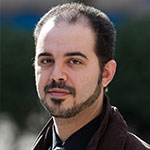 José María Suárez Díez
Tutor de "Trabajo Fin de Máster"
End of Master's Project Tutor
Doctor en Literatura española del Siglo de Oro por la Universidad Autónoma de Madrid y Licenciado en Filología Hispánica por la misma universidad. Ha desarrollado su currículo investigador mediante publicaciones de crítica literaria en revistas especializadas, centrándose en períodos literarios como el Siglo de Oro y el Romanticismo. Ha participado en numerosos congresos, tanto en el extranjero en la UNAM (Universidad Nacional Autónoma de México) como en España, en la UCM (Universidad Complutense de Madrid) o en la UVa (Universidad de Valladolid). Ha impartido seminarios para el Proyecto de Investigación I+D+i “Antropología mítica contemporánea”. Ha colaborado en diversos libros de autoría colectiva: «Mito y mundo contemporáneo. La recepción de los mitos antiguos, medievales y modernos en la literatura contemporánea», (coord.) José Manuel Losada Goya, ed. Levante, Bari; o “La corte del Barroco. Textos literarios, avisos, manuales de corte y oratoria”, (coord.) A. Rey Hazas, M. de la Campa y E. Jiménez Pablo, ed. Polifemo, Madrid; entre otros.
Fue galardonado con el I Premio de Ensayo, 2010, por la STE; y el I Premio de Poesía “Miguel Hernández”, 2003, convocado por el Colegio de Doctores y Licenciados de Madrid.
José María Suárez Díez
Tutor de "Trabajo Fin de Máster"
End of Master's Project Tutor
Doctor en Literatura española del Siglo de Oro por la Universidad Autónoma de Madrid y Licenciado en Filología Hispánica por la misma universidad. Ha desarrollado su currículo investigador mediante publicaciones de crítica literaria en revistas especializadas, centrándose en períodos literarios como el Siglo de Oro y el Romanticismo. Ha participado en numerosos congresos, tanto en el extranjero en la UNAM (Universidad Nacional Autónoma de México) como en España, en la UCM (Universidad Complutense de Madrid) o en la UVa (Universidad de Valladolid). Ha impartido seminarios para el Proyecto de Investigación I+D+i “Antropología mítica contemporánea”. Ha colaborado en diversos libros de autoría colectiva: «Mito y mundo contemporáneo. La recepción de los mitos antiguos, medievales y modernos en la literatura contemporánea», (coord.) José Manuel Losada Goya, ed. Levante, Bari; o “La corte del Barroco. Textos literarios, avisos, manuales de corte y oratoria”, (coord.) A. Rey Hazas, M. de la Campa y E. Jiménez Pablo, ed. Polifemo, Madrid; entre otros.
Fue galardonado con el I Premio de Ensayo, 2010, por la STE; y el I Premio de Poesía “Miguel Hernández”, 2003, convocado por el Colegio de Doctores y Licenciados de Madrid.
jsuarez@nebrija.es
 Francisco José Tamarit Duarte
Profesor de “Diseño de Propuestas Didácticas en Hostelería y Turismo”
Professor of "Design of Didactic Proposals in Hospitality and Tourism"
Francisco José Tamarit Duarte
Profesor de “Diseño de Propuestas Didácticas en Hostelería y Turismo”
Professor of "Design of Didactic Proposals in Hospitality and Tourism"
ftamarid@nebrija.es
 Melisa Teves Romero
Profesora de “Enseñanza y aprendizaje de Lenguas”
Professor of "Language Teaching and Learning"
Graduada en Filología Inglesa y licenciada en Traducción e Interpretación por la Universidad Ricardo Palma. Máster en Estudios Literarios y Culturales Británicos por la UAM, donde se encuentra realizando el doctorado en Estudios Artísticos, Literarios y de la Cultura. Cuenta con una amplia experiencia docente. En el ámbito de la enseñanza de idiomas, ha trabajado como profesora de inglés y español como lengua extranjera en diversas instituciones públicas y privadas en Perú, España y Bélgica. Asimismo, ha impartido clases de estudios de género y literatura tanto en inglés como en español. Cuenta con numerosas comunicaciones en congresos nacionales e internacionales. Sus campos de investigación incluyen teoría postcolonial, estudios de género y literatura inglesa del siglo XVIII. También le interesan las nuevas tecnologías aplicadas a la enseñanza de lenguas modernas, la comunicación intercultural y el aprendizaje basado en proyectos.
Melisa Teves Romero
Profesora de “Enseñanza y aprendizaje de Lenguas”
Professor of "Language Teaching and Learning"
Graduada en Filología Inglesa y licenciada en Traducción e Interpretación por la Universidad Ricardo Palma. Máster en Estudios Literarios y Culturales Británicos por la UAM, donde se encuentra realizando el doctorado en Estudios Artísticos, Literarios y de la Cultura. Cuenta con una amplia experiencia docente. En el ámbito de la enseñanza de idiomas, ha trabajado como profesora de inglés y español como lengua extranjera en diversas instituciones públicas y privadas en Perú, España y Bélgica. Asimismo, ha impartido clases de estudios de género y literatura tanto en inglés como en español. Cuenta con numerosas comunicaciones en congresos nacionales e internacionales. Sus campos de investigación incluyen teoría postcolonial, estudios de género y literatura inglesa del siglo XVIII. También le interesan las nuevas tecnologías aplicadas a la enseñanza de lenguas modernas, la comunicación intercultural y el aprendizaje basado en proyectos.
steves@nebrija.es
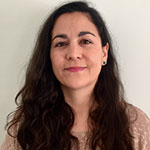 María Cruz Tornay Márquez
Tutora de "Trabajo Fin de Máster"
End of Master's Project Tutor
Doctora en Comunicación por la Universidad de Sevilla; máster en Estudios de Género y Desarrollo Profesional de la Universidad de Sevilla, y licenciada en Ciencias de Comunicación, especialidad Periodismo, por el Centro Andaluz de Estudios Empresariales (CEADE). Miembro del Grupo de Estudios e Investigaciones Educativas en Tecnologías de la Comunicación, Orientación e Intervención Sociocultural, Ágora, de la Universidad de Huelva. Revisora científica de la revista Comunicar y miembro de la Red de Investigación en Comunicación Comunitaria, Alternativa y Participativa (RICCAP). Sus líneas de investigación se enfocan en la alfabetización mediática y la comunicación para el desarrollo y el cambio social con énfasis en la perspectiva de género. Ha residido y desarrollado su labor investigadora en España, El Salvador, Venezuela, Ecuador y Ciudad de México, destacando las estancias de investigación realizadas en la Universidad Nacional Autónoma de México (UNAM) y en el Instituto de Altos Estudios Nacionales (Ecuador). Cuenta con varias publicaciones en revistas indexadas y capítulos de libros editoriales de prestigio, y ha participado en diversos congresos internacionales como ponente y panelista. Ha sido colaboradora honoraria del departamento de Publicidad y Comunicación Audiovisual de la Universidad de Sevilla y se ha desempeñado como docente en diferentes universidades de grado y postgrado.
María Cruz Tornay Márquez
Tutora de "Trabajo Fin de Máster"
End of Master's Project Tutor
Doctora en Comunicación por la Universidad de Sevilla; máster en Estudios de Género y Desarrollo Profesional de la Universidad de Sevilla, y licenciada en Ciencias de Comunicación, especialidad Periodismo, por el Centro Andaluz de Estudios Empresariales (CEADE). Miembro del Grupo de Estudios e Investigaciones Educativas en Tecnologías de la Comunicación, Orientación e Intervención Sociocultural, Ágora, de la Universidad de Huelva. Revisora científica de la revista Comunicar y miembro de la Red de Investigación en Comunicación Comunitaria, Alternativa y Participativa (RICCAP). Sus líneas de investigación se enfocan en la alfabetización mediática y la comunicación para el desarrollo y el cambio social con énfasis en la perspectiva de género. Ha residido y desarrollado su labor investigadora en España, El Salvador, Venezuela, Ecuador y Ciudad de México, destacando las estancias de investigación realizadas en la Universidad Nacional Autónoma de México (UNAM) y en el Instituto de Altos Estudios Nacionales (Ecuador). Cuenta con varias publicaciones en revistas indexadas y capítulos de libros editoriales de prestigio, y ha participado en diversos congresos internacionales como ponente y panelista. Ha sido colaboradora honoraria del departamento de Publicidad y Comunicación Audiovisual de la Universidad de Sevilla y se ha desempeñado como docente en diferentes universidades de grado y postgrado.
mtornay@nebrija.es
 Irene Torra Mohedano
Profesora de “Orientación profesional” y “Diseño de propuestas didácticas en Procesos Sanitarios”
Professor of "Professional Orientation" and "Design of didactic proposals in Health Processes"
Licenciada en Psicología por la Universidad Complutense, con doble especialidad en educación y clínica, y premio extraordinario de fin de carrera. Posee un Máster en Intervención Psicológica en Contextos Educativos y otro en Formación del Profesorado. Ha colaborado con la Unidad de Psicología Preventiva de la Universidad Complutense, participando en el programa de investigación-acción Prevenir en Madrid. Cuenta con experiencia docente en la educación pública francesa (París), donde es profesora titular de Lengua y Literatura españolas en secundaria, y ha llevado a cabo numerosos proyectos empleando nuevas tecnologías en el aula. Colabora con la Universidad de Pensilvania (Filadelfia) en sus MOOC de Poesía Americana Moderna y Contemporánea. Es profesora asociada en la Universidad Antonio de Nebrija, donde imparte docencia en el Máster TIC para la Educación y el Aprendizaje Digital, y en el Máster de Formación del Profesorado.
Irene Torra Mohedano
Profesora de “Orientación profesional” y “Diseño de propuestas didácticas en Procesos Sanitarios”
Professor of "Professional Orientation" and "Design of didactic proposals in Health Processes"
Licenciada en Psicología por la Universidad Complutense, con doble especialidad en educación y clínica, y premio extraordinario de fin de carrera. Posee un Máster en Intervención Psicológica en Contextos Educativos y otro en Formación del Profesorado. Ha colaborado con la Unidad de Psicología Preventiva de la Universidad Complutense, participando en el programa de investigación-acción Prevenir en Madrid. Cuenta con experiencia docente en la educación pública francesa (París), donde es profesora titular de Lengua y Literatura españolas en secundaria, y ha llevado a cabo numerosos proyectos empleando nuevas tecnologías en el aula. Colabora con la Universidad de Pensilvania (Filadelfia) en sus MOOC de Poesía Americana Moderna y Contemporánea. Es profesora asociada en la Universidad Antonio de Nebrija, donde imparte docencia en el Máster TIC para la Educación y el Aprendizaje Digital, y en el Máster de Formación del Profesorado.
itorra@nebrija.es
 Ana Torres del Cerro
Tutora de "Trabajo Fin de Máster"
End of Master's Project Tutor
Licenciada en Economía por la Universidad Complutense de Madrid; tras cursar un postgrado en Información Internacional por la misma universidad realizó un Máster en Economía con especialidad en Comercio Internacional en el Instituto de Estudios Políticos de París, Sciences Po, donde obtuvo la suficiencia investigadora (DEA). Es doctora en Ciencias Políticas por la Universidad Complutense de Madrid. A su trabajo como docente en las áreas de Economía y Ciencias Políticas, se le une experiencia profesional en la empresa privada.
Ana Torres del Cerro
Tutora de "Trabajo Fin de Máster"
End of Master's Project Tutor
Licenciada en Economía por la Universidad Complutense de Madrid; tras cursar un postgrado en Información Internacional por la misma universidad realizó un Máster en Economía con especialidad en Comercio Internacional en el Instituto de Estudios Políticos de París, Sciences Po, donde obtuvo la suficiencia investigadora (DEA). Es doctora en Ciencias Políticas por la Universidad Complutense de Madrid. A su trabajo como docente en las áreas de Economía y Ciencias Políticas, se le une experiencia profesional en la empresa privada.
atorrece@nebrija.es
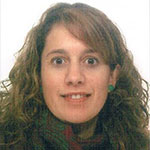 Beatriz Trigal Triguero
Profesora de “Diseño de propuestas didácticas en Procesos Sanitarios”
Professor of "Design of educational proposals in Health Processes"
Doctora en Veterinaria por la Universidad de León con mención europea. Ha realizado
estancias de investigación en centros internacionales de I+d+i, como el Institut National
de la Recherche Agronomique (INRA – Francia) y Sexing Technologies – University of
Wisconsin (Madison – EEUU). Su principal línea de investigación se basa en la mejora de las
biotecnologías aplicadas al sector primario. Profesora de ciclos formativos del ámbito sanitario, a nivel universitario acreditada por ANECA y autora de publicaciones científicas en revistas indexadas de ámbito nacional e internacional.
Beatriz Trigal Triguero
Profesora de “Diseño de propuestas didácticas en Procesos Sanitarios”
Professor of "Design of educational proposals in Health Processes"
Doctora en Veterinaria por la Universidad de León con mención europea. Ha realizado
estancias de investigación en centros internacionales de I+d+i, como el Institut National
de la Recherche Agronomique (INRA – Francia) y Sexing Technologies – University of
Wisconsin (Madison – EEUU). Su principal línea de investigación se basa en la mejora de las
biotecnologías aplicadas al sector primario. Profesora de ciclos formativos del ámbito sanitario, a nivel universitario acreditada por ANECA y autora de publicaciones científicas en revistas indexadas de ámbito nacional e internacional.
btrigal@nebrija.es
 Noelia Túnez Sáez
Profesora de “Diseño de Propuestas Didácticas de Matemáticas”
Professor of "Design of Mathematics Didactic Proposals"
Noelia Túnez Sáez
Profesora de “Diseño de Propuestas Didácticas de Matemáticas”
Professor of "Design of Mathematics Didactic Proposals"
ntunez@nebrija.es
 Rosalía Urbano Cayuela
Profesora de “Enfoque comunicativo y aprendizaje por tareas”
Professor of "Communicative approach and learning by tasks"
Doctora Internacional en Comunicación (Producción infantil transmedia multipantalla, Media Literacy). Máster en Edu-comunicación. Periodista y maestra de inglés. Profesional de la locución y el doblaje. Experiencia en medios audiovisuales como Canal 10 TV, Punto Radio y UNITV Canal de Televisión de la Universidad de Huelva; contenidos digitales y redes sociales. Destacan artículos periodísticos y científicos, colaboración en proyectos de investigación en televisión y creatividad empresarial; numeroso material audiovisual publicado.
Rosalía Urbano Cayuela
Profesora de “Enfoque comunicativo y aprendizaje por tareas”
Professor of "Communicative approach and learning by tasks"
Doctora Internacional en Comunicación (Producción infantil transmedia multipantalla, Media Literacy). Máster en Edu-comunicación. Periodista y maestra de inglés. Profesional de la locución y el doblaje. Experiencia en medios audiovisuales como Canal 10 TV, Punto Radio y UNITV Canal de Televisión de la Universidad de Huelva; contenidos digitales y redes sociales. Destacan artículos periodísticos y científicos, colaboración en proyectos de investigación en televisión y creatividad empresarial; numeroso material audiovisual publicado.
rurbano@nebrija.es
 Mireia Uranga Ruiz de Eguino
Tutora de “Trabajo Fin de Máster”
End of Master's Project Tutor
Doctoranda en el Instituto de Biología Molecular y Celular de Plantas. Graduada en Bioquímica y Biología Molecular por la Universidad del País Vasco (UPV/EHU), y posteriormente me especialicé en el área de la biotecnología vegetal tras cursar el máster en Biología y Biotecnología Vegetal por la Universtitat Autònoma de Barcelona (UAB). Mis estancias en distintos laboratorios de investigación, todos relacionados con la biotecnología vegetal, me han servido para, además de adquirir experiencia profesional en técnicas de biología molecular y celular, despertar mi curiosidad por el ámbito de las plantas.
Mireia Uranga Ruiz de Eguino
Tutora de “Trabajo Fin de Máster”
End of Master's Project Tutor
Doctoranda en el Instituto de Biología Molecular y Celular de Plantas. Graduada en Bioquímica y Biología Molecular por la Universidad del País Vasco (UPV/EHU), y posteriormente me especialicé en el área de la biotecnología vegetal tras cursar el máster en Biología y Biotecnología Vegetal por la Universtitat Autònoma de Barcelona (UAB). Mis estancias en distintos laboratorios de investigación, todos relacionados con la biotecnología vegetal, me han servido para, además de adquirir experiencia profesional en técnicas de biología molecular y celular, despertar mi curiosidad por el ámbito de las plantas.
muranga@nebrija.es
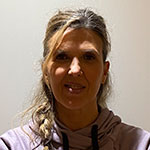 Elena Velasco Iglesias
Profesora de “Diseño de propuestas didácticas en Educación Física”
Professor of "Design of didactic proposals in Physical Education"
Dedicada a la enseñanza y el deporte durante 30 años, trabajo como profesora de Educación Física desde el año 1997 en el Colegio Estudio en Madrid caracterizado por un Proyecto Educativo único y excepcional en el ámbito de la Educación Física, tanto por el número de horas que se dedican semanalmente a la actividad física, como por el tipo de contenidos que se imparten en las clases. Desde el año 2012 soy la Coordinadora del Departamento de Educación Física del colegio formado por 17 profesores.
Gimnasta del Equipo Nacional del Gimnasia Rítmica en los años 1985 a 1988 y con el título de Entrenadora Nacional de esta modalidad, he sido directora de la Escuela de Gimnasia Rítmica del Club Deportivo Estudio desde el año 2000.
Elena Velasco Iglesias
Profesora de “Diseño de propuestas didácticas en Educación Física”
Professor of "Design of didactic proposals in Physical Education"
Dedicada a la enseñanza y el deporte durante 30 años, trabajo como profesora de Educación Física desde el año 1997 en el Colegio Estudio en Madrid caracterizado por un Proyecto Educativo único y excepcional en el ámbito de la Educación Física, tanto por el número de horas que se dedican semanalmente a la actividad física, como por el tipo de contenidos que se imparten en las clases. Desde el año 2012 soy la Coordinadora del Departamento de Educación Física del colegio formado por 17 profesores.
Gimnasta del Equipo Nacional del Gimnasia Rítmica en los años 1985 a 1988 y con el título de Entrenadora Nacional de esta modalidad, he sido directora de la Escuela de Gimnasia Rítmica del Club Deportivo Estudio desde el año 2000.
evelasco@nebrija.es
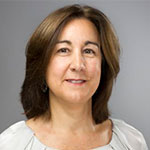 Pilar Vélez Melón
Tutora de "Trabajo Fin de Máster"
End of Master's Project Tutor
Doctora acreditada y licenciada en Ciencias Matemáticas por la Universidad Complutense de Madrid, ha desarrollado su actividad docente e investigadora en las Universidades Complutense, de Pisa (Italia) y Antonio de Nebrija. En esta última ha desempeñado los cargos de Coordinadora del Área de Matemática Aplicada, Jefe de Estudios y Directora del Departamento de Ingeniería Informática, Vicerrectora y Rectora. Participa como investigadora en un proyecto del Plan nacional de I+D+i y en una red temática de excelencia sobre Algebra computacional y aplicaciones. Sus trabajos de investigación se encuentran publicados en revistas indexadas como Journal of Symbolic Computation, Journal of Automatic Reasoning, Journal of Pure and Applied Algebra, Manuscripta Mathematica o ACM, entre otras. Así mismo, participa activamente en congresos y reuniones en los campos del Cálculo simbólico y de la Didáctica de las matemáticas. Ha presentado recientemente sus trabajos sobre razonamiento automático en geometría o sobre pensamiento algebraico en el VIII Congreso Iberoamericano de Educación Matemática, el 24th Conference on Applications of Computer Algebra o la Conference on Digital Tools in Mathematics Education. Forma parte de los comités científicos y organizador del I Jornadas Nebrija de Transversalidad en la Docencia. Mantiene líneas de colaboración con la Federación Española de Profesores de Matemáticas (FESPM) y la Real Sociedad Matemática Española (RSME)."
Pilar Vélez Melón
Tutora de "Trabajo Fin de Máster"
End of Master's Project Tutor
Doctora acreditada y licenciada en Ciencias Matemáticas por la Universidad Complutense de Madrid, ha desarrollado su actividad docente e investigadora en las Universidades Complutense, de Pisa (Italia) y Antonio de Nebrija. En esta última ha desempeñado los cargos de Coordinadora del Área de Matemática Aplicada, Jefe de Estudios y Directora del Departamento de Ingeniería Informática, Vicerrectora y Rectora. Participa como investigadora en un proyecto del Plan nacional de I+D+i y en una red temática de excelencia sobre Algebra computacional y aplicaciones. Sus trabajos de investigación se encuentran publicados en revistas indexadas como Journal of Symbolic Computation, Journal of Automatic Reasoning, Journal of Pure and Applied Algebra, Manuscripta Mathematica o ACM, entre otras. Así mismo, participa activamente en congresos y reuniones en los campos del Cálculo simbólico y de la Didáctica de las matemáticas. Ha presentado recientemente sus trabajos sobre razonamiento automático en geometría o sobre pensamiento algebraico en el VIII Congreso Iberoamericano de Educación Matemática, el 24th Conference on Applications of Computer Algebra o la Conference on Digital Tools in Mathematics Education. Forma parte de los comités científicos y organizador del I Jornadas Nebrija de Transversalidad en la Docencia. Mantiene líneas de colaboración con la Federación Española de Profesores de Matemáticas (FESPM) y la Real Sociedad Matemática Española (RSME)."
pvelez@nebrija.es
 Carlos Matías Vicente Pérez
Profesor de “Tecnología y procesos industriales II”
Professor of "Technology and Industrial Processes II"
Graduado en Ingeniería Mecánica, Ingeniero Técnico Industrial, Máster en Formación del Profesorado de Educación Secundaria y Máster de Prevención de Riesgos Laborales. Nivel acreditado B2 de Inglés.
Desde febrero 2020, Profesor Asociado de la Universidad Nebrija.
Desde febrero 2018, Profesor de Formación Profesional de fabricación mecánica para la Consejería de Educación de la Junta de Extremadura.
Anteriormente, de julio 2010 a febrero 2018, Jefe de Operación de la central eléctrica de biomasa de Acciona Energía en Cáceres. Anteriormente, Ingeniero de Proyecto en Ingeteam Energy en proyectos de EPC de centrales eléctricas en Vitoria. Previamente, trabajé como Gestor Técnico en Ferrovial Servicios en el Hospital Universitario de Badajoz. Empecé mi andadura como Ingeniero de mantenimiento y Técnico de Prevención de Riesgos Laborales en la fábrica de alimentación de Findus en Badajoz.
Carlos Matías Vicente Pérez
Profesor de “Tecnología y procesos industriales II”
Professor of "Technology and Industrial Processes II"
Graduado en Ingeniería Mecánica, Ingeniero Técnico Industrial, Máster en Formación del Profesorado de Educación Secundaria y Máster de Prevención de Riesgos Laborales. Nivel acreditado B2 de Inglés.
Desde febrero 2020, Profesor Asociado de la Universidad Nebrija.
Desde febrero 2018, Profesor de Formación Profesional de fabricación mecánica para la Consejería de Educación de la Junta de Extremadura.
Anteriormente, de julio 2010 a febrero 2018, Jefe de Operación de la central eléctrica de biomasa de Acciona Energía en Cáceres. Anteriormente, Ingeniero de Proyecto en Ingeteam Energy en proyectos de EPC de centrales eléctricas en Vitoria. Previamente, trabajé como Gestor Técnico en Ferrovial Servicios en el Hospital Universitario de Badajoz. Empecé mi andadura como Ingeniero de mantenimiento y Técnico de Prevención de Riesgos Laborales en la fábrica de alimentación de Findus en Badajoz.
cvicente@nebrija.es
 Patricia Vizuete Escobar
Profesora de “Psicología y educación del adolescente”
Professor of "Adolescent Psychology and Education"
Patricia Vizuete Escobar es graduada en Psicología por la Universidad de Sevilla. Máster en Gestión de Recursos Humanos por Business School Cajasol. Máster en Universitario en Prevención de Riesgos Laborales (especialidades en Seguridad, Higiene e Ergonomía y Psicosociología Aplicada). Universidad Nebrija. Ha colaborado en diversas investigaciones por la Universidad de Sevilla en los Departamentos de Teoría de la Educación, Psicobiología y Psicología del Deporte. Ha realizado diversos proyectos vinculados al ámbito empresarial con Deloitte, CEU San Pablo, Senior Staff Consultores, Prosegur, etc.
Patricia Vizuete Escobar
Profesora de “Psicología y educación del adolescente”
Professor of "Adolescent Psychology and Education"
Patricia Vizuete Escobar es graduada en Psicología por la Universidad de Sevilla. Máster en Gestión de Recursos Humanos por Business School Cajasol. Máster en Universitario en Prevención de Riesgos Laborales (especialidades en Seguridad, Higiene e Ergonomía y Psicosociología Aplicada). Universidad Nebrija. Ha colaborado en diversas investigaciones por la Universidad de Sevilla en los Departamentos de Teoría de la Educación, Psicobiología y Psicología del Deporte. Ha realizado diversos proyectos vinculados al ámbito empresarial con Deloitte, CEU San Pablo, Senior Staff Consultores, Prosegur, etc.
pvizuete@nebrija.es
More Academic Information
Competences
Through the training program, students can acquire a set of basic, general and specific skills.
Basic competences- BC1 Acquire advanced and proven knowledge, in a context of scientific and technological or highly specialized research, a detailed and grounded understanding of the theoretical and practical aspects and of the work methodology in one or more fields of study;
- BC2 Know how to apply and integrate their knowledge, their understanding, their scientific foundation and their problem-solving abilities in new and imprecisely defined environments, including multidisciplinary research and highly specialized professional contexts;
- BC3 Know how to evaluate and select the appropriate scientific theory and precise methodology of their fields of study to make judgments based on incomplete or limited information, including, when necessary and relevant, a reflection on social or ethical responsibility linked to the solution that is proposed in each case;
- BC4 Be able to predict and control the evolution of complex situations by developing new and innovative work methodologies adapted to the specific scientific/research, technological or professional, generally multidisciplinary, field in which their activity is carried out;
- BC5 Know how to transmit in a clear and unambiguous way to a specialized or non-specialized audience the results from scientific and technological research or the field of the most advanced innovation, as well as the most relevant foundations on which they are based;
- BC6 Develop sufficient autonomy to participate in research projects and scientific or technological collaborations within their thematic scope, in interdisciplinary contexts and, where appropriate, with a high knowledge transfer component;
- BC7 Be able to take responsibility for their own professional development and their specialization in one or more fields of study.
- GC1 Know the curricular contents of the subjects related to the corresponding teaching specialization, as well as the body of didactic knowledge about the respective teaching and learning processes. For vocational training, knowledge of the respective professions will be included.
- GC2 Plan, develop and evaluate the teaching and learning process by promoting educational processes that facilitate the acquisition of the competences in the respective teachings, attending to the students' level and previous training, as well as their orientation, both individually and in collaboration with other teachers and professionals of the center.
- GC3 Search, obtain, process and communicate information (oral, print, audiovisual, digital or multimedia), transform it into knowledge and apply it in the teaching and learning processes in the subjects of the specialization studied.
- GC4 Specify the curriculum to be implemented in a teaching center participating in its collective planning; develop and apply didactic methodologies, both for groups and individuals, adapted to the diversity of students.
- GC5 Design and develop learning spaces with special attention to equality, emotional education and values, equal rights and opportunities between men and women, civic education and respect for human rights that facilitate life in society, decision making and building a sustainable future.
- GC6 Acquire strategies to stimulate student effort and promote their ability to learn for themselves and with others, and develop thinking and decision skills that facilitate personal autonomy, trust and initiative.
- GC7 Know the processes of interaction and communication in the classroom, master the social skills and abilities necessary to promote learning and coexistence in the classroom, and address discipline problems and conflict resolution.
- GC8 Design and carry out formal and non-formal activities that contribute to making the center a place of participation and culture in the environment where it is located; develop the functions of tutoring and guidance of students in a collaborative and coordinated manner; Participate in the evaluation, research and innovation of teaching and learning processes.
- GC9 Know the regulations and institutional organization of the education system and models of quality improvement with application to schools.
- GC10 Know and analyze the historical characteristics of the teaching profession, its current situation, perspectives and interrelation with the social reality of each era.
- GC11 Inform and advise families about the teaching and learning process and about the personal, academic and professional orientation of their children.
- GC12. Encourage critical, reflective and enterprising spirit.
- GC13. Promote and guarantee respect for Human Rights and the principles of universal accessibility, equality, non-discrimination and democratic values and the culture of peace.
GENERIC MODULE
Subject: LEARNING AND PERSONALITY DEVELOPMENT
- GC1 Know the curricular contents of the subjects related to the corresponding teaching specialization, as well as the body of didactic knowledge about the respective teaching and learning processes. For vocational training, knowledge of the respective professions will be included.
- GC2 Plan, develop and evaluate the teaching and learning process by promoting educational processes that facilitate the acquisition of the competences in the respective teachings, attending to the students' level and previous training, as well as their orientation, both individually and in collaboration with other teachers and professionals of the center.
- GC3 Search, obtain, process and communicate information (oral, print, audiovisual, digital or multimedia), transform it into knowledge and apply it in the teaching and learning processes in the subjects of the specialization studied.
- GC4 Specify the curriculum to be implemented in a teaching center participating in its collective planning; develop and apply didactic methodologies, both for groups and individuals, adapted to the diversity of students.
- GC5 Design and develop learning spaces with special attention to equality, emotional education and values, equal rights and opportunities between men and women, civic education and respect for human rights that facilitate life in society, decision making and building a sustainable future.
- GC6 Acquire strategies to stimulate student effort and promote their ability to learn for themselves and with others, and develop thinking and decision skills that facilitate personal autonomy, trust and initiative.
- GC7 Know the processes of interaction and communication in the classroom, master the social skills and abilities necessary to promote learning and coexistence in the classroom, and address discipline problems and conflict resolution.
- GC8 Design and carry out formal and non-formal activities that contribute to making the center a place of participation and culture in the environment where it is located; develop the functions of tutoring and guidance of students in a collaborative and coordinated manner; Participate in the evaluation, research and innovation of teaching and learning processes.
- GC9 Know the regulations and institutional organization of the education system and models of quality improvement with application to schools.
- GC10 Know and analyze the historical characteristics of the teaching profession, its current situation, perspectives and interrelation with the social reality of each era.
- GC11 Inform and advise families about the teaching and learning process and about the personal, academic and professional orientation of their children.
- GC12. Encourage critical, reflective and enterprising spirit.
- GC13. Promote and guarantee respect for Human Rights and the principles of universal accessibility, equality, non-discrimination and democratic values and the culture of peace.
Subject: EDUCATIONAL PROCESSES AND CONTEXTS
- SC13 Know how the educational system in our country has evolved throughout its history.
- SC14 Know the way of interaction and communication existing in the classroom and center, and face and solve possible problems.
- SC15 Know and apply resources and strategies for information, tutoring and academic and professional guidance.
- SC16 Promote different ways of educating emotionally on civic values.
- SC17 Collaborate in the definition of the educational plan and in the activities of the center, taking into account criteria to improve quality, attend to diversity and prevent possible difficulties in learning and coexistence.
- SC18 Contextualize the educational practice and teaching profession in society, culture, history, regulations, organization and in the classroom, analyzing the way in which they influence and are influenced by the educational processes that take place in them.
- SC19 Analyze the relationships between different educational contexts of students and design guidance and intervention strategies aimed at promoting their articulation and complementarity.
- SC20 Know the spaces of pedagogical and curricular autonomy, and management and organization of educational centers to participate in them through measures and actions aimed at defining and carrying out an educational plan that fits the environment and culture of the center and commits to its progress.
- SC21 Know and analyze the characteristics of the centers and classrooms when proposing actions for the management of coexistence that facilitate learning, emotional development and the acquisition of civic values.
- SC22 Learn the skills and attitudes necessary for the performance of tutoring by teachers in Secondary Education.
- SC23 Propose, organize and carry out tutoring sessions according to the different tasks assigned to teachers in their role as tutors, collaborating with the Orientation Departments.
- SC24 Train in the skills and attitudes necessary for the use and exploitation of ICTs in carrying out teaching activities.
- SC25 Know the evolution of the different systems of guidance and educational psychology counseling.
- SC26 Analyze the characteristics, organization and operation of educational centers and assess the functionality of the processes and bodies of management, participation and pedagogical and didactic coordination.
- SC27 Know how to design the different planning documents of the Center and participate in the definition of the educational project, in the curricular development processes and in the general activities of the center, taking into account criteria for improving the quality of education, attention to diversity, prevention of learning and coexistence problems, and promotion of educational success.
Subject: SOCIETY, FAMILY AND EDUCATION
- SC28 Relate education to the environment and understand the educational role of the family and the community, both in the acquisition of skills and learning and in education, in respect for rights and freedoms, in equal rights and opportunities between men and women and in equal treatment and non-discrimination of persons with disabilities, or in any other personal or social circumstance that may pose a risk to their social and school inclusion.
- SC29.Know the historical evolution of the family, its different types and the impact of the family context on education in general, and on school performance in particular.
- SC30 Promote social skills that favor family relationships and orientation.
- SC31 Know and understand the influences of the sociocultural environment of the center in the education of students.
- SC32 Assess the educational power of the school in continuous relationship and interaction with other educational contexts of adolescents.
- SC33 Collaborate with the Management Team in the adoption of measures for the coordination of the school with families, and design strategies aimed at promoting their effective participation and collaboration in educational processes.
SPECIFIC MODULE
- SC34 Know the theoretical and practical developments of teaching and learning of the corresponding subjects.
- SC35 Transform curricula into activity and work programs.
- SC36 Acquire selection criteria and elaboration of educational materials.
- SC37 Promote a climate that facilitates learning and values student contributions.
- SC38 Integrate education in audiovisual and multimedia communication in the teaching-learning process.
- SC39 Know evaluation strategies and techniques, and understand evaluation as an instrument of effort regulation and stimulation.
- SC40 Critically analyze the conceptual and ideological approaches of socio-educational inclusion and exclusion.
- SC41 Identify the barriers and facilitators of an inclusive education both in the school and in the other contexts that influence student development and education.
- SC42 Design and implement, in collaboration with the school community, measures of attention to diversity that guarantee the presence, participation and learning of all students.
- SC43 Conduct psycho-pedagogical evaluations and, where appropriate, prepare diagnostic reports and schooling opinions for students with specific support needs. Identify the specific educational support needs associated with disability, developmental disorders, learning difficulties, high ability and sociocultural factors.
- SC44 Design and implement, using the resources of the orientation system, support interventions for all students who require it within the framework of the Diversity Attention Plan.
- SC45 Identify and plan the resolution of educational situations that affect students with different abilities and different learning speeds
- SC46 Know the educational and cultural value of the subjects corresponding to the specialization and the contents that are taught in the respective teachings.
- SC47 Know the way in which recent subjects have been developed and their perspectives in order to convey a dynamic vision of them.
- SC48 Know the contexts and situations in which the various curricular contents are applied.
- SC49 In vocational training, learn about the evolution of the working world, the interaction between society, work and quality of life, as well as the need to acquire adequate training to adapt to changes and transformations that professions may require.
- SC50 Know and analyze the characteristics, organization and operation of educational guidance services and psycho-pedagogical advice that operate at different levels of the education system (Early Childhood, Primary, Compulsory Secondary, VT and Baccalaureate).
- SC51 Identify demands, set objectives and participate in the design of intervention plans in accordance with the results of the institutional analysis of educational centers and related systems.
- SC52 Take part in the establishment of collaborative work structures with teachers and other members of the school community, as well as with other professionals involved in educational centers.
- SC53 Coordinate actions in the area or sector with all educational agents and other services, with special attention to social, health and labor services for a coordinated intervention.
- SC54 Know and evaluate the techniques of psychopedagogical diagnosis.
- SC55 Evaluate the interventions carried out and derive changes to improve them.
- SC56 Know how to apply preventive programs of a socio-community scope.
- SC57 Know and use some basic digital tools due to their usefulness in the orientation and mentoring tasks and in the development of the counselor's functions.
- SC58 Know the processes of curriculum development and the elaboration of institutional plans to participate with the management teams and the coordinating bodies in their design and application.
- SC59 Coordinate the preparation of the Tutorial Action Plan at the different levels of the education system (Early Childhood, Primary, Secondary, VT and Baccalaureate) and, where appropriate, the Academic and Professional Orientation Plan.
- SC60 Advise and collaborate with the teaching staff in the review and improvement of the teaching and learning and evaluation processes, and put them into practice in case of teaching some curriculum subject.
- SC61 Advise and collaborate with teachers and, especially, with tutors, in accompanying students in their development, learning and decision-making processes.
- SC62 Guide students in their personal knowledge, in the progressive definition and adjustment of a life project, and in the adoption of academic and professional decisions, so that all this facilitates their labor insertion.
- SC63 Know, select, design and apply strategies and information and career guidance plans for the transition to the labor market and employability.
- SC64 Apply mediation techniques for conflict management in order to improve the climate of coexistence in the Centers.
- SC65 Know and apply innovative teaching proposals in the specialties of each sector.
- SC66 Identify the difficulties related to teaching and learning of the subjects and suggest other alternatives and solutions.
- SC67 Analyze teaching, good practices and orientation critically, using quality indicators.
- SC68 Know and apply basic methodologies and techniques of educational research and evaluation and be able to design and develop research, innovation and evaluation projects.
- SC69 Identify and formulate relevant problems arising in educational centers that lead to research and improvement activities.
- SC70 Participate and collaborate in research and innovation projects oriented to the analysis and improvement of educational practices.
- SC71 Support the teamwork among teachers through collaborative work strategies and techniques and analysis of teaching practice to enhance the teamwork of teachers, especially based on ICTs.
- SC72 Support the continuous training of teachers by providing conceptual and methodological tools for collective and critical reflection on teaching practice. Promote and participate in the design of teacher training plans.
- SC73 Advise on quality assessment processes and the development of improvement plans.
- SC74 Know relevant and current research and innovations in the field of orientation and identify appropriate forums to disseminate their results
PRACTICUM MODULE
- SC75 Develop the planning, teaching and evaluation of the subjects that correspond to the specialization.
- SC76 Master the social skills necessary to promote an environment that facilitates learning and coexistence.
- SC77 Carry out different proposals to improve the different fields of action from reflection based on practice.
- SC78 Know the business typology corresponding to the productive sectors and understand the most common organizational systems in companies (Vocational Training).
- SC79 Train in psychopedagogical evaluation, counseling to other education professionals and guidance to students and families.
- SC80 Assess the role of the organization procedures of each center and know the functions of its different components.
- SC81 Contrast the personal point of view with that of the rest of the professionals about teaching in their center to make joint decisions.
- SC82 Plan the teaching process in your specific area, designing teaching materials and educational tasks.
- SC83. Promote effective interaction and communication in the classroom, guaranteeing a good command of oral and written expression.
- SC84 Analyze the results of the evaluation and draw conclusions that help improve the teaching and learning processes.
- SC85 Acquire experience in the exercise of educational orientation and psycho-pedagogical counseling proving a good command of oral and written expression and the professional skills necessary for this exercise.
- SC86 Analyze the school reality in which the internships are carried out using the theoretical frameworks studied in the Master's degree.
- SC87 Plan, develop and evaluate an intervention plan in the field of educational orientation and psycho-pedagogical counseling.
- SC88 Identify possible areas for improvement of the intervention carried out by arguing the theoretical foundations of the proposal and how it would be evaluated.
- SC89 Review their own experience and previous knowledge from the point of view of the skills acquired or developed during the practicum.
- SC90 Reflect these competences, together with those acquired and developed in the rest of the subjects, in the Master's Final Research Project, which summarizes the acquired training.
Blended Study
The Master's degree is carried out in a blended modality through a varied set of training activities that will facilitate the acquisition of the various competences, general and specific objectives of each course and subject. The methodology, of an interactive type, requires the active participation of students and professors in a continuous and systematic way.
Training activities include: synchronous video lectures, individual and group learning activities, evaluation activities (in-person exams), complementary training activities (in-person workshops), tutorial sessions, internship activities (internship at the school) and preparation, presentation and defense of a Master's Final Research Project.
Calendar and Schedules
Schedules Groups A, E, H, I, M
Schedules Groups B, F, J, L, N
Schedules Groups C, D, G, K, O, P
Admission
Access requirements
The access paths and requirements for the Master's and Doctorate level teaching are those established by Royal Decree 1393/2007 of October 29, with subsequent modification in Royal Decree 861/2010, of July 2, which establishes the ordinance of official university teachings. In addition, at Nebrija University it is necessary to pass the Admission Tests specific to each degree, whose content and procedure will be described under the heading "Admission Criteria".
Under current legislation, students who meet any of the following conditions may access the Master's degree studies:
- Have an official Spanish university degree or another issued by an institution of higher education of the European Higher Education Area that authorizes access to Master's degree education in the issuing country.
- Graduates in accordance with educational systems outside the European Higher Education Area may access without the homologation of their degrees, after verification by the University that they accredit a level of training equivalent to the corresponding official Spanish university degrees and that they grant access to postgraduate education in the country issuing the degree. Access through this route will not imply, in any case, the homologation of the interested party's previous degree, nor its recognition for other purposes than that of studying the Master's degree studies.
- In the case of students with special educational needs derived from disability, the need for possible curricular adaptations, itineraries or alternative studies will be assessed.
Therefore the access criteria are those indicated in the previous section and set forth in ORDER ECI/3858/2007, of December 27, in its section 4.2.-Conditions of access to the Master's degree which indicates that: “For admission to the Master's degree, accrediting having mastered the competences related to the specialization that you wish to study is established as an access requirement, by means of taking a test designed for this purpose by the Universities, from which those who have university degrees that correspond to the chosen specialization will be exempt”.
In addition to meeting the legally established access requirements indicated above, the Admissions Commission will accept or not accept the admission of a student taking into account the following criteria:
- Academic record. Candidates will be weighted directly in this section from 1 to 10, depending on the average grade of their academic record.
- Satisfactory results in the specific skills admission tests for this master's degree. The candidate will need to show an access profile reasonably consistent with that recommended for this master's degree.
- Degree of motivation and attitude of the candidate.
- Professional experience in the field of education.
- Since it is a blended program, the real possibility of properly carrying out the planned training activities will be assessed, as some of which will be in-person (exams, workshops and internships). All this will be assessed during the personal interview with the candidate.
If the number of students exceeds the maximum limit, the Admissions Commission will decide based on the following weighting:
- Academic record (30%)
- Previous education (10%)
- English level (30%)
- Specific training courses taken (10%)
- Previous experience in the field of secondary education, baccalaureate, Vocational Training and Language Teaching (20%)
In order to carry out the weighting, each of the above criteria will be assessed from 1 to 10 before calculating the weighted sum.
Finally, if applicable, the Admissions Commission will approve the admission to the Master's Program of the candidate and/or the detailed proposal of competence complements and the corresponding training actions and credit load that the candidate must take.
The admission process consists of 3 phases:
1. Submit documentation
In general, the admission documentation will be presented to the Admissions Department. The student must provide the originals or certified copies of the submitted documentation within the period established by the University in order to formalize his enrollment. Any inaccuracy, falsity or omission of the data, statement or document provided by the student in the period of admission, will determine the impossibility of continuing to exercise the right from the moment the University has proof of these events, proceeding to the cancellation of the application for admission submitted and the place awarded, without prejudice to any criminal, civil or administrative responsibilities that may arise.
The documentation that the candidate must provide is as follows:
- Completed Admission Application.
- Photocopy of DNI (Spanish candidates) or passport (foreign candidates).
- Two passport-sized and color photographs.
- Certified photocopy of the official Diploma for Associate's, Bachelor's or Undergraduate Degree. For foreign candidates, said certified photocopy, with the corresponding official translation, where appropriate, must be legalized through diplomatic channels or, where appropriate, by means of the Apostille of the Hague Convention, except in the case of documents issued by the authorities of the Member States of the European Union or signatories of the agreement on the European Economic Area. In addition, they must prove that the degree provided authorizes them to access postgraduate studies in the issuing country.
- Certified photocopy of the academic record. For foreign candidates, said certified photocopy, with the corresponding official translation, where appropriate, must be legalized through diplomatic channels or, if applicable, by the Hague Apostille, unless they are documents issued by the authorities of the member states of the European Union or signatories of the agreement on the European Economic Area.
- Personalized letter of intent addressed to the Director of the Master's Degree in Teacher Training for Compulsory Secondary Education and Baccalaureate, Vocational Training and Language Teaching explaining the reasons why you want to take the Master's studies, as well as your academic and professional expectations that led you to this choice.
- Updated curriculum vitae
- Two letters of recommendation
In addition, they will have to comply with the requirements indicated in detail in the “Master_PO12 access and admission procedure” of the Teaching Plan that the University has implemented.
2. Take an Admission Test
The test that candidates must take for admission to the Master's program will be specific according to the specialization they wish to study, and is intended for students to accredit the mastery of the competences related to it, as established by Order ECI/3858/2007, section 4.2. Those who have any of the university degrees that correspond to the chosen specialization will be exempt from taking said test. The candidate may consult the Admissions Advisor if he or she is exempt from taking said test.
This test consists of the following sections:
- A personal information questionnaire
- A question regarding the candidate's expectations regarding the Master's degree, in order for him to show his ability to express himself about the field of study.
- An English language level test to place the student on a mastery level scale for this language, in order to ensure that, at the end of the Master's degree, the student can at least certify the B1 level required in the regulations. The ORDER ECI/3858/2007, of December 27, (BOE December 29, 2007) indicates in its section 4.2 on conditions of access to Master's Degree in Teacher Training for Compulsory Secondary Education and Baccalaureate, Vocational Training and Language Teaching and Artistic Education that the student must accredit the knowledge of a foreign language at a B1 level of the CEFR. Students who apply for admission to the Foreign Language specialty: English must demonstrate a level of knowledge of English equivalent to B2 according to the CEFR. Those who provide an official certificate attesting the required level of said language will be exempted from taking said English language level test.
These tests will be taken in person in Madrid or in the provinces during the presentation sessions of the academic offer made by Nebrija's Promotion and Admissions Department (P&A). Exceptionally, the tests may be conducted virtually through the computer tools available to the university and that ensure the identity of the applicant.
3. Presentation of the candidacy to the Admissions Commission of the Master's program
All documents submitted by the student, together with the results of the Admission Tests, are assessed by the Admissions Commission of the Master's program. The Commission evaluates if the documents are administratively correct and if the candidate's profile fits the recommended profile for the master's degree.
In the event that the decision of the Admissions Commission is favorable, the student must formalize his/her enrollment by paying the registration fees and completing the self-enrollment (after being sent his/her username and password to perform this online process).
Access to the teaching exercise will be determined by the candidate's degree of origin (Degree / Bachelor / Diploma) and this will be regulated by the Ministry of Education of the Autonomous Community.
Employability
Career Opportunities
The Master's Degree in Teacher Training for Compulsory Secondary Education and Baccalaureate, Vocational Training and Language Teaching enables the future teacher to carry out their work through the acquisition of the knowledge and skills necessary to practice as a teacher in compulsory secondary education and baccalaureate, vocational training and language teaching.
Internships
Since the 2009-2010 academic year, the Master's Degree in Teacher Training for Compulsory Secondary Education and Baccalaureate, Vocational Training and Language Teaching, qualifies one to practice as a teacher at these educational levels, thus becoming an essential requirement to be able to teach in said educational levels.
The objective of this Master's degree is to provide tools and develop skills of the teaching profession for professionals who, due to the nature of their profession, require them to properly carry out the teaching profession.
At our University, we are committed to professionals prepared to face the educational challenge of the new generations. To make it effective, we provide our students with reliable education, based on pedagogical innovation, academic excellence and the experience of a team of professionals with a true teaching vocation.
The Master's degree professional internships are an essential basis in the training of future teachers and are intended to contribute to the acquisition of a consistent professional qualification of theory and practice. They are carried out in the educational centers of the Community of Madrid that offer the stages of Compulsory Secondary Education, Baccalaureate, Vocational Training, and/or Language Teaching. These educational centers are recognized as such through agreements between the Educational Administrations and the University.
In addition to the internship period, students attend tutorial sessions and group and individual supervision sessions at the University that contribute to a coherent student relationship between the University and the Educational Center.
List of Centers with internship agreements Procedure of action in the realization of External Internships Management process for external internships and Professional Guidance
More information on Internships in CompaniesTestimonials
University Life in Teacher Training for ESO and Baccalaureate, FP and Language Teaching
Visit all the Activities of the School of Language and Education

How social networks influence adolescents
Article published by Mónica Moreno, a professor at Nebrija University, on the influence of social networks on students and their direct influence on the learning process
See article
Emotional education in the classroom
Study carried out by the Institute of Emotional Intelligence and Applied Neuroscience on the use of emotional education in Spanish classrooms and its importance.
Ver noticiaLet’s Talk About Education
First chapter of the video podcast specialized in Education where the research processes and their application in neuroscience and the educational sector are analyzed.




